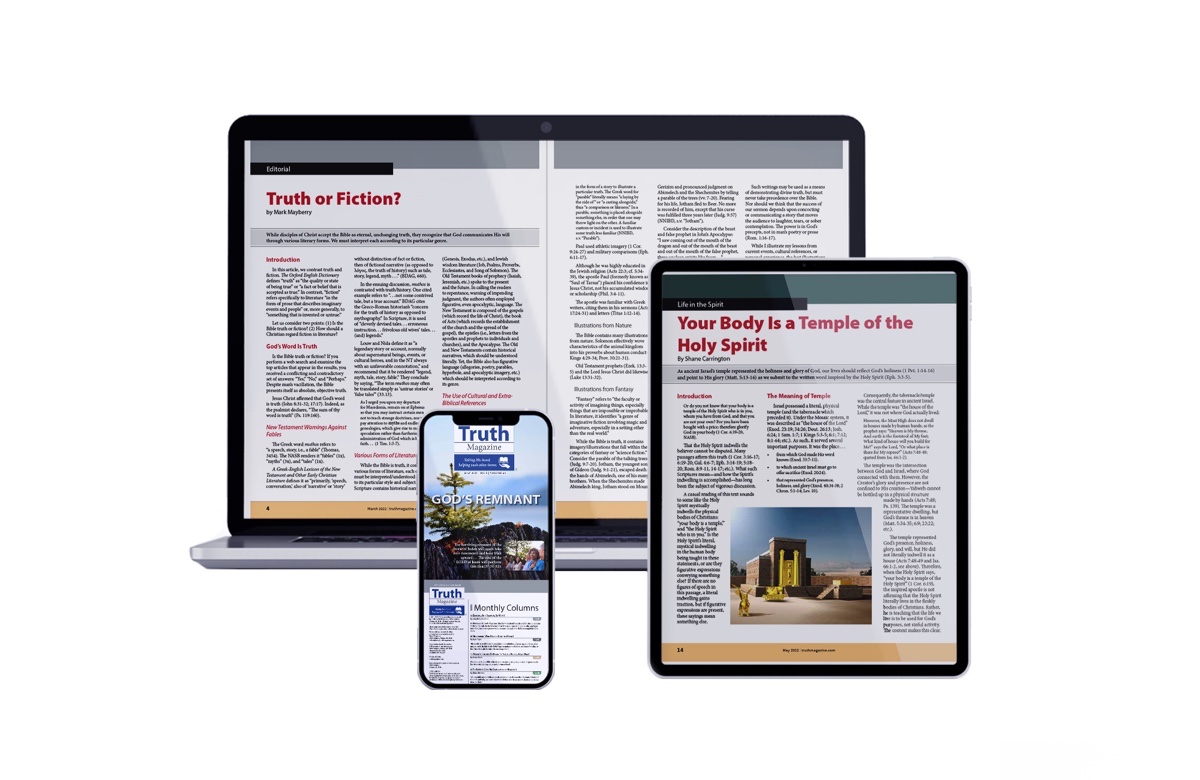
(November, 2024 | No. 11 | Vol. 68)
11/1/2024

Truth Magazine (ISSN 1538-0793) is published once a month by Truth Publications, Inc., 220 S. Marion, Athens, AL 35611.
© 2024 Truth Publications, Inc. All Rights Reserved.
Manuscripts should be sent to the editor, Mark Mayberry, at mark@truthpublications.com. Link.
Subscriptions, renewals & other correspondence should be sent to: Truth Magazine, 220 S. Marion, Athens, AL 35611 or by emailing us at subscriptions@truthmagazine.com. Link.
Book orders should be sent to: CEI Bookstore | truthbooks.com | Street Address: 220 S. Marion, Athens, AL 35611 | Phone: (855) 492-6657 | Email: sales@truthbooks.com Link.
Online Website: truthmagazine.com
DISCLAIMER: Books in ads are screened, but an ad does not mean unqualified endorsement. All books should be tested by Scripture. We appreciate readers notifying us if they find some glaring fault in the ads.
By Dr. T. W. Brents; Edited by Mark Mayberry
Synopsis: This article on Justification is adapted from T.W. Brents’s Gospel Sermons, which was first published in 1891 by Gospel Advocate Publishing Company in Nashville, TN. The original edition copy of this volume that I possess is personally treasured because it is signed by my great-grandfather, L.T. Hutcheson, and my grandfather, J.C. Hutcheson, both of whom were faithful gospel preachers.
Interestingly, the issues Brother Brents discussed, especially regarding justification, are the same issues affecting brethren today. The pendulum swing between the Roman Catholic works-based view of salvation and Luther’s overreaction in affirming a grace-only/faith-only approach continues to affect the broader religious world and members of the Lord’s church.
This author addresses the subject with clarity and conviction. Despite the passage of over 130 years, his assertion of the biblical system of justification and repudiation of denominational distortions remain powerful and persuasive.
It is beneficial to read the writings of faithful brethren from past generations who were not tainted by the false assumptions of a Calvinistic worldview or denominational notions, such as unity in diversity or the gospel-doctrine distinction. Sound preachers of yesteryear accepted the principle of speaking where the Bible speaks and being silent where the Bible is silent, of calling Bible things by Bible names, and doing Bible things in Bible ways.
Truth does not change. A proper application of biblical truth will lead us to the same conclusions as brethren did in the past. They recognized that God communicates with mankind through direct statements, examples, and necessary inferences. The church set forth in the first century can be replicated in any age if we open the Bible, rightly divide the word of truth, and properly apply Its message to our lives.
So, the following article is offered for your spiritual edification. After scanning the original article, I cleaned up the imported text, updated the Scripture quotations from the King James Version to the New American Standard Bible, and smoothed out the wording to make it more accessible to modern readers while maintaining the original thoughts. I hope you find it beneficial.
To justify means to declare someone innocent or blameless. In this sense, the term justification may apply to those accused of a crime of which they have never been guilty, but it also means to acquit, to absolve from guilt where guilt has really and justly been incurred—to declare innocent after an actual violation of the law—to declare blameless where blame is justly attached. In this sense, it is applied in the justification of sinners, and in this sense, we propose to employ it in this study. As all men sin and come short of the glory of God, we want to find a system of justification, if there is one, by which the guilty may become innocent in God’s sight. In this sense, justification must include the idea of pardon of sin—remission of sin—salvation from sin—blotting out of sin, so that the individual may stand before God as though he had never sinned—as a newborn babe, beginning a new life in the family of God—in the kingdom of God’s dear Son. Surely, the subject of justification is of utmost importance. Let us, therefore, open the Divine Volume and examine it with the care and attention it deserves.
On this, as on most other subjects connected with man’s salvation, there are different and conflicting theories, each having its advocates claiming support from the word of God. Before Luther’s day, the theory of Roman Catholicism was all works—doing penance; and he, naturally, vibrated to the other extreme, rejecting all works, and adopting a theory of all faith, or justification by faith only. Out of these two have grown other theories. One that justification grows out of “God’s free grace and love without any foresight of faith, good works, or any other thing in the creature as causes or conditions moving Him thereto” [Note 1]. Closely akin to this is another theory that justification grows out of an eternal covenant made between God and His Son, in which the salvation of the elect was unconditionally secured by Christ, who in due time gave His life for them, and none others were at all interested in or benefited by His death, as God never loved them or made any provision for them.
It is not our purpose to enter upon an examination of these theories, or still others which we might mention; sufficient it is to say that they cannot all be true; and we think it will abundantly appear, in this investigation, that they are all wrong. If we closely examine the word of God, we will find several items in the system of justification that is revealed in the gospel, each one filling an important place; and hence, it cannot be true that man is justified by any one thing alone. To find these several items, and the God-appointed place and office of each, is the object of this investigation.
We suppose it is scarcely necessary to offer proof that remission, or pardon, of sin is embraced in the idea of justification. If any are troubled, however, for proof, we refer to Paul’s discourse before a Jewish audience in the synagogue at Pisidian Antioch. Here, along with many other passages, we see that forgiveness of sins was preached through Jesus Christ, and that those who believed were justified or forgiven.
Therefore, let it be known to you, brethren, that through Him forgiveness of sins is proclaimed to you, and through Him everyone who believes is freed from all things, from which you could not be freed through the Law of Moses (Acts 13:38-39).
Based on Paul’s statement in Romans 3:24-26, the remission of sins and the justification of the believer must mean the same thing:
Being justified as a gift by His grace through the redemption which is in Christ Jesus; whom God displayed publicly as a propitiation in His blood through faith. This was to demonstrate His righteousness, because in the forbearance of God, He passed over the sins previously committed; for the demonstration, I say, of His righteousness at the present time, so that He would be just and the justifier of the one who has faith in Jesus.
Finally, consider Paul’s illustration from David, showing that justifying the ungodly and forgiving iniquity are synonymous:
But to the one who does not work, but believes in Him who justifies the ungodly, his faith is credited as righteousness, just as David also speaks of the blessing on the man to whom God credits righteousness apart from works: “BLESSED ARE THOSE WHOSE LAWLESS DEEDS HAVE BEEN FORGIVEN, AND WHOSE SINS HAVE BEEN COVERED. BLESSED IS THE MAN WHOSE SIN THE LORD WILL NOT TAKE INTO ACCOUNT” (Rom. 4:5-8).
If a man is justified, his sins are pardoned, forgiven, or remitted; and if his sins are pardoned, forgiven, or remitted, he is justified. Assuming, now, that this point is conceded, we wish next to consider God’s power to pardon.
As we have noted, God justifies the believer. Since no others are justified, it follows that the pardoning power is solely His (Rom. 3:24-26; cf. 8:32). Seeing then that God alone has power to justify or pardon, it follows that pardon takes place in the mind of God and not in the heart of the sinner. Man has no power to pardon himself, nor has he wisdom sufficient to enable him to devise a plan by which to obtain pardon of another. God is the offended party, and from Him pardon must come, or the guilty can never stand justified in His sight.
As the offended party, God holds all pardoning power. Therefore, He alone has the right to set forth terms of reconciliation. It is the duty of those seeking forgiveness to accept these terms without attempting to change or supplement them. Indeed, this must be done to enjoy the priceless benefits. We cannot see why anyone should wish to be pardoned otherwise than as suggested by God against whom he has sinned, and from whom must come the mercy sought. Rejoicing in His love, he should gladly accept salvation on any terms, and comply with any conditions upon which he may stand justified before God, and be reinstated in His favor. Let us embody the spirit of young Samuel: “Speak, for Your servant is listening” (1 Sam. 3:10). Should not all be willing to do this? Perhaps they are willing, but for lack of proper instruction, they sometimes fail to do it. When the blind lead the blind, they both fall into the ditch. Many today are like Paul’s zealous but ignorant countrymen, who, not knowing about God’s righteousness and seeking to establish their own, did not submit to God’s revealed pattern of righteousness (Rom. 10:2-3).
Seeing that God justifies the ungodly and shows mercy to the guilty, we next inquire about the agency, means, and conditions of salvation, upon which justification may be extended to guilty sinners by a merciful God.
First, let us note that God has done for man what he could not do for himself; but what man was able to do for himself, God has required of him, and will not do for him. Man could not devise a system of justification for himself; divine wisdom has accomplished this. Man could not consummate the system when conceived; God sent His Son to do this. Man could not provide himself an offering that could take away sin, but “we are sanctified through the offering of the body of Jesus Christ, once for all.” All things being thus provided, we can believe and obey God, and thus enjoy the salvation He offers. On the other hand, we will be lost if we refuse to do this.
Man, having alienated himself from God through wicked works, could not reinstate himself in God’s favor or merit forgiveness for his sins. Yet, God still loved him. Not only did He love him, but He loved him so much that He provided a way to save him. This unmerited love or favor, which moved the Heavenly Father to offer terms of salvation, is the basis of our hope for justification.
For I am not ashamed of the gospel, for it is the power of God for salvation to everyone who believes, to the Jew first and also to the Greek. For in it, the righteousness of God is revealed from faith to faith; as it is written, “BUT THE RIGHTEOUS man SHALL LIVE BY FAITH” (Rom. 1:16-17).
As we consider the biblical doctrine of justification, an honest examination of Sacred Scripture reveals that we are justified by grace, by Christ, by the blood of Christ, in the name of the Lord Jesus, by faith, and also by works.
Being justified freely by God’s grace, Paul says believers are to declare His righteousness (i.e., righteous method) for the remission of sins—both past and present (Rom. 3:24-26). Writing to Timothy, Paul declared that God “saved us and called us with a holy calling, not according to our works, but according to His own purpose and grace which was granted us in Christ Jesus from all eternity” (2 Tim. 1:9). Addressing Titus, he states, “when the kindness of God our Savior and His love for mankind appeared, He saved us… according to His mercy…” (Titus 3:4-7).
We are justified freely by His grace—how? Through the redemption that is in Christ Jesus. The grace of God led Him to give the world the plan of redemption in Christ Jesus. Those who accept it receive remission of their past sins and are justified by grace, for they did not, nor could they, merit the salvation provided for them. We can only be saved or justified by grace.
Before leaving the quoted Scriptures, we should note that both passages show that justification or salvation is not secured by grace alone, without conditions to be met by man. First, we are justified by grace through the redemption in Christ Jesus; and He is a propitiation only through faith in His blood.
Hence, if there is no faith, there is no propitiation; if no propitiation, there is no redemption in Christ Jesus; and if no redemption, there is no justification by grace. Therefore, after God’s grace has perfected the plan of justification in the gospel, it is the power of God for the salvation of those who believe (Rom. 1:16-17).
From the second chapter of Ephesians, we learn that the riches of God’s mercy and His great love for humanity are the foundation of the system of salvation. Thus, it is truly said, “by grace you have been saved.” However, it is through faith; hence, if there is no faith, there is no salvation—by grace or otherwise (Eph. 2:4-8, esp. v. 8; cf. Heb. 11:6).
But God, being rich in mercy, because of His great love with which He loved us, even when we were dead in our transgressions, made us alive together with Christ (by grace you have been saved), and raised us up with Him, and seated us with Him in the heavenly places in Christ Jesus, so that in the ages to come He might show the surpassing riches of His grace in kindness toward us in Christ Jesus. For by grace you have been saved through faith; and that not of yourselves, it is the gift of God; not as a result of works, so that no one may boast. For we are His workmanship, created in Christ Jesus for good works, which God prepared beforehand so that we would walk in them (Eph. 2:4-10).
And without faith it is impossible to please Him, for he who comes to God must believe that He is and that He is a rewarder of those who seek Him (Heb. 11:6).
Nevertheless, we are told that “faith is the gift of God and not the act of the creature.” Surely the apostle does not mean this. What does he say? That not of yourselves, it is the gift of God. What is the gift of God? When the last thought in a sentence is referred to, the demonstrative that is used to designate it; but when the word that is used, it cannot refer to the last thought presented, but must refer to something beyond it. To what then does it refer? “By grace are ye saved through faith, and that salvation, not of yourselves, it is the gift of God.” To this agrees the language of the same inspired writer in Romans 6:23, where he stated:
For the wages of sin is death, but the free gift of God is eternal life in Christ Jesus our Lord (Rom. 6:23).
In other words, the resulting salvation that believers enjoy is “not of yourselves, it is the gift of God” (Eph. 2:8). Certainly, this is true. As stated before, we could not save ourselves, nor could any work of our own merit salvation; if it could, then salvation would be an equivalent for our works and thus a matter of debt, not grace.
Does this exclude all acts of obedience to the gospel under the heading of works? Surely not, for this would condemn the entire human race. Believing in Jesus is a work; it is the work of God because it is commanded by God to be done by man.
Jesus answered and said to them, “This is the work of God, that you believe in Him whom He has sent” (John 6:29).
Yet, it would be excluded if all works were excluded. Still, Jesus says, “He who has disbelieved shall be condemned” (Mark 16:16). Hence, if all works done in obedience to the gospel are excluded, then the last hope for the salvation of man is swept away.
Of course, the apostle meant nothing like this. When he said “not of works lest any man should boast,” he meant that salvation is not of works done by man but is of God, just as Paul said, “it is God that justifies,” and the means of salvation was His free gift to man.
That we may see further that obedience to the gospel was not the works referred to by Paul, as excluded, we quote again his language to Titus:
He saved us, not on the basis of deeds which we have done in righteousness, but according to His mercy, by the washing of regeneration and renewing by the Holy Spirit (Titus 3:5).
Here it is distinctly stated that God saves us according to His mercy: and He does not save us by works of righteousness which we have done. However, He does save us in some other way. How? By the washing of regeneration and renewing of the Holy Ghost. By the washing of regeneration, here is meant baptism, as every commentator of note agrees. It could not mean spiritual washing, for the renewing of the Holy Spirit is mentioned specifically as an additional item. This being so, it follows that baptism, or the washing of regeneration by which we are saved, is not included in the works of righteousness by which we are not saved. Surely this is plain enough.
By the grace of God, we have bread to eat. In the production of bread, God has done for us that which we could not do for ourselves. We could not provide the soil—God has done this. We could not provide the sun to give light and heat to the earth—God has furnished this. We could not furnish the atmosphere, the carbon of which is the necessary food of vegetation—God has furnished this. We could not provide the rain to moisten the earth—God has provided this. We could not furnish the seasons—springtime to plant, summer to cultivate, autumn to gather, and winter to recuperate the soil, but God has arranged all this. We can, however, prepare the soil, plant the seed, cultivate and gather the crop, and have it converted into bread; and God requires us to do this, and if we do not use the means thus provided for the production of bread, we will surely perish, and ought to perish; but he that uses the means, graciously provided, will, by the grace of God, have bread. So is justification by grace. God has provided the means and we must use them. Therefore, let us believe and obey Him—or we will as surely be lost as will the man perish for bread, who refuses to use the means for its production.
However, are the means of grace provided only for the elect? Paul says, “For the grace of God has appeared, bringing salvation to all men” (Titus 2:11). “Grace and truth were realized through Jesus Christ” (John 1:17). While the grace of God potentially provides salvation for everyone (1 Tim. 2:4), yet all men will not be saved by it. “He became to all those who obey Him the source of eternal salvation” (Heb. 5:9). Thus, we see that the grace of God has brought salvation within the reach of all men and all who obey Him will be saved; but those who refuse to obey Him will be lost—however ample the provisions made for them (John 1:9-13).
There was the true Light which, coming into the world, enlightens every man. He was in the world, and the world was made through Him, and the world did not know Him. He came to His own, and those who were His own did not receive Him. But as many as received Him, to them He gave the right to become children of God, even to those who believe in His name, who were born, not of blood nor of the will of the flesh nor of the will of man, but of God (John 1:9-13).
Speaking of Jesus Christ, Paul said, “Therefore let it be known to you, brethren, that through Him forgiveness of sins is proclaimed to you, and through Him everyone who believes is freed from all things, from which you could not be freed through the Law of Moses” (Acts 13:38-39).
Here, forgiveness of sins through Christ and justification by Him indicate the same thing. In Galatians 2:16-17, Paul contrasts the works of the Mosaic Law (which could not justify) with faith in the gospel of Jesus Christ (which provides justification).
Nevertheless, knowing that a man is not justified by the works of the Law but through faith in Christ Jesus, even we have believed in Christ Jesus, so that we may be justified by faith in Christ and not by the works of the Law; since by the works of the Law, no flesh will be justified. “But if, while seeking to be justified in Christ, we ourselves have also been found sinners, is Christ then a minister of sin? May it never be! (Gal. 2:16-17).
Here, justification by Christ through the gospel is contrasted with the law of Moses—by which none could be justified. The point to note is that we are justified by Christ. God’s grace was manifested to the world in the gift of His Son. When the plan of salvation was conceived by Divine Wisdom, it had to be revealed through His Son, who would establish and carry it out on earth. Jesus repeatedly emphasized that His teachings and actions were not of His own initiative, but were directed by God the Father (John 8:28-29; 12:49-50; cf. Isa. 53:11). He highlighted His obedience to God’s commandments and the fellowship He shared with the Father in fulfilling His mission: “I and the Father are one” (John 10:30). Through His submission to God’s will and His revelation of it to lost humanity, Jesus brings life and justification to those who believe and obey.
So Jesus said, “When you lift up the Son of Man, then you will know that I am He, and I do nothing on My own initiative, but I speak these things as the Father taught Me. And He who sent Me is with Me; He has not left Me alone, for I always do the things that are pleasing to Him” (John 8:28-29).
For I did not speak on My own initiative, but the Father Himself who sent Me has given Me a commandment as to what to say and what to speak. I know that His commandment is eternal life; therefore, the things I speak, I speak just as the Father has told Me (John 12:49-50).
As a result of the anguish of His soul, He will see it and be satisfied; by His knowledge, the Righteous One, My Servant, will justify the many, As He will bear their iniquities (Isa. 53:11).
It pleased God by the foolishness of preaching to save those who believe (1 Cor. 1:21); hence, it was necessary not only for the Father to give His Son the words of eternal life, but also to reveal them to those tasked with preaching them to others (John 17:6-8).
Jesus is the center of the Christian system, the object of the believer’s faith, the anchor of his hopes; and in Him are centered all the blessings of the gospel. Indeed, we may say with the apostle that “we are justified by Christ,” for He is the author and finisher of our faith (Heb. 12:2).
“Without shedding of blood there is no forgiveness” (Heb. 9:22). Since the blood of animals could never take away sins (Heb. 9:4), the Son of God offered Himself as the perfect sacrifice for sins:
And not through the blood of goats and calves, but through His own blood, He entered the holy place once for all, having obtained eternal redemption (Heb. 9:12).
This Jesus “God displayed publicly as a propitiation in His blood through faith.” Propitiation refers to the means by which sins are forgiven. This demonstrated His righteousness (i.e., righteous method), because in the forbearance of God, He passed over the sins previously committed (Rom. 3:25; cf. 1 John 2:2; 4:9-10).
Whom God displayed publicly as a propitiation in His blood through faith. This was to demonstrate His righteousness, because in the forbearance of God, He passed over the sins previously committed (Rom. 3:25).
And He Himself is the propitiation for our sins; and not for ours only, but also for those of the whole world (1 John 2:2).
By this the love of God was manifested in us, that God has sent His only begotten Son into the world so that we might live through Him. In this is love, not that we loved God, but that He loved us and sent His Son to be the propitiation for our sins (1 John 4:9-10).
Accordingly, we can exult with Paul, who said, “Much more then, having now been justified by His blood, we shall be saved from the wrath of God through Him” (Rom. 5:9). We experience “redemption through His blood, the forgiveness of our trespasses, according to the riches of His grace” (Eph. 1:7; Col. 1:14). Additionally, we share fellowship with the Father as we walk in the light (1 John 1:7).
In Him we have redemption through His blood, the forgiveness of our trespasses, according to the riches of His grace (Eph. 1:7).
In whom we have redemption, the forgiveness of sins (Col. 1:14).
But if we walk in the Light as He Himself is in the Light, we have fellowship with one another, and the blood of Jesus His Son cleanses us from all sin (1 John 1:7).
Let us briefly contrast Old Testament sacrifices with the sacrifice of Jesus. Man, by sin, forfeited his right to live; but God graciously permitted him to substitute the life of animals for his own life. Jesus’s death on the cross was necessary for Him to institute a new and better covenant (Heb. 9:15-17). He also, by His death, sealed and ratified the New Testament, by which “we have been sanctified through the offering of the body of Jesus Christ once for all” (Heb. 10:10). We therefore have redemption through His blood, even the forgiveness of sins according to the riches of God’s grace.
For this reason He is the mediator of a new covenant, so that, since a death has taken place for the redemption of the transgressions that were committed under the first covenant, those who have been called may receive the promise of the eternal inheritance. For where a covenant is, there must of necessity be the death of the one who made it. For a covenant is valid only when men are dead, for it is never in force while the one who made it lives (Heb. 9:15-17).
By this will we have been sanctified through the offering of the body of Jesus Christ once for all (Heb. 10:10).
The shed blood of Jesus was unlike the blood offered under the Old Testament in that sins forgiven through His blood were forever gone—blotted out—remembered no more. How grateful we should be that we are permitted to live under a better covenant founded upon better promises than that dedicated only by blood that could never take away the sins of those for whom it was offered.
How strange that the Jews, after being emancipated from the law under which they had been held for ages, and were introduced to the superior privileges of the new covenant, should want to return to the bondage of the old covenant. As the bird that has been raised in confinement, when set at liberty is not content, but wishes to re-enter its cage, so the Jews after they were set at liberty, were not content, but continually clamored for a return to the old covenant and the bondage of the law of Moses. When freed from Egyptian bondage, they longed for a return to the flesh-pots of Egypt and the slavery in which they had been held; so when freed from the bondage of Judaism and introduced to the glorious light and liberty of the gospel, they were not content to remain free, unless the gospel could be engrafted upon the Jewish law.
We need not marvel at this, for many today wish to amalgamate (i.e., combine) the law of Moses and the gospel of Jesus Christ. Having never been under the law, it is strange that they want to be entangled with it. Surely, they have never clearly seen the perfection and beauty of the system presented in the gospel, or they would not wish to adulterate it with either defunct law or human tradition.
Reminding the saints at Corinth of their sinful past, Paul said, “Such were some of you; but you were washed, but you were sanctified, but you were justified in the name of the Lord Jesus Christ and in the Spirit of our God” (1 Cor. 6:11).
What does the name of Jesus have to do with the justification of the sinner? Just as the blood of Christ sealed and ratified the new covenant, which succeeded the old covenant, the name of Jesus Christ gives authority to the new covenant and every aspect of it. His name authorizes every command and assures the fulfillment of every promise contained therein (Col. 3:17). Jesus Christ is our only hope of salvation (Acts 4:12; cf. 10:43).
Whatever you do in word or deed, do all in the name of the Lord Jesus, giving thanks through Him to God the Father (Col. 3:17).
And there is salvation in no one else; for there is no other name under heaven that has been given among men by which we must be saved (Acts 4:12).
Of Him, all the prophets bear witness that through His name, everyone who believes in Him receives forgiveness of sins (Acts 10:43).
Addressing the Gentiles who had assembled at Cornelius’s house, Peter “ordered them to be baptized in the name of Jesus Christ” so that they might have the promised remission of sins (Acts 10:48). Like the Corinthians, they were washed, sanctified, and justified in the name of the Lord Jesus. When believing Jews were cut to the heart on the day of Pentecost and asked what to do, Peter answered, “Repent, and each of you be baptized in the name of Jesus Christ for the forgiveness of your sins; and you will receive the gift of the Holy Spirit” (Acts 2:38). When the disciples of John that Paul found at Ephesus had been properly instructed, “they were baptized in the name of the Lord Jesus” (Acts 19:5).
Addressing the lame man who lay at the gate of the temple, Peter said, “In the name of Jesus Christ the Nazarene—walk!” (Acts 3:6). When Paul was grieved by the spirit of divination in the damsel at Philippi, he said to the spirit, “I command you in the name of Jesus Christ to come out of her!” And it came out at that very moment (Acts 16:18).
Other Scriptures could be quoted, but these are sufficient to show that the name of Jesus Christ is the source of all authority in heaven and on earth. Every command given, every promise made, and every punishment threatened in the gospel derive their authority, validity, and force from the name of Jesus Christ, the ever-blessed Son of God.
In the passage already quoted, it is said, “You were sanctified, but you were justified in the name of the Lord Jesus Christ and in the Spirit of our God” (1 Cor. 6:11).
By the Spirit of our God, the apostle refers to the Holy Spirit. Preparing the disciples for His imminent death and departure, Jesus explains that there were many things He had yet to reveal, but the disciples were not yet able to comprehend or communicate them accurately.
The Holy Spirit would remind the apostles of Jesus’s teachings, compensating for human memory’s limitations. He promises that the Holy Spirit, the Spirit of truth, will come to guide them into all truth—providing additional guidance and foretelling future events—thus completing the gospel message (John 14:16-17, 26; 15:26-27; 16:12-13).
I will ask the Father, and He will give you another Helper, that He may be with you forever; that is the Spirit of truth, whom the world cannot receive, because it does not see Him or know Him, but you know Him because He abides with you and will be in you (John 14:16-17).
But the Helper, the Holy Spirit, whom the Father will send in My name, He will teach you all things, and bring to your remembrance all that I said to you (John 14:26).
When the Helper comes, whom I will send to you from the Father, that is the Spirit of truth who proceeds from the Father, He will testify about Me, and you will testify also, because you have been with Me from the beginning (John 15:26-27).
I have many more things to say to you, but you cannot bear them now. But when He, the Spirit of truth, comes, He will guide you into all the truth; for He will not speak on His own initiative, but whatever He hears, He will speak; and He will disclose to you what is to come (John 16:12-13).
Here we learn that the Holy Spirit was promised to the disciples and would dwell with and be in them forever. Therefore, after it came, it is scarcely necessary for us to pray to the Lord to send down the Holy Spirit, unless we can show that it has left the disciples and returned to heaven.
We learn another thing from this quotation—namely, the world cannot receive the Spirit. By the term “world” here, we understand Jesus refers to the unconverted portion of humanity. Yet, Jesus also said of the Holy Spirit, that “He, when He comes, will convict the world concerning sin and righteousness and judgment” (John 16:8).
How do we properly understand these two (seemingly) opposing statements? While the world cannot receive the Spirit, yet it may be operated on or reproved by it.
As promised, the Holy Spirit fell upon the apostles on the day of Pentecost, and took up residence in them. Through Peter’s words, dictated by the Spirit, the hearers (who were still of the world) were cut to the heart and reproved of sin, righteousness, and judgment. Seeing their lost and ruined condition, they cried out, “Men and brethren, what shall we do?” Peter, inspired by the Holy Spirit, spoke as the Spirit gave him utterance. Surely, he knew what to say and how to say it, understanding that his words would serve as a rule of action for all others in the future.
If there was ever a time and place to invite inquirers to kneel at the mourner’s bench for the apostles to pray for them, this was it. Had such a procedure been in harmony with God’s will, surely those instructions would have been given. Instead, the inspiring Spirit put a different answer in Peter’s mouth, and he spoke it in burning words fresh from the court of heaven: “Repent and be baptized, every one of you, in the name of Jesus Christ for the remission of sins.” Was this answer correct and appropriate? If we give a similar answer today, under similar circumstances, can we be wrong? What was the effect of this teaching on those who inquired? As many as gladly received his word were baptized, and thus they were justified in the name of the Lord Jesus and by the Spirit of our God, because the command was given in the name of Jesus Christ as guided by the Holy Spirit. Therefore, this must be infallibly correct.
Although we are a little ahead of our lesson in providing a brief view of the Spirit’s relation to the plan of justification, the passages we have considered help us recognize the role of man’s obedience. In summary:
We have seen the grace, love, and mercy of God at work in providing a system of justification for man to be reinstated to God’s favor.
We have seen Jesus Christ, the blessed Son of God, leave the realms of bliss and come to the world of sin and sorrow to execute the scheme of redemption that was conceived in infinite wisdom and given to Him by His Father for the salvation of man.
We have seen Jesus execute His will, or testament, containing ample provisions for the salvation of sinners, which He sealed and ratified with His blood. He died so that His will might go into effect, entered heaven with His own blood to make atonement for the sins of the world, and provided redemption through His blood, even the forgiveness of sins.
We have seen the name of Christ so connected with the new covenant as to give force, authority, and validity to every command, promise, and threat contained in it.
We have seen the Holy Spirit come and take up residence in the inspired apostles, bringing to their recollection all things Jesus had taught them and perfecting anything that might be lacking. This enabled them to preach the word of life in all languages spoken by man, so that everyone might hear and understand the terms upon which God proposed to save them. Finally, we learn that the gospel preached was confirmed by signs, wonders, various miracles, and gifts of the Holy Spirit (Heb. 2:4).
Thus, we find the scheme of redemption is complete—the plan of salvation perfected—all things necessary for a system of justification provided, which man was unable to provide for himself. Nevertheless, there are duties assigned to man which he can and must perform—conditions he must comply with—terms he must accept, which are reasonable and just. Will he accept the terms, comply with the conditions, and perform the duties assigned to him to be justified?
We have seen that in the production of bread, God has provided the soil, light, heat, moisture, atmosphere, and seasons, which man could not provide for himself. However, man can prepare the soil, plant the seed, cultivate, and gather the crop. If he refuses to do this, he will certainly starve.
Similarly, the plan of justification has been prepared and placed before man for his acceptance. If he refuses to accept the terms offered, he will surely be lost, just as the earth will fail to produce bread without man’s effort.
What, then, is left for a man to do? What are the conditions of acceptance he must comply with to be pardoned, saved, and justified?
Therefore, having been justified by faith, we have peace with God through our Lord Jesus Christ, through whom also we have obtained our introduction by faith into this grace in which we stand; and we exult in hope of the glory of God (Rom. 5:1-2).
By this quotation, we see that we are justified by faith and being justified we have peace with God, and that this peace comes through our Lord Jesus Christ, and that through our Lord Jesus Christ we have access into the grace wherein we now stand, and rejoice in hope of the glory of God. Thus we are by faith connected with the grace of God, the Son of God, and the glory of God, and being so connected we have peace with God (Rom. 3:28).
Seeing that we are justified by faith, it is pertinent to inquire what faith is, for unless we know what it is, we cannot tell when we have it, or exercise it. When contrasting the gospel with the law of Moses, the apostle uses the word faith as the synonym of gospel, meaning a system of faith (Gal. 2:16; cf. 3:8, 25).
Knowing that a man is not justified by the works of the law [of Moses] but by the faith of Jesus Christ [the gospel of Jesus Christ] even we have believed in Jesus Christ, that we might be justified by the faith of Christ, [gospel of Christ] and not by the works of the law [of Moses]; for by the works of the law [of Moses] shall no flesh be justified (Gal. 2:16).
Again, Paul addressed Titus as my true child in “a common faith” (1:4). This shows that at that time there was, or had been, an uncommon faith. This uncommon faith was enumerated among the spiritual gifts: “to another faith by the same Spirit” (1 Cor. 12:9), imparted by the imposition of apostolic hands, and enabled those who had it to perform miracles. It was doubtless the same kind of empowering faith that Jesus described:
And He said to them, “Because of the littleness of your faith; for truly I say to you, if you have faith the size of a mustard seed, you will say to this mountain, ‘Move from here to there,’ and it will move; and nothing will be impossible to you” (Matt. 17:20).
And the Lord said, “If you had faith like a mustard seed, you would say to this mulberry tree, ‘Be uprooted and be planted in the sea;’ and it would obey you” (Luke 17:6).
We suppose no one [outside Pentecostalism] claims to have this faith now. If he does, let him remove a mountain or a tree by his word and thereby establish his claim. This faith was purely miraculous and passed away with the age of miracles.
Nevertheless, the inspired apostle referred to Titus as my true child in a common faith, showing that Paul had preached the gospel to Titus, who believed and obeyed it. Then the common faith is the belief of the gospel, without which none can come to God or be saved (Mark 16:16).
He who has believed and has been baptized shall be saved; but he who has disbelieved shall be condemned (Mark 16:16).
A few quotations will make this point clear. The centurion went to Jesus and reported that his servant was sick. Jesus proposed to go and heal him. The centurion said he was not worthy that the Master should come under his roof; but he requested that He speak the word only, and his servant should be healed. Jesus said to those about Him, “I have not found such great faith with anyone in Israel.” And to the centurion He said, Go; it shall be done for you as you have believed.” And the servant was healed that very moment (Matt. 8:5-13). Here, the belief of the centurion is called faith, hence belief is faith.
Again, “ABRAHAM BELIEVED GOD, AND IT WAS CREDITED TO HIM AS RIGHTEOUSNESS” (Rom. 4:3). What was counted unto Abraham for righteousness? Believing in God (Gen. 15:6; Rom. 4:4-5, 9). Believing in God and faith are clearly the same thing, and are counted for the same thing.
Then he believed in the LORD; and He reckoned it to him as righteousness (Gen. 15:6).
Now to the one who works, his wage is not credited as a favor, but as what is due. But to the one who does not work, but believes in Him who justifies the ungodly, his faith is credited as righteousness (Rom. 4:4-5).
Is this blessing then on the circumcised, or on the uncircumcised also? For we say, “FAITH WAS CREDITED TO ABRAHAM AS RIGHTEOUSNESS” (Rom. 4:9).
Once more, “Without faith it is impossible to please Him, for he who comes to God must believe that He is and that He is a rewarder of those who seek Him” (Heb. 11:6). Here, faith and belief are used interchangeably, and surely mean the same thing.
Other Scriptures could be cited, but these are sufficient. When a person believes everything God has said, and believes it because God has said it, he possesses all the faith that God requires. Indeed, he has all the faith that anyone can have.
Since miraculous faith has passed away along with the miracles connected to it, there has been only one faith (Eph. 4:5), which is the belief in divine testimony. This faith may differ in degree, but not in kind: It may be weak or strong, dead or alive, fruitful or barren, but it is always the belief in testimony and nothing else.
Thus, it is clear that faith is the belief in testimony, and without testimony, there can be no faith. A fact must exist, followed by testimony that is clear and convincing. When individuals are sufficiently interested in the testimony, faith can arise, but faith cannot extend beyond the testimony.
To clarify, let us consider some points established in the testimony concerning Jesus Christ. He was born in Bethlehem to the virgin Mary, grew to manhood, was baptized by John in the river Jordan, performed many miracles to confirm His claim as the Son of God, was betrayed by Judas, condemned by Pilate, crucified on Calvary, and buried in Joseph’s tomb. If the testimony had stopped here, how much faith would anyone have today in His resurrection from the dead? None at all. Our faith would end in the tomb where the testimony left Him. Faith cannot go beyond the testimony. This perspective helps us understand what Paul meant when he said, “So faith comes from hearing, and hearing by the word of Christ” (Rom. 10:17).
Faith comes by hearing God’s word, which contains the testimony necessary to produce faith. Faith that does not come this way is not the faith about which Paul wrote, for it did not come by hearing. Nor is any other kind of faith the faith that justifies, for by Jesus Christ all who believe are justified from all things from which they could not be justified by the law of Moses. Jesus understood this subject just as Paul taught it. In His memorable prayer to the Father, Jesus prayed for those who would believe in Him through the words of the apostles. If your faith came by visions, dreams, or mystical operations of the Spirit, then your faith lies outside the realm of acceptable biblical faith.
The Scripture makes it abundantly clear that we are justified by faith. However, some claim that we are justified by faith alone. “Faith alone” means faith by itself, excluding everything else. Surely, no one really believes this. The objector does not mean that we can be justified without the grace of God, the ministry of Jesus, the blood of Christ, or the working of the Holy Spirit. Certainly not. Therefore, the language is unfortunate, as “faith alone” would exclude all these.
What does the Calvinist mean when he asserts, “Man is saved by faith alone”? He must mean that faith is the only condition for justification. However, is this true? Can we, as sinners, be justified without repentance? Jesus said, “Unless you repent, you will all likewise perish” (Luke 13:3). Paul said, “God is now declaring to men that all people everywhere should repent” (Acts 17:30). So, a sinner cannot be justified without repentance, just as they cannot be justified without the grace of God or the blood of Christ.
The objector might say, “When I say a man is justified by faith only, I do not mean to exclude repentance.” Then you should not say we are justified by faith only, as this excludes repentance. He might explain, “Repentance comes before faith, so the moment a man believes, he is justified, hence it is by faith only.” This is not satisfactory. If both faith and repentance are necessary, changing their order does not lessen their importance to justification or make them any less a condition of pardon.
When a blessing is promised upon meeting several conditions, it is received upon fulfilling the last condition, but this can only be achieved by complying with all preceding conditions. Therefore, when multiple conditions are essential for justification, it cannot be true that justification is by the last condition only. It cannot be true that sinners are justified by faith only, even if repentance precedes faith. In reality, repentance is produced by faith and never exists without it.
There is only one verse in the Bible that speaks of justification by faith alone, and it says, “You see that a man is justified by works and not by faith alone” (Jas. 2:24). This phrase shows that faith and works are connected in the system of justification; each has its place, and neither can be set aside. Faith is the foundation of every act of obedience to God, for without faith, it is impossible to please God (Heb. 11:6). Hence, if it were possible to repent without faith, such repentance would not be pleasing to God.
Faith alone is dead, and we are justified by works and not by faith only. James declares, “Even so faith, if it has no works, is dead, being by itself” (Jas. 2:17). Can dead faith save or justify anyone? No. “But are you willing to recognize, you foolish fellow, that faith without works is useless?” (Jas. 2:20). Again, “For just as the body without the spirit is dead, so also faith without works is dead” (Jas. 2:26). The argument should end here.
James’s teaching about justification aligns perfectly with the Great Commission under which he acted. He associated faith and works in justification. When Jesus gave the apostles their marching orders, He said, “Go into all the world and preach the gospel to all creation. He who has believed and has been baptized shall be saved; but he who has disbelieved shall be condemned” (Mark 16:15-16).
Here, belief (or faith) and baptism are both conditions for salvation. By works, James means whatever is commanded to perfect faith, for “by works is faith made perfect.” Repentance is not specifically mentioned here, nor was it necessary, as repentance is the necessary result of a God-approved belief or faith. Wherever faith is mentioned, its necessary result, repentance, is presumed to be present whether mentioned or not.
Notice that Jesus does not say, “He who believes and is saved may or should be baptized if convenient.” Instead, He says, “He who believes and is baptized shall be saved.” Salvation is promised upon compliance with all the stipulated conditions. Could the language be any clearer?
It could not be misunderstood in everyday business affairs. Suppose I say to a contractor, “Dig me a cistern and wall it up with brick, and you shall have $1,000.” He accepts the proposition, the specifications are made out and written down. The man digs the cistern as agreed and demands full payment, though he has not put a brick in it. Is he entitled to the $1,000? Certainly not. He was to dig the cistern and wall it up with brick. He has dug the cistern but has not walled it up with brick, so he has not met the terms of my promise and cannot expect to be paid.
The commission says, “He who believes and is baptized shall be saved.” The man believes, but has not been baptized. Is he saved? Surely not. He has not met the terms of the Savior’s promise. He has not put a brick in the cistern. If he wants salvation, he must obey the commands given; only then will he receive salvation, or the promise of Jesus fails. His faith must be active in performing the commanded work; otherwise, it is dead, being alone. Thus, we see that James and Jesus agree perfectly.
Before leaving the Christ’s commission, let’s apply the same logic used to argue for justification by faith only. The theory states that repentance precedes faith, so faith comes after repentance, and therefore justification is by faith only. However, the commission states, “He who believes and is baptized shall be saved.” Baptism comes after faith, so by this logic, salvation would be by baptism only. How does this logic hold up? Clearly, circumstances alter cases.
We are told that Paul taught justification by faith only. Surely he did not. He taught justification by faith, and so do we. There is no controversy about this. The trouble arises when the word “only” is added to Paul’s teaching. As long as his language remains as he used it, there is no controversy. Suppose I say I live by eating—that is true, for if I do not eat, I shall die. Yet, if I say I live by eating only, then it is false; for I live by breathing and by eating. I live by sleeping; I live by exercising; but it is not true that I live by any one thing only. A place for everything, and everything in its place, is the order of life, and it is the order of justification as well.
Paul and James both refer to Abraham’s faith as the faith approved by God. However, it is claimed that Paul refers to Abraham’s justification as the pardon of sins, while James refers to it as the approval of a righteous man, hence the apparent difference in their teachings. This theory is incorrect.
No one knows when Abraham was pardoned. He was as good a man from the first mention of him as he ever became. Never was there a more faithful exhibition of obedience to God than when we first hear of him. He was in Ur of the Chaldees, surrounded by idolaters, and God told him to leave. His faith was so strong that he went out, not knowing where he was going. Yet, we are asked to believe that he was an unpardoned sinner then and remained so for twenty-five years until Paul speaks of his faith being counted as righteousness. This is certainly not true.
Paul and James both present Abraham as an example of faith that is pleasing to God—faith strong enough to take God at His word and obey His commands. This is the argument both draw from Abraham’s faith. God approved no other kind or degree of faith in saint or sinner. When God told Abraham to do anything, he did not waver in unbelief, but obeyed. When God promised him anything, he believed and trusted Him. This he did from the very first mention of him in Bible history—would an unconverted sinner have done so? If the theory of justification or pardon by faith only were true, then, as Abraham had faith, how could he have been an unpardoned man up to the time Paul speaks of him as justified? Surely, this cannot be.
Therefore, the theory that Paul alludes to Abraham’s faith at the time of his pardon is an unscriptural and illogical effort to make him prove a doctrine different from that taught so clearly by James that a man is not justified by faith only. There is no difference in their teachings. If we remember that Paul never used the word “only” in connection with justification by faith, the issue is resolved, and surely he never did use it.
There is no example of approved faith in the Bible that was not perfected by doing whatever was commanded. The great cloud of witnesses mentioned in Hebrews 11 provides abundant evidence of this. If we add the word “only” after “faith” in these examples, it would make each one absurd.
We have space to examine only one case, that of Abraham, but it will serve as an example for all:
By faith Abraham, when he was tested, offered up Isaac, and he who had received the promises was offering up his only begotten son; it was he to whom it was said, “IN ISAAC YOUR DESCENDANTS SHALL BE CALLED” (Heb. 11:17-18).
The theory is that when Paul says we are justified by faith, it means we are justified by faith only. Then, when it is said, “By faith Abraham, when he was tried, offered up Isaac,” it would mean that by faith only he offered him up. Now imagine the old patriarch sitting in his tent, and by faith only going on a three-day journey, attended by his servants and his son. By faith only, his servants are left at the foot of the mountain, while he by faith only ascends the mountain, builds an altar, binds his son on it, and lifts his knife to slay him. This is all done by faith only, while Abraham rests quietly in his tent, having not moved a hand or foot in the whole matter. Is this ridiculous enough? It is no more absurd than assuming we are justified by faith only because it is said we are justified by faith.
Paul says, “For you are all sons of God through faith in Christ Jesus” (Gal. 3:26) How are we children of God by faith in Christ Jesus? “For all of you who were baptized into Christ have clothed yourselves with Christ” (v. 27). By being baptized into Christ and thus putting Him on in faith, we become children of God by faith in Christ Jesus, who said in the commission, “He who has believed and has been baptized shall be saved,” and in whose name and by whose authority we are commanded to be baptized. When we are baptized into Christ through obedient faith, having clothed ourselves with Christ, we not only become children of God by faith but also descendants of Abraham and heirs according to the promise God made to him. Is this clear enough?
Now, dear sinner, when Jesus says, “He who believes and is baptized shall be saved,” and Peter, to whom this commission was given, commanded believers to “repent and be baptized for the remission of sins,” and said to the saints scattered abroad, “baptism now saves us,” and James says, “we are justified by works and not by faith only,” is it safe to adopt and act upon a theory of justification by faith only? Is it not infinitely safer to let the word of God be the guiding star of our lives?
When the Bible says we are justified by grace, believe it, for it is true. When it says we are justified by Christ, believe it. When it says we are justified by His blood, believe it. When it says we are justified in the name of Christ, believe it. When it says we are justified by the Spirit, believe it. When it says we are justified by faith, believe it; but do not add the word “only” or anything else to it, for it is dangerous to add to the word of the Lord. When the Bible says we are justified by works, believe this also, for the Bible is the same inspired book when it says that as it is when it says we are justified by faith.
Seek to know what is required of you to perfect your faith, and when you have learned what the Lord requires of you, go and do it without delay, trusting in God to fulfill His promises to you, and you will not trust in vain. His word cannot fail. When God says believe, do it. When God says repent, do it. When God says be baptized and wash away your sins (Acts 22:16), do that too. No matter who says no, if God says do it, why delay? Obey God and let events take care of themselves. When God says go to the mourner’s bench, go there; but if man, and not God, tells you to go there, you would do well to pause before going. When God says go, you may go, but when the light of His word ceases to shine on your pathway, it is dangerous to proceed. Let us beware lest we make void the command of God by our traditions; for in vain do we worship Him, teaching for doctrines the commandments of men (Matt. 15:1-9).
[Note 1] The quote “God’s free grace and love without any foresight of faith, good works, or any other thing in the creature as causes or conditions moving Him thereto” is attributed to the Westminster Confession of Faith, a Reformed confession of faith that was written in the 17th century. This document is foundational for many Presbyterian and Reformed churches.
Brents, T. W. Gospel Sermons. Nashville, TN: Gospel Advocate Publishing Co., 1891.
Mark Mayberry has labored with the Adoue Street church of Christ in Alvin, TX, since 1998, where he serves as the evangelist and an elder. The church website is here. His website is here. He can be reached here.


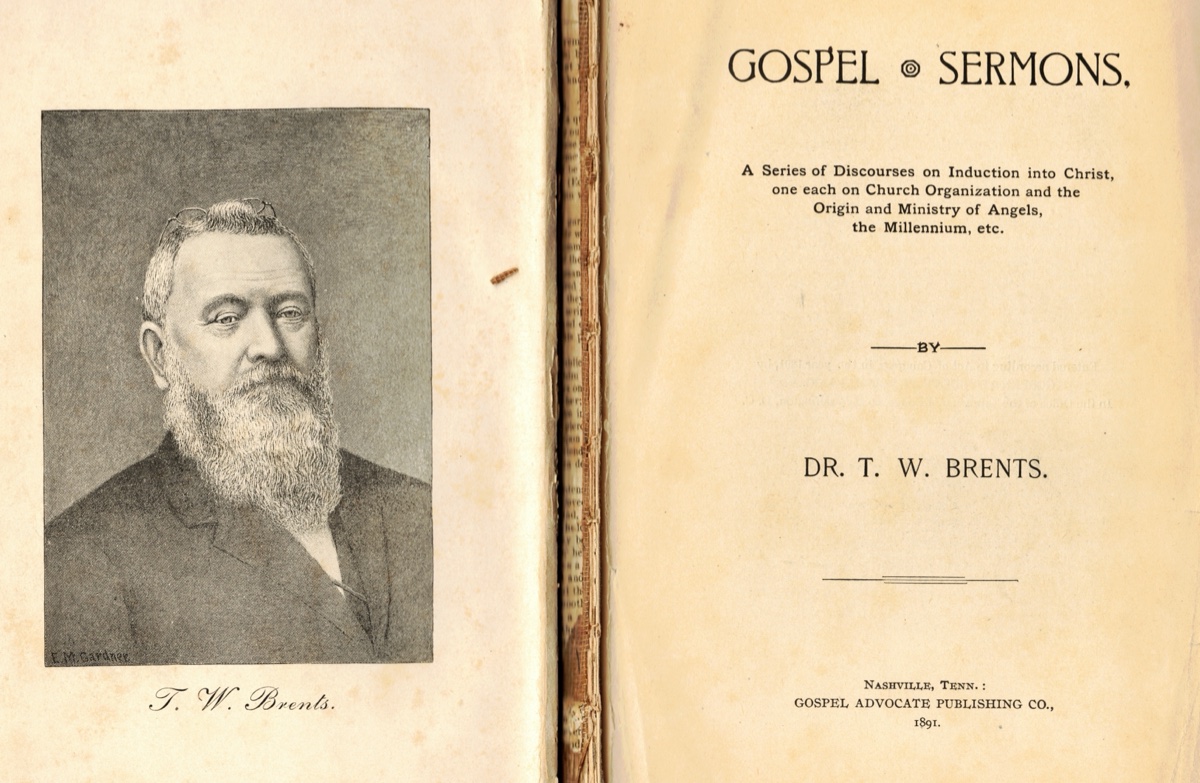
Caption: T.W. Brents’s Gospel Sermons, was first published in 1891 by Gospel Advocate Publishing Company in Nashville, TN.
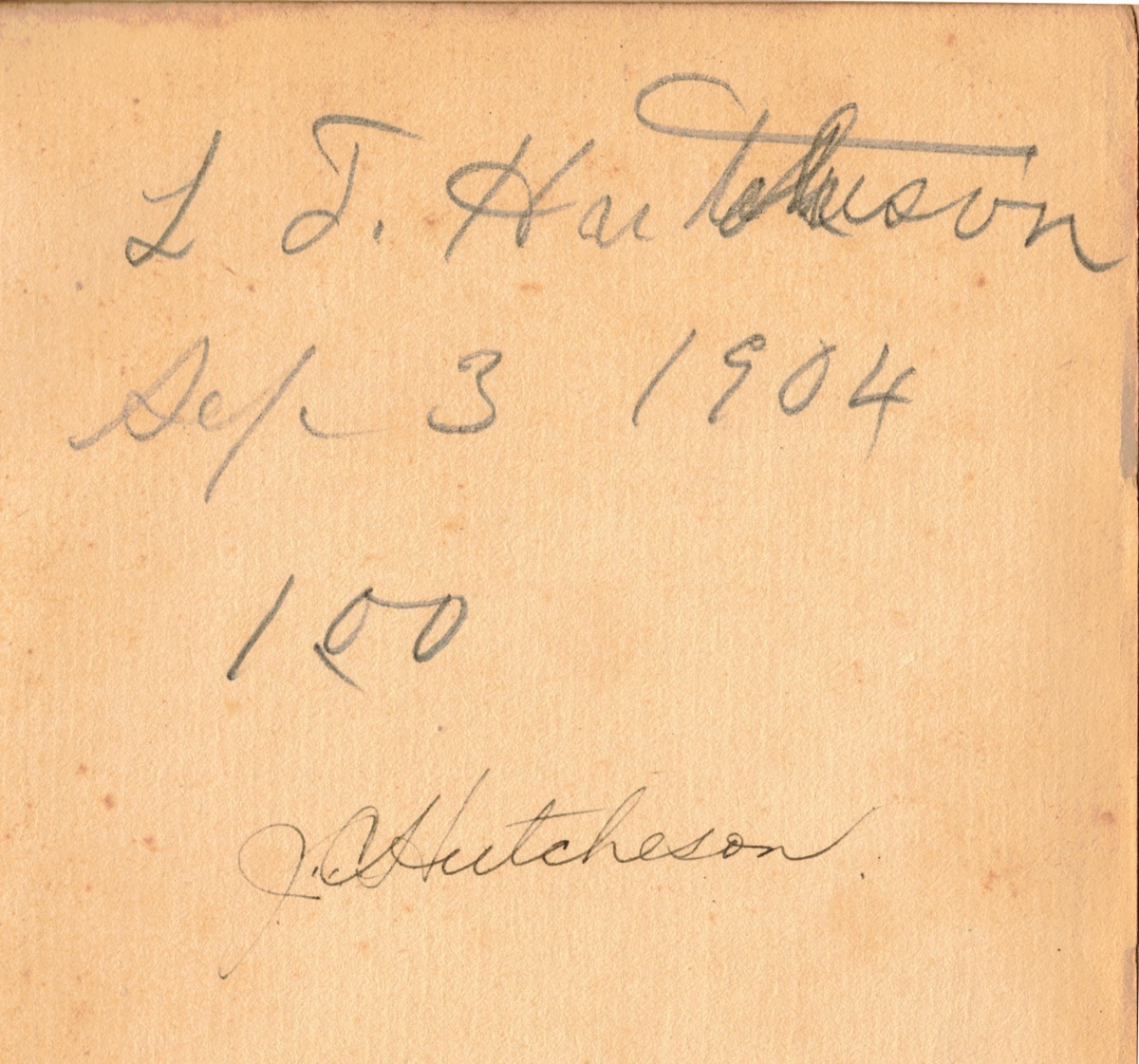
Caption: The original edition copy of this volume that I possess is personally treasured because it is signed by my great-grandfather, L.T. Hutcheson, and my grandfather, J.C. Hutcheson, both of whom were faithful gospel preachers. It appears that L.T. purchased it in 1904 for $1.00.

By Kyle Pope
Synopsis: Five times in the New Testament, disciples are commanded to greet one another with a “holy kiss” or a “kiss of love.” Does this command apply to us today? If so, what is being commanded and how must it be obeyed?
Paul ends his second epistle to the Corinthians in much the same way he ends many of his epistles, with personal greetings and words of encouragement. Of particular note is the command, “Greet one another with a holy kiss” (2 Cor. 13:12, NKJV). What exactly is Paul commanding here? Is this command binding on us today? If not, how does this differ from other commands we are given?
Five times in the New Testament, we find the command to “greet” with a “kiss.” In four of these, it is called a “holy kiss” (Rom. 16:16; 1 Cor. 16:2; 2 Cor. 13:12; 1 Thess. 5:26) and once a “kiss of love” (1 Pet. 5:14). These instructions are general in nature, so they don’t appear only to apply to Rome, Corinth, or Thessalonica. In each of these instructions, we find three elements. First, the command to “greet”—this is the action commanded. This is the function of the command. Members of the church are to “greet” one another. Second, it is with a “kiss.” This modifies the command. It is the manner of the greeting. It is how the greeting is to be done. The word translated “kiss” is the Greek word philēma derived from the familiar verb phileō which refers to the type of love and affection that one shows to a friend. In fact, the word for “friend” (philos) is derived from phileō (cf. John 3:29). Philēma is always used in reference to touching the mouth to the cheek, mouth, hand, or even feet of another person—but its meaning is derived from friendship, not from a verb that refers to the mouth. It is an action of friendship and affection. The third element is that this kiss of greeting is to be “holy” or “of love.” This modifies the nature of the type of kiss. It is not an action of lust or deceit. It is an act of love, consideration, and acceptance of a brother or sister.
It is clear that in ancient times, a kiss of greeting and affection was a common thing. In the family, Jacob kissed Isaac in greeting him (Gen. 27:26-27). In friendship, David and Jonathan kiss farewell (1 Sam. 20:41-42). A Sovereign is kissed to elicit mercy (Ps. 2:12) and a king may kiss his subject as a gesture of mercy (2 Sam. 14:33). A host might kiss a guest as a greeting (Luke 7:45). Simon did not offer Jesus a kiss of honor or greeting, but the sinful woman kissed Jesus’s feet in honor. Judas’s kiss was of false greeting (Luke 22:47-48). His kiss was the opposite of a “holy kiss” or a “kiss of love.”
Today there are still some cultures where kissing is practiced as it was in the Bible. When I went to Turkey some years ago, a young Turkish woman, whom my brother and I met on the plane, explained to us that something we would see frequently—men kissing each other as a greeting—was not a homosexual gesture, but simply affection shown between friends. For better or worse, that is not the way it is in twenty-first century America. In our culture, some families kiss as a gesture of affection, but not all do. In our culture, some friends greet one another this way—but only close female friends and never male friends. If it did happen, it would communicate a flirtatious or a homosexual overture. In our culture, officials and citizens do not kiss each other. To do so in America would not communicate honor or merciful governance. In our culture, kissing is never offered as a gesture of greeting between those who are unfamiliar with each other. To kiss a person who is not family or a close friend would be seen as a sensual advance, not a greeting (as is commanded) nor could it be done in holiness with love. It would be taken as a violation of accepted decorum.
This leads us to ask, is this command binding on us today? Not all commands contained in Scripture are binding. Some are to specific people. Timothy is told to drink wine for his stomach (1 Tim. 5:23) and to bring cloaks and parchments to Paul (2 Tim. 4:13). These are specific instructions to a specific individual for specific situations. Commands are binding when they are applied to believers in general. As we noted above, these commands regarding the “holy kiss” are general in nature. They are applied to several churches, so whatever the “holy kiss” command teaches, it is binding for us today. However, sometimes even general commands address principles beyond the specifics to which they are applied. For example, when Jesus washed the disciples’ feet, He commanded “you should do as I have done to you” (John 13:15), yet there is no indication that Jesus is commanding this as a ritual. “Washing feet” elsewhere stands for service in general (1 Tim. 5:10). In the same way, as noted above, it is the greeting that is commanded; the “kiss” is the type of greeting that is intended to demonstrate holy or loving affection. Paul is not commanding a forced act of affection that communicates an invasion of personal space, a sensual assault, or a breech of accepted decorum. On the contrary, the “holy kiss” (as Scripture teaches) could be any gesture of friendship, love, and acceptance: a hug, a handshake, or a pat on the back—it does not have to involve a touch of the lips to another person.
Some might argue that this reasoning would make one guilty of offering a substitution for a thing commanded. Is that charge valid? We stress the danger and apostasy of making substitutions in things commanded. We teach properly that sprinkling is an unauthorized substitution for immersion. We argue that playing an instrument is an unauthorized substitution for singing. We must make certain that we are consistent to avoid substitutions. Is this rationale substituting some other gesture for a kiss?
In this case, we have biblical evidence that alternate forms of greetings are not substitutions. This is seen in one of the words frequently used for worship. The word proskuneō comes from the verb kuneō meaning “to kiss” and pros meaning “towards.” It means literally “to kiss towards.” Although kuneō is not used in the New Testament, it is clear that the literal meaning of proskuneō was understood in the first century. When Matthew 28:9 describes the disciples falling down and holding Jesus by the feet and “worshiping” Him, the sense of “kissing towards” the object of worship is literally carried out. Yet, elsewhere, to “worship” had nothing to do with literally kissing in reverence. Jacob “worshiped” leaning on his staff (Heb. 11:21). The soldiers offered mock “worship” bowing the knee to Jesus (Mark 15:19). The visitor to the assembly who recognizes that “God is truly among you” will fall down on his face and “worship” (1 Cor. 14:25). What does this have to do with the “holy kiss?” If we can “worship (proskuneō)”—a word that literally refers to a gesture of the mouth, without literally kissing something, it is clear that we can express a holy “kiss (philēma)”—a word that refers to friendship not literally to a gesture of the mouth without literally kissing someone.
Kyle Pope preaches for the Vestavia church of Christ in Vestavia Hills, AL. He has written several books published by Truth Publications. Go here for more information. The church website is here. He can be reached here.




By Jennifer Maxey
Synopsis: Celebrating the power of godliness, and not merely the appearance of it, women of God devote their lives in surrendered trust to the template of Christ.
Godliness is participation in the Divine Nature—a way of living, holistic and transformative. In the life of every woman of God, this sharing with God begins on the inside with a sown seed. Have you surrendered to the will and intention of God for your life, receiving with meekness the implanted word? If so, godliness is the process of your sanctification, as the seed, the Living Word, propagates from within you. Through His seed’s work, God disentangles you from darkness, translating and immersing you in His light (Col. 1:13), claiming you for Himself (Ps. 4:3).
God wants to show you. This is not something we have to figure out on our own, but is a divinely revealed pattern of existence and conduct. In the life of Jesus Christ, God animated His template of godliness as an example for us, leaving the footsteps of Jesus as our pathway (Ps. 85:13).
After He was glorified (John 7:38), Jesus sent the Helper, the Holy Breath of God. His work and power granted us “all things to life and godliness” (2 Pet. 1:3) by His pattern, His template, His Breath, His work.
God wants all of you. “Now may the God of peace Himself sanctify you completely, and may your whole spirit, soul and body be preserved blameless at the coming of our Lord Jesus Christ (1 Thess. 5:23). In the context of the coming calamity of judgment, God sets aside those who have answered His call. He sets us aside completely. He preserves us spirit, soul, and body. He saves us from every destruction and keeps us for Himself. As a partaker of the divine nature, born of His seed, you are completed in Him.
God wants to save you and works in fellowship with you for this purpose. “From the beginning, God chose you for salvation through sanctification of the Spirit and belief of the truth” (2 Thess. 2:13).” God is doing His part—“sanctification of the Spirit;” while you do your part—” belief of the truth.” As a woman in Christ, you are saved.
God wants to share forever with you, in His safety and presence. Right now, He keeps watch to prevent loss and injury because we are called, sanctified and preserved—if we do our part (Jude 20-21, 24-25). As the offspring of God, you enjoy perpetual life now (1 John 3:14). Eternal life has already begun, and we look for “that blessed hope” of completed realization.
God wants you to pursue His works zealously, just as He zealously pursued you; and the time is now (Titus 2:11-14). Immanuel, God-with-us, appeared to redeem and purify us for Himself. He will appear again, to complete what He began (Phil. 1:6). In fellowship with Him now, we deny ungodliness and choose godliness in this present world.
God wants to adorn you. Just as God’s people under the former covenant adorned the temple with valuable stones and gifts, God’s people under the covenant of Christ, who are the new temple, adorn themselves. These adornments of godliness begin in the heart, emerging from God’s implanted word, then manifest outwardly as demonstrated fruits of righteousness. As women of God, our decoration involves heart, mind, body, and strength (1 Tim. 2:9-15).
Women professing godliness practice discipline. “Discipline yourself for the purpose of godliness” (1 Tim. 4:7). As disciples of Rabbi Jesus, every woman of God actively chooses the mind of the rabbi, the heart of the rabbi, the activities of the rabbi, thus disciplining herself into His template of godliness.
Women professing godliness embody contentment. Choose what you have. Can you imagine the tremendous peace of evaluating the inventory of your life with thankfulness? For your shelter and comforts? For your resources and provision? For your family and friends? In rejoicing over the church family in which God has placed you? In actively choosing today the husband with whom you share covenant? In delightfully rejoicing in the children—their sweetness, gentleness, innocence? Contentment is a choice. “Godliness with contentment is great gain” (1 Tim. 6:6).
Women professing godliness are attuned to sound words, and the words of Jesus find reception in us (John 8:37). This is adapting to God’s way of thinking, and not pressing our own way. Have you learned to agree with the sound words of Lord Jesus (1 Tim. 6:3)? Does His word find a place in you?
Women professing godliness confirm the power of godliness, not only in form but also in source. There is a perceived holiness that consists of an external appearance only. Inwardly, though, it is characterized by “ever learning,” yet “laden with sins, and led away by various lusts” (2 Tim. 3:5-7). This guise deceives many. However, true godliness is rooted not in empty form, but in the life, name, and power of Jesus (Acts 3:12ff).
Exhibit the fruit of godly sorrow (2 Cor. 9:9-11). Godliness is a process of transformation, in which God’s grace and truth provide time, space, and understanding so that we can try again. For every battle, the day will come when you repent and rise. For victory, it is only necessary to rise one time more than you fall. Women professing godliness manifest godly sorrow and genuine repentance.
Trust the Lord. He is able to deliver the godly from temptation (2 Pet. 2:9). Women professing godliness comprehend that the Lord perceives and supplies access to the path of rescue (1 Cor. 10:13). If you truly desire an escape from temptation, pray, and trust the Lord who is able.
Godliness is not some abstract, subjective moral code. Rather, it is the Way, the Truth, the Life. It is “Christ-in-me” for every woman of faith, requiring both inward transformation and outward expression. True godliness derives from God Himself, involves an exhaustive and eternal scope, begins now, and comprehensively adorns us. We participate in the heart, mind, and activities of Christ, practicing contentment while aligning with the sound words of our King. Celebrating the power of godliness, and not merely the appearance of it, we devote our lives in surrendered trust to the One who preserves us for Himself and invites us into the divine nature.
Jennifer Maxey has been a member of the Port Royal church in Spring Hill, TN, since 2009. The church website is here. She can be reached here.




By Bruce Reeves
Synopsis: Brother Reeves recounts the biblical story from Numbers 13-14, where twelve spies were sent by God to scout the land of Canaan. Despite the land’s fertility, ten spies reported it as unconquerable due to its formidable inhabitants, leading to widespread fear and rebellion among the Israelites. Only Caleb and Joshua trusted in God’s promise and urged the people to proceed. The narrative highlights themes of faith versus unbelief, the consequences of disobedience, and the importance of trusting in God’s power and promises. The story parallels Israel’s earlier failures and underscores the need for faithful leadership and reliance on God.
One of the central events in Old Testament history is recorded in Numbers 13-14 in the account of the 12 spies God sent to scout out Canaan. The events recorded in these chapters are recounted throughout Scripture (Num. 32; Deut. 1:20-40; 8:2; Ps. 95:10; 106:24-27; Amos 2:10; 5:25; 1 Cor. 10:1-5; Heb. 3:7-4:13). This episode reveals the major turning point in the first generation spoken of in Numbers. When the spies returned after forty days, they reported that the land was very fruitful, just as God had promised. However, most of the spies claimed it was unconquerable because its people were of great size. Caleb and Joshua offered a faithful report, but it was rejected by the people. The grumbling and complaining of chapters 11-12 turned into full-scale apostasy and revolt in chapters 13-14. Satan strives to build dissatisfaction among the Lord’s people because he knows this spirit leads to departure from God’s plans and presence.
Significantly, the Lord’s promise to give Abraham and his descendants Canaan was central to His covenant with Israel (Gen. 12:7; 13:15; 15:18; 17:8). Agreeing to enter the land would demonstrate trust in the Lord’s faithfulness, but refusing to enter Canaan with confidence in God’s leadership would be an act of unbelief and disobedience. These events in many ways highlight parallels with Israel’s previous failure in the golden calf incident (Exod. 32).
The Israelites journeyed to Kadesh Barnea in the northern wilderness of Paran, south of Canaan (Num. 12:16; 13:26). The Lord commands that twelve men be sent “to explore the land of Canaan, which I am giving to the Israelites” (Num. 13:2) [Note 1]. In the Hebrew, “I am giving” has an immediacy about it, describing an action already in progress. The Lord is about to fulfill His covenant promise; at least, that is how the story is supposed to go. Twelve men are to come from each tribe and be leaders, acting as representatives on behalf of their tribe. Of the twelve who are listed, ten are never mentioned again because of their disobedience (Num. 13:4-15). Two men, Caleb and Joshua, are mentioned later in the biblical account because of their trusting faithfulness to Yahweh (Num. 32:12). “Hoshea” will have his name changed to “Joshua” which either means “The Lord saves” or the “Lord is salvation.” This name change should have emphasized to Israel that the Lord was their help and was working through Moses and Aaron to bring them to His promised blessings.
When Moses sent the spies, he gave them various instructions (Num. 13:17). Some related to the upcoming battles that Israel was to undertake with the land’s inhabitants. Moving forward in faith does not mean moving blindly. They were to report about the inhabitants’ strength, numbers, and fortifications (Num. 13:18-19). The spies were also to confirm that it was a prosperous land which would only verify what the Lord had revealed (Num. 14:8). Moses also instructed them to report about the land’s fertility and forests and to bring back samples of the fruit (Num. 13:20). As they traveled through Hebron, they saw descendants of Anak described as “great and tall” who were famous for their strength and valor (Deut. 9:2). Rather than realizing this is the land God promised Abraham, the faithless spies saw all the reasons they thought they would “not be able” to do what God promised. Let us recognize that our Lord, through His power and grace, never commands us to do anything beyond our ability (1 Cor. 10:13; 1 John 2:1-2).
As for the valley of Eshkol, it was full of fruit—pomegranates, figs, and grape clusters so large they had to be carried on a pole between two men. Do you recall their complaints about manna? This scene ends with the spies returning to the camp after forty days (Num. 13:25). Of course, that number becomes central to the Israelites’ discipline in the next chapter (Num. 14:34).
The spies’ report starts positively enough, underscoring the land flowed with milk and honey—a poetic shorthand to describe a land of incredible fertility (Num. 13:27; cf. Deut. 8:7-9). However, the majority report was meant to undermine the faith of God’s people rather than instill optimism, confidence, and courage. Instead of a “bad report” it could just as well have been translated as a “false report” or “evil report.” On one hand, they granted the truth of God’s promises, but then, on the other hand, they sowed nothing but seeds of doubt regarding His presence and power among them.
Notice the narrative they presented:
The people are not just strong; they are fierce (Num. 13:18, 28).
The cities are not simply fortified; they are large and well defended (Num. 13:28).
The inhabitants are giants; in comparison, we are like grasshoppers (Num. 13:28).
The people are not few; they are everywhere (Num. 13:18, 29).
What we don’t hear about is God’s greatness, power, faithfulness, and strength!
Caleb’s report was entirely different due to his faith and trust in God. He declares: “We should indeed go up and take possession of it, for we can most certainly prevail against it!” (Num. 13:30). Sadly, the unbelieving spies immediately contradicted him and described Israel as “grasshoppers” compared to the inhabitants of Canaan. This slanderous report spread throughout the camp like a spiritual disease. Often, error is embraced much more quickly and strongly than the truth. The reason being that error appeals to cowardice, weakness, and distrust; in contrast, the truth calls on us to make sacrifices for the Lord against those who are looking for the easy and convenient way to the promised land (2 Thess. 2:10-12). What do we see when we are looking at formidable and difficult circumstances in life? Will we join with Caleb and proclaim, “We can most certainly prevail” (Num. 13:30; cf. Rom. 8:35-39; Phil. 4:13). We, too, will face giants in our lives. Our giants may be overcoming shame and guilt from the past, the influence of our culture on our spiritual lives, a struggling marriage, children who have fallen away, disappointment from beloved brethren, or addictions that plague us. Yet, through the power and strength of our God, we can join with the faithful of old and proclaim, “We can most certainly prevail.” Let’s not adopt the grasshopper complex (Num. 13:33), but embrace the power and hope grounded in our Lord and King!
The whole assembly of Israel rebelled against God (Num. 14:1). They wept loudly and shouted in sadness through the night and into the morning after hearing the unfaithful witnesses report that the people of Canaan made them seem like “grasshoppers” (Num. 13:31-33). Weeping was mixed with “grumbling” against the Lord and His leaders (Num. 14:2-3). Notice the intensifying development of the language: they “raised their voices,” “wept,” “murmured,” “desired to return to Egypt,” etc. They even went so far as to attribute evil motives to the Lord (Num. 14:3). Israel was so blinded by their unbelief that they decided they would rather be slaves of a wicked nation than faithfully fight for God. How many times do we behave similarly? Some would rather be slaves to sin and a corrupt society than to fight against Satan’s influence under the banner of the captain of our salvation (2 Cor. 10:3-5; Eph. 6:10-17). Somehow, when difficult circumstances are mixed with a lack of belief in God’s goodness, bondage to cruel taskmasters becomes an appealing option. When we yield to sin, we will become blind, desensitized, calloused, and foolish (Rom. 1:22-32; Eph. 4:22-24). Let us see the goodness of our faithful God!
The Lord’s judgment once again is connected to Israel’s words:
Dying in the wilderness (Num. 14:2, 29, 32-33, 35)
Falling by the sword (Num. 14:3a, 43-45)
Children becoming prey (Num. 14:3b, 31, 33)
Their fears were fulfilled because of their own sin and distrust of God, not because of the Lord’s lack of faithfulness.
When God’s people rebel, complain, and sin, spiritual leaders are faced with significant choices. Moses and Aaron fell on their faces out of dismay over the unfaithfulness of the people and humbly begged God for mercy (Num. 14:5; cf. 16:4-6). Joshua and Caleb likewise tore their clothes in grief at the assembly’s rebellion and pled with the people to act in faith rather than unbelief (Num. 14:6-7). Not only had Israel given an evil report about a “good land,” but they had given an evil report about a good God (Num. 14:6-9).
The “good land” is a standard description of Canaan in Deuteronomy. The Lord not only offered His provision and protection to His people, but even His own presence (Ps. 105:39). In response, these rebellious people wanted to stone the faithful men of God (Num. 14:10). How often do those who desire to rebel against the Lord turn against those who do not (Acts 7:51-59). Is this not what Israel desired to do when God came in the flesh in Jesus Christ due to their unbelief (John 8:58-59)?
Yahweh chooses to intervene, “Then the glory of the Lord appeared in the tent of meeting to all the sons of Israel” (Num. 14:10). The “glory of the Lord” refers to the display of God’s strength, presence, judgment, and majesty, and is depicted as a “devouring” or “consuming fire” (Exod. 24:17; cf. Heb. 12:28). Rebellion against Moses was really rebellion against God. The Lord says, “How long will this people spurn Me? And how long will they not believe in Me, despite all the signs which I have performed in their midst?” This is the very attitude Jesus dealt with among the Jewish leaders in the first century. It was a disposition that refused to believe, no matter how many signs and how much evidence God gave them. The verb “spurned,” can also be translated “despised” or “treated with contempt.” In the wilderness context, the rejection of the land is symbolic of a rejection of the covenant promises of God (Gen. 12:7). It demonstrates a high-handed, intentional, deliberate, and rebellious heart against the Lord. Having described their guilt, the Lord now pronounces their sentence, mirroring His response after the golden calf incident. He even threatens their destruction and offers to make Moses the founder of a new and mighty nation (Num. 14:12; cf. Exod. 32:10).
Often in the Pentateuch, God’s promise of judgment is met with Moses’s intercession on Israel’s behalf, which foreshadows the work of the Christ to come (Gen. 18:17-33; Exod. 32:10-14). God’s anger reveals the seriousness of the people’s sin against Him (Num. 14:12). It is noteworthy that Moses’s pleading for Israel was not based on their conduct; rather, he grounded his pleas on God’s character and reputation (Num. 14:13-19). God was just to destroy Israel, but Moses appeals to His gracious forgiveness and His lovingkindness, steadfast love, and faithfulness (Num. 14:17-19; cf. Dan. 9:1-19). The Lord’s lovingkindness is “slow to anger, abounding in love and forgiving sin and rebellion. Yet He does not leave the guilty unpunished” (Num. 14:18; cf. Exod. 34:6-7).
Yahweh begins by addressing Moses directly (Num. 14:20-25). He hears Moses and does not carry out the threatened punishment. Nevertheless, forgiveness does not disregard punitive discipline (Num. 14:20). Those who refused to listen to the Lord’s voice, after seeing His signs and glory, would not make it into the promised land (Num. 14:21-23). God’s pardon is not a removal of all consequences of our sinful actions. While the unbelieving Israelites would perish in the wilderness, the nation of Israel would not be destroyed. Caleb and Joshua would be preserved by the Lord’s good providence because they had stood strong against the rebellious movement of the unbelieving. Caleb is described as having a “different spirit” and having “followed the Lord fully” (Num. 14:24). He is a powerful example for believers today. He shows us that we can follow God fully, we don’t have to give in to the majority when they are rebelling against the Lord, we can choose to have a different spirit than those around us, and we can be victorious through trusting the promises of our God!
While most of the Israelites would die over the next forty years, the ten faithless spies experienced immediate judgment from the Lord (Num. 14:36-38). While it is always wrong for people to rebel against God, those who lead them into such sin bear even a greater responsibility. Moses made it clear that the present unbelieving generation must not attempt to conquer Canaan, as they would be entering battle against God’s will and strength. They tried to do so anyway and received the fruit of their disobedience (Num. 14:39-45). How often are we defeated in our spiritual battles because we attempt to face them on our own without the presence and power of God’s word in our lives?
Let us learn from Israel’s failures and run to God’s faithful Son. We will be victorious if we trust in the Lord’s promises, walk in His faithfulness, and obey His gracious word. Paul encourages us to do this very thing when he writes: “Behold, then, the kindness and severity of God; to those who fell, severity, but to you, God’s kindness, if you continue in His kindness; otherwise, you also will be cut off” (Rom. 11:22).
[Note 1] Deuteronomy 1:22 indicates that the people requested the sending of spies, implying that the Lord’s command in Num. 13:2 came in response to this request.
Bruce Reeves has labored with the Highway 65 church of Christ in Conway, AR, since 2000. He and his wife, Rachel, have one child. The church website is here. He can be reached here.



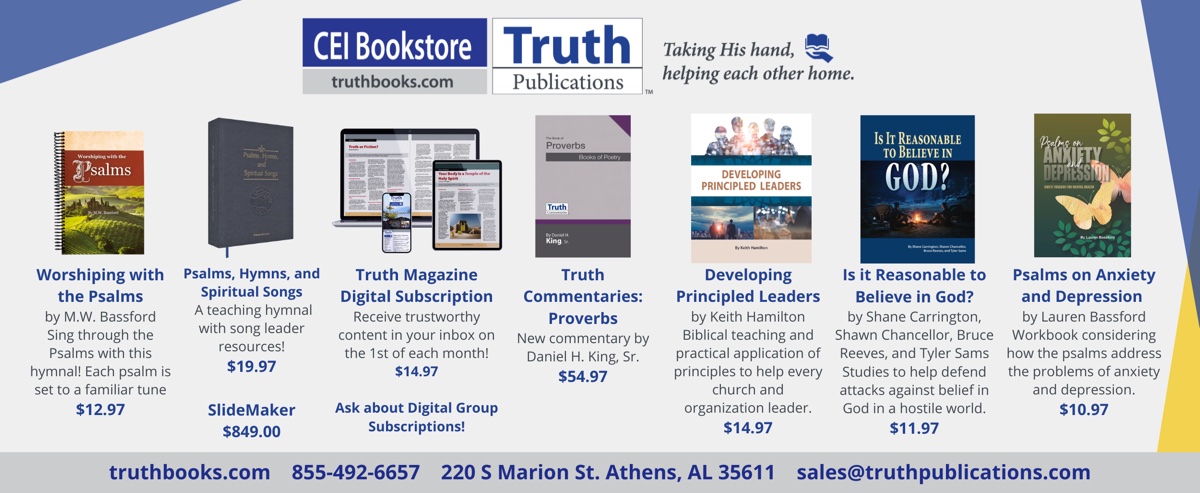
By Shane Carrington
Synopsis: Getting into a boat with Jesus puts us at the mercy of the all-powerful One who loves us and will see us through to the other side of the storms of life.
Jesus got tired (John 4:5-6), hungry (Matt. 4:2), and sleepy (Matt. 8:24) just like the rest of us. He faced a lot of adversity in life. In fact, His comforts in life were pretty minimal. Regardless of His hardships, Jesus had important work to do, and He had to fulfill His Father’s will while there was time.
We must work the works of Him who sent Me as long as it is day; night is coming when no one can work (John 9:4, NASB).
Christ did some of His work in public and some in private. When He descended after the sermon on the mount, He came to Capernaum and went into Peter’s house (Matt. 8:1-14). There, Jesus healed Peter’s mother-in-law (Matt. 8:14-15). This resulted in another crowd of people thronging Him and seeking healing, which He gladly did (Matt. 8:16-17).
Due to the crowd, He and the disciples departed to the other side of the sea (Matt. 8:18). Before they made their exit, someone said, “I will follow You wherever You go” (Matt. 8:19). Another said, “Lord, permit me first to go and bury my father” (Matt. 8:21). To both, Jesus gave sober, far-reaching words: “The Son of Man has nowhere to lay His head” (Matt. 8:20); “Follow Me and allow the dead to bury their own dead” (Matt. 8:22). We struggle to grasp the power of these sayings, and we wrestle to follow what He meant by them. In this article, we will explore three things we learn in this scene from Jesus’s life, including these two sayings.
While Jesus came from Nazareth of Galilee, He had no permanent earthly home. He grew up there, but His ministry took Him all over Israel. He aided His nation (Matt. 15:24), but His mission was designed to impact the world (John 3:16). In order to fulfill the Father’s purposes for Him, Jesus had to come as God incarnate (John 1:1-4, 14-18; Phil. 2:5-11; 1 Tim. 2:5; Heb. 1-2).
In these ways, we see the sacrificial nature of Jesus to provide our redemption. He came to suffer trials of life, be rejected by His nation, and “taste death for everyone” (Heb. 2:9).
Jesus is the ultimate leader because He led in love. He loved us and left heaven. He loved us and “became flesh” (John 1:14). He loved us and “was despised and forsaken of men, a man of sorrows and acquainted with grief” (Isa. 53:3). He loved us and “was cut off out of the land of the living for the transgression of My people, to whom the stroke was due” (Isa. 53:10). He loved us and saved us from our sins (Rom. 5:6-11). This is why Jesus is the ideal leader.
He modeled being sacrificial in the ultimate way, so when He said, “The Son of Man has nowhere to lay His head,” He was inviting us to follow His example of being self-sacrificial for the good of others. Following Jesus is a life of challenging choices. We do not go wherever we want or do what everyone else does; instead, we must follow Jesus. Why? Because He loved us and yielded up His last breath in death, then conquered death by rising again from the grave. Christ is our crucified, resurrected, enthroned King.
When Jesus said, “Let the dead bury their own dead” (Matt. 8:22), He proved by life and death that He put the good of others over His own sentiments. Being our Savior required Jesus to make hard choices. Following Jesus also requires difficult decisions. Comforts of a temporary, earthly life can never compete with eternal, spiritual redemption. With this saying, Jesus focuses us on the eternal good of others. A life focused exclusively on the here and now misses eternal principles that improve our earthly existence and forfeits the hope of eternal life to come.
Jesus displayed a calmness to which all aspire. When on the boat, they were in true danger of physical death. The disciples cried out to Him, “Save us, Lord; we are perishing!” (Matt. 8:25). Considering that several of the apostles were fishermen, and accustomed to storms, this one must have been especially severe. The geography of the Sea of Galilee allows storms to reach life-threatening intensity quickly. Regardless, one person might be afraid of something that another is not. An inexperienced person struggles where someone who is seasoned proceeds calmly and confidently. These men were experienced, yet still frightened!
When they cried out to Him, Jesus saved them. He was asleep and perfectly calm, and then “He got up and rebuked the winds and the sea, and it became perfectly calm” (Matt. 8:26). This wonder is listed in a catalogue of Jesus’s miracles recorded in this section. He healed a leper (Matt. 8:1-4), a Roman centurion’s servant (Matt. 8:5-13), and Peter’s mother-in-law (Matt. 8:14-17). He calmed the stormy sea (Matt. 8:18-27), and He will cast out demons on the other side of the sea (Matt. 8:28-34). If Jesus can save (which means “rescue, heal”) people physically, then He can also redeem people spiritually and eternally (Mark 16:15-16)!
Before He vanquished the storm, Jesus said, “Why are you afraid, you men of little faith?” (Matt. 8:26). It is as if He is saying, “Haven’t I already shown you who I AM? Trust Me!” A fearful attitude leads to a fearful life, but a faithful spirit leads to hope, comfort, and peace in our Savior.
“. . .that even the wind and sea obey Him?” (Matt. 8:27). This is a great question with an obvious answer. When Job challenged God, the Divine response was telling:
Who enclosed the sea with doors when, bursting forth, it went out from the womb; when I made a cloud its garment and thick darkness its swaddling band, and I placed boundaries on it and set a bolt and doors, and I said, “Thus far you shall come, but no farther; and here shall your proud waves stop”? (Job 38:8-11)
The Psalmist wrote:
By the word of the Lord the heavens were made, and by the breath of His mouth all their host. He gathers the waters of the sea together as a heap; He lays up the deeps in storehouses. Let all the earth fear the Lord; let all the inhabitants of the world stand in awe of Him. For He spoke, and it was done; He commanded, and it stood fast (Ps. 33:6-9).
Jesus calmed the wind and sea, proving that He is Divine—for only God can do these things. This is different than when the Red Sea was parted and Israel crossed.
Then Moses stretched out his hand over the sea; and the Lord swept the sea back by a strong east wind all night and turned the sea into dry land, so the waters were divided (Exod. 14:21).
In this passage, Moses stretched out his hand, but it was God who parted the waters. When Jesus and the apostles were on a stormy sea, the passage says that Jesus “got up and rebuked the winds and the sea, and it became perfectly calm” (Matt. 8:26). Why? Because He is God incarnate.
Although Jesus became man, this incident also shows that He is divine. When you get into a boat with someone, you are at their mercy! Being in a boat on the stormy sea of life with Jesus reveals that, if He can save physically, He can also redeem spiritually. May we, like the disciples, cry out, “Save us, Lord; we are perishing!” (Matt. 8:25). If we call upon Him for redemption in the manner He has prescribed, He will truly save.
Now why do you delay? Get up and be baptized, and wash away your sins, calling on His name” (Acts 22:16).
Trust Jesus and climb into the boat with Him. The seas often will be stormy, but Jesus has the love and power to see you through. Therefore, “Why are you afraid. . .?”
Shane Carrington has worked with the Southside church of Christ in Sulphur Springs, TX, since 1999. He has two children and four grandchildren. The church website is here. He can be reached here.



By Bobby L. Graham
Synopsis: This article addresses a teaching that the earth will be restored to its former Edenic glory and serve as heaven. The author refutes this by citing biblical passages, emphasizing that Jesus and the apostles taught that the physical heavens and earth will pass away, and the saved will spend eternity with Jesus in heaven, not on earth.
A preacher whom I know teaches that this earth will be restored to its former glory, as in the garden of Eden, and that it will then serve as our only heaven. Please share what the Bible teaches regarding this matter.
Recent decades have seen the rise of many strange teachings, among which is the one here considered: namely, that heaven will be here on earth. Although many have not heard of this teaching, it is currently being advocated by several outspoken teachers. What does the Bible say about this teaching?
While it usually takes much to gain our attention, in this instance, the usual response is something like “Wait! What?” It is such a radically different doctrine which alleges that earth will be renovated/renewed to serve as heaven’s location, that people often react with disbelief that anybody believes such. It will be “down here,” not “up there”! While the actual location of heaven might be unknown and, thus, irrelevant, much more is involved in this case.
In Revelation 21:1-5, there is John’s record of a part of his vision, in which the holy city, the New Jerusalem with its redeemed inhabitants, came down from God. She was prepared as a bride, adorned for her husband. What John saw he described as the new heavens and new earth, because the first heavens and earth had passed away, along with the sea. God was dwelling among the redeemed; they were at home with the Lord. The vision’s depiction of this scene “coming down” in no way indicates the location of heaven, but the source or origin of the vision.
Our question is, “Where will this take place?” The main idea of “New Creation Theology” is not new, because this idea was associated with Bishop Methodius of Olympus, who was martyred in AD 311. It resurfaced in nineteenth century Seventh-Day Adventism and also in Jehovah’s Witness doctrine. It was briefly echoed in the Restoration Movement.
Jesus begged to differ from all of these! In Matthew 24:35, Mark 13:31, and Luke 21:33, Jesus said that heaven and earth would pass away, but His word would not pass away. Note that He did not say that earth will be purified by fire, as these people claim will happen. No, He instead said that it will come to an end or perish. According to Jesus, the saved will be with Him in heaven, not on earth (John 14:2-3). He told the apostles they could not then come where He was going, but later they would come where He would be (John 13:33, 36; 14:1-3). It cannot be denied that the teaching being examined contradicts the clear teaching of Jesus.
The apostle Peter’s teaching aligns well with that of his Master. In 2 Peter 3:10-13, he discusses the earth’s future destruction. He employed such verbs as “pass away,” the same as Jesus, and “dissolve/destroy” of everything physical, including the heavens and earth.
Likewise, the teaching of Paul, who was not one whit less than the twelve, pictures Jesus as coming in flaming fire to take disciples away from the earth (2 Thess. 1:8; 1 Thess. 4:16-17). Paul affirmed that this teaching agreed with that of Jesus (1 Thess. 4:15). He also speaks of the spiritual body given to both the dead and the living saints at the resurrection, that they might possess glorified bodies like Jesus (1 Cor. 15:40-49; Phil. 3:20-21).
Various biblical statements are senseless if this strange doctrine is true. Jesus’s admonition to lay up treasures in heaven, not on the earth, makes no sense if heaven is a place on earth (Matt. 6:19). Paul’s exhortation in Colossians 3:1-2 to seek the things that are above and to set our minds on things above, not on things on the earth, is equally nonsensical in view of this idea. His teaching about things earthly (things seen) being temporary in 2 Corinthians 4:18 is equivalent to Hebrews 12:26-29 which says that the things of earth will be shaken, as opposed to remaining, and also to 1 John 2:16-17 saying that the world passes away. We need to remember that our Father is in heaven, and that we hope to go there to be with Him, because Christ our forerunner has preceded us there (Matt. 6:9; Heb. 6:19-20; 9:11-15).
Bobby L. Graham actively participates in fill-in preaching, Belize trips, teaching an hour each day at Athens Bible School, and in gospel meeting work. He and his wife, Karen, have three children. He can be reached here.



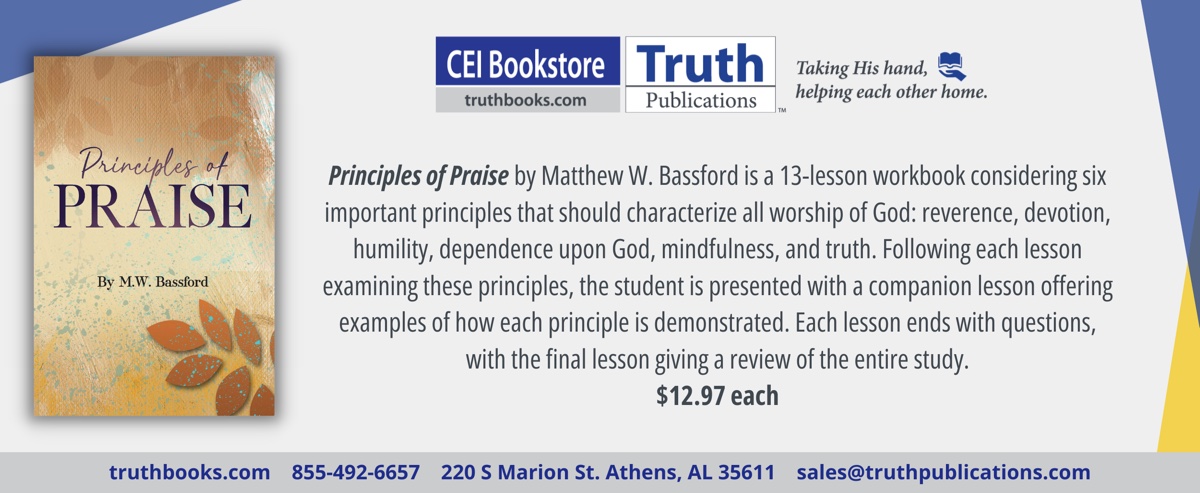
By Leon Mauldin
Synopsis: The continued presence of the Canaanites would be a detrimental influence on Israel, just as God, through Moses, warned. Israel would lapse into idolatry, worshiping the gods of the Canaanites, as well as those of the surrounding nations. Upon a closer look at the geography, it turns out that many of the places mentioned are not just random sites, but significant strategic locations.
Joshua is the biblical book of the conquest of Canaan, and the fulfilling of the land promise given to Abraham (Gen. 12:7). A key verse in this regard is Joshua 21:43, which says, “So the LORD gave to Israel all the land of which He had sworn to give to their fathers, and they took possession of it and dwelt in it.” This refers to the initial conquest, as God promises, “Little by little I will drive them out from before you” (Exod. 23:29-30). This was contingent upon Israel’s continuing to drive the Canaanites out, and certainly not to make covenants with them or intermarry, or to engage in their idolatrous practices. Unfortunately, Israel failed to follow through as they were commanded, thus leaving the seeds of idolatry in their midst, but also leaving themselves politically and economically thwarted.
The book of Judges takes up with the thread of the aforementioned narrative. Initially, after the death of Joshua, there is some continued fighting as instructed (Jud. 1:1-18), but then it turns out that the text begins to list cities mentioned that either were not conquered, or if conquered were not retained. As one studies the cities mentioned, these were, in most, if not all cases, strategic sites needed for defense or commerce. This article will mention just one of those: Beth Shean.
Beth-shean controlled major routes going both north-south and east-west. Beth-shean was strategically located at the juncture of the Jezreel and Jordan valleys. The modern name of the site is Tel el-Husn.
Eerdman’s Bible Dictionary notes:
Excavations at Tell el-Husn (i.e., Beit She’an), conducted from 1921 to 1933 by C. S. Fisher and A. Rowe for the University of Pennsylvania Museum, indicate that the site has been settled almost continuously since Chalcolithic times. In the Late Bronze Age, the city apparently functioned as the major Egyptian center in Palestine. It is listed among those cities conquered by Pharaoh Thutmose III (fifteenth century BC), and numerous Egyptian remains have been found. Included are a fourteenth-century temple to the local god Mekal, to whom was dedicated a stele inscribed with a prayer; a magnificent relief showing a lion and dog in combat was discovered on a wall of the temple. A victory stele of Seti I (1313-1292) indicates that he reinforced the city’s military operations, perhaps with troops from Gath-Carmel; another stele mentions the Apiru of Yarmuth, probably the town assigned to Issachar (Josh. 19:21). Two temples, dedicated to Anat (called Antit) and Dagon, were erected in the time of Rameses II and continued in use through the Philistine occupation and into the Israelite period; apparently these were the temples to which the Philistines fastened the armor and head of Saul (1 Sam. 31:10; 1 Chron. 10:10). A large cemetery north of the city has been assigned to this approximate period; it contains several anthropoid coffins (clay coffins bearing human portraits) of dignitaries or mercenaries in Egyptian service. Remains of the Israelite occupation are unimpressive; the relevant strata of the tell bear considerable evidence of destruction by Pharaoh Shishak (ca. 920) and the Assyrians or Babylonians. In the postexilic period, Beth-shan was little more than a village. A theater, hippodrome, aqueduct, and a great city wall have been discovered, dating to the Roman occupation. Several churches and synagogues as well as a sixth century monastery survive from Byzantine times.
One of the sad things later associated with the site is that King Saul’s body, and those of three of his sons, were fastened to the walls of the city after Israel’s defeat by the Philistines (1 Sam. 31).
During Hellenistic times, the city was called Scythopolis. By New Testament times, it was included in the Decapolis, the “ten cities” given the right of self-government by the Romans. During Jesus’s Galilean ministry, “Large crowds followed Him from Galilee, the Decapolis, Jerusalem, Judea, and beyond the Jordan River” (Matt. 4:25, NET).
It would greatly impact Israel in a negative way to not possess the specified cities. Beth Shean was just one of many. This will in fact prepare the reader for the cycle of apostasy that is summarized in Judges 2:10-23.


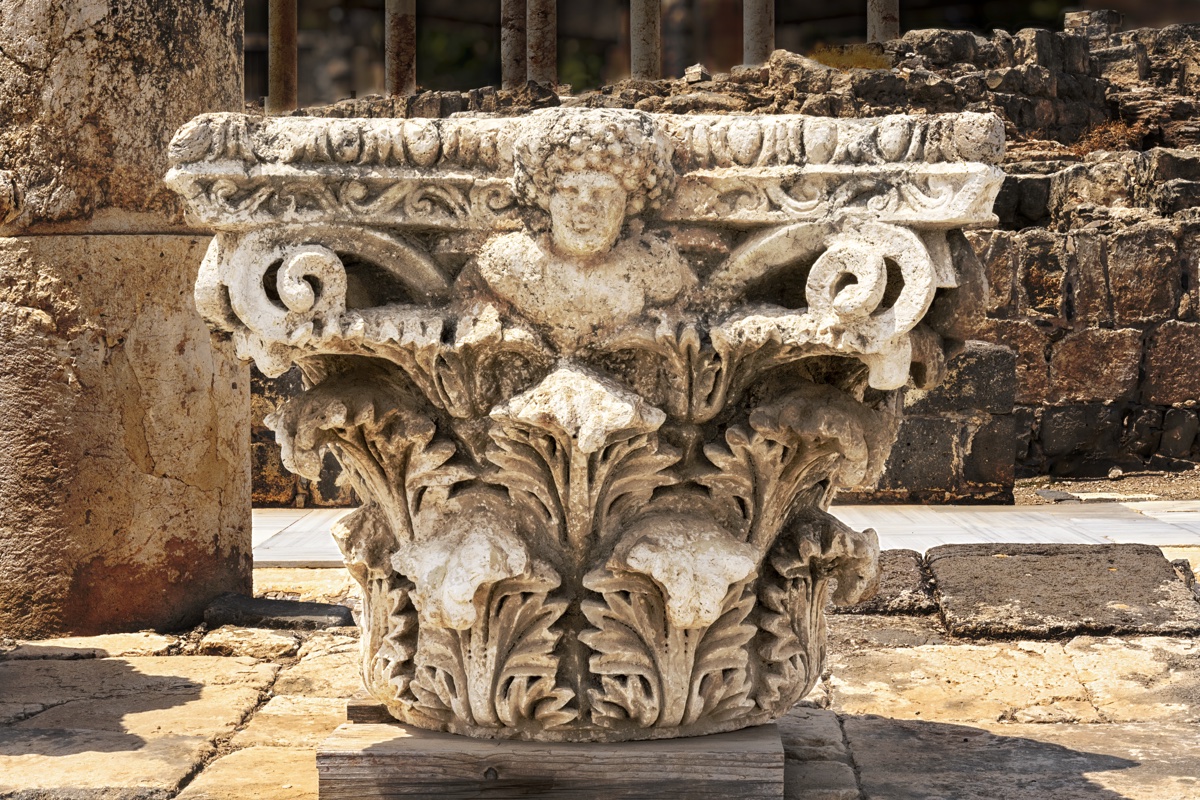

The Beit Shean Archaeological Site is located in the northern region of Israel, where the Harod Valley and Jordan Valley meet. It is approximately 27 kilometers south of the Sea of Galilee and about 5 kilometers east of the Jordan River. This site is one of the largest archaeological sites in the country and is known for its extensive and well-preserved ruins.

Leon Mauldin has worked with the Hanceville church of Christ in Hanceville, AL, for over thirty-four years. He and his wife, Linda, have three children and nine grandchildren (one deceased). The church website is here. His personal blog is here and info about his Bible Land Tours is here. He can be reached here.



By Chris Reeves
Synopsis: A God-given marriage has a great potential for good. Yet, some couples choose to allow their marriage to be a force for evil. Like Ahab and Jezebel, they ruin their God-given relationship and end up hurting themselves and everyone around them.
Believe it or not, about twelve years ago, I actually met a young woman named Jezebel. She was working the counter at the Arby’s in Springfield, Tennessee. After that, I wondered if her mother knew the biblical account of Jezebel and why she would give her daughter that name. The names of Ahab and Jezebel in the Old Testament, of course, are synonymous with wickedness and worldliness. They were pure evil [Note #1].
Even today in the Lord’s church, couples can do damage to themselves and those around them. Married couples should ask, “Are we helping each other and those around us reach heaven, or are we leading ourselves and others down a path of sin?” Of course, all couples that I know of would say, “We are helping each other and those around us!” Are you really? Take an honest look at your thoughts, actions, habits, lifestyle, influence, teaching, etc. Are these things really biblical, or are they more carnally and worldly minded? Are we truly living by biblical principles, or are we selfishly living as we wish, merely appearing to be Christians?
Ahab holds the dishonorable distinction of being Israel’s most wicked king to date. Contrary to God’s word, he married Jezebel, a Sidonian. Together, they encouraged each other in wickedness, harming themselves. She dominated him and he acquiesced to her influence. She moved him to promote gross idolatry and immorality in Israel. Because of this, he sold himself to do evil (1 Kings 21:20). 1 Kings 16:31-33 reads:
And it came to pass, as if it had been a light thing for him to walk in the sins of Jeroboam the son of Nebat, that he took to wife Jezebel the daughter of Ethbaal king of the Sidonians, and went and served Baal, and worshipped him. And he reared up an altar for Baal in the house of Baal, which he had built in Samaria. And Ahab made the Asherah; and Ahab did yet more to provoke Jehovah, the God of Israel, to anger than all the kings of Israel that were before him.
When Ahab coveted Naboth’s adjoining vineyard, Naboth refused to sell it [Note #2]. Ahab, acting childishly, was displeased and discouraged and he would not eat. Instead of telling her husband to stop pouting, Jezebel told Ahab that she would get the vineyard for him. She had Naboth falsely accused and then killed, so Ahab got his vineyard. Elijah came and pronounced judgment upon Ahab and Jezebel for their wicked deed. Then, the author of the book reminds the reader of Jezebel’s evil influence over her husband. 1 Kings 21:25 reads:
But there was none like unto Ahab, who did sell himself to do that which was evil in the sight of Jehovah, whom Jezebel, his wife, stirred up.
Ahab and Jezebel hurt God’s people by causing them to commit idolatry. Ahab and Jezebel provoked the Lord to anger and “made Israel to sin” (1 Kings 21:22). Their evil influence in Israel would extend about 200 years all the way down to the time of Micah (Micah 6:16).
Ahab and Jezebel hurt the preaching of God’s word by killing the true prophets and by supporting the false prophets of Baal. Jezebel “cut off” and “slew” the prophets of Jehovah (1 Kings 18:4, 13). In place of the true prophets, Jezebel supported 450 prophets of Baal and 400 prophets of the Asherah, who ate at her table (1 Kings 18:19). When Jezebel promised to kill Elijah, he had to run away (1 Kings 19:2). Ahab also did not like Elijah. Ahab called him the “troubler of Israel” (1 Kings 18:17) and “mine enemy” (1 Kings 21:20). Ahab also disliked the prophet Micaiah because he never prophesied good about the king, so Ahab imprisoned him (1 Kings 22:8). About fourteen years after the death of Ahab, the Lord would use Jehu to slay Jehoram, the son of Ahab, and Jezebel because she had shed the blood of the Lord’s prophets and servants (2 Kings 9:7, 30-37).
Ahab and Jezebel were an evil influence on their children. Their son, Ahaziah, was a wicked king who ruled over Israel for only two years. 1 Kings 22:52-53 reads:
And he did that which was evil in the sight of Jehovah, and walked in the way of his father, and in the way of his mother, and in the way of Jeroboam the son of Nebat, wherein he made Israel to sin. And he served Baal, and worshipped him, and provoked to anger Jehovah, the God of Israel, according to all that his father had done.
On one occasion, Ahaziah took a serious fall and got sick. Instead of turning to the Lord for help, he sent his messengers to inquire of Baal-zebub, the god of Ekron, whether or not he would recover. Elijah told the king that he would die in his sickness because he refused to seek the one, true God of Israel (2 Kings 1:1-18).
The second son of Ahab and Jezebel, Jehoram (Joram), was wicked and ruled over Israel for twelve years. Jehu summed up his reign this way in 2 Kings 9:22:
And it came to pass, when Joram saw Jehu, that he said, “Is it peace, Jehu?” And he answered, “What peace, so long as the whoredoms of thy mother Jezebel and her witchcrafts are so many?”
The daughter of Ahab and Jezebel, Athaliah, was also wicked [Note #3]. She is called “that wicked woman” in 2 Chronicles 24:7. She married Jehoram, who became king of Judah and he was as wicked as she was. She influenced Judah to the south to do evil. 2 Chronicles 21:6 reads:
And he [Jehoram] walked in the way of the kings of Israel, as did the house of Ahab; for he had the daughter of Ahab to wife: and he did that which was evil in the sight of Jehovah.
Athaliah also counseled her son, Ahaziah, king of Judah, to do evil. 2 Chronicles 22:2-4 reads:
. . .his mother’s name was Athaliah, the daughter of Omri. He also walked in the ways of the house of Ahab; for his mother was his counsellor to do wickedly. And he did that which was evil in the sight of Jehovah, as did the house of Ahab; for they were his counsellors after the death of his father, to his destruction.
When Jehu killed Ahaziah, Athaliah seized the throne by murdering all her grandsons except Joash. She ruled as queen for six years until Joash was made the rightful king and she was slain (2 Kings 11:1-20).
Married couples have to decide if they will follow biblical principles and help others, or follow their self-will and hurt others. Unfortunately, the hard truth of the matter is that there are couples in the Lord’s church today, like Ahab and Jezebel or Ananias and Sapphira, who are hurting themselves and others. Some couples engage in immorality (1 Cor. 6:9-10). Some form cliques (Gal. 5:20). Some are negative naysayers, discouragers, and backbiters (Rom. 1:30). Some are divisive and cantankerous (Titus 3:9-10). Some stir up strife (Prov. 10:12). Some manifest selfish ambition (Phil. 2:3). Some are self-willed (2 Pet. 2:10), lovers of self, unloving and unforgiving (2 Tim. 3:2-3). Some are domineering over others (3 John 9-11), etc.
Maybe you have witnessed this in your local church or one nearby. When couples act this way, they hurt themselves and others around them. Yes, they call themselves “Christians.” They claim that they are “standing for the truth.” They believe that they have “sacrificed for the church for many years” as preachers, elders, deacons, Bible class teachers, etc. They believe that they are always “right” when others are wrong. They say they are “doing what’s best for others.” They think that they “deserve” to act this way and they are “entitled” to their behavior. In reality, acting this way only hurts themselves and others.
Brethren, we can do better than this. We can use our God-given marriages to bless ourselves and others, not hurt ourselves and others. Remember, true love for our mate, our family, and our brethren must always be “without hypocrisy” (Rom. 12:9) and must never “seek its own” (1 Cor. 13:5) [Note #4]. When you choose a mate, select one who is godly, one who will act maturely, one who will obey God’s word, one who will respect the roles of marriage, and one who will treat others properly.
Those of you who are just now married, please make a commitment to always live by biblical principles. Stand on your own two spiritual feet. Be willing to be different if you have to—different from your parents, friends, the world, etc. Make a commitment to never hurt yourselves with sin or be the cause of hurting others around you. From the start, use your marriage as a force for good and strive to a blessing for others.
Those of you who have been married many years may need to reassess your marriage and see if you are actually the cause of hurt in others. Honestly ask yourselves: “Are we the ones causing the problems in the local church?” “Are we the ones at odds with the preacher or elders for no good reason?” “Are we the ones who are setting the wrong example for our children?”
Those of you who have been married most of your life, you can be the ones who show how to help others, not hurt others. You can talk with couples younger than yourselves and tell them what they can do to help themselves and others.
[Note #1] In the New Testament, Jezebel was the wicked and worldly woman in the church at Thyatira who seduced Christians to commit fornication (Rev. 2:20).
[Note #2] Naboth was simply following the law of Moses as found in Leviticus 25:23.
[Note #3] In 2 Kings 8:26, Athaliah is described in some translations as the “daughter of Omri, king of Israel.” This, of course, should be read as the “grand-daughter” of Omri (see NIV, ESV, NKJV, etc.).
[Note #4] I find it quite ironic that the “love passage” of 1 Corinthians 13, often read during a wedding ceremony, is the very passage that is violated later during the marriage.
Chris Reeves has preached for the Warfield Blvd. church of Christ in Clarksville, TN, since 2016. He and his wife, Cheri, have four children and two grandchildren. His Bible study website is here. The church website is here. He can be reached here.




Danny Linden
Synopsis: The first four beatitudes in Matthew 5:3-6 reveal our spiritual brokenness before God and why understanding this reality is necessary to enter the kingdom of heaven.
On one famous occasion, Jesus went up on a mountain and was followed by a crowd of people. These people were invested in Jesus and eager to hear His teaching, but they needed to learn more about the kingdom of God. Seeing the eager gathering, Jesus taught what has come to be known as the Sermon on the Mount.
The first question to be considered in the sermon is, “What kind of person is blessed to enter the kingdom?” Citizenship in the kingdom is not conferred lightly or without condition. It takes a certain kind of person to be in close fellowship with God. It is not enough that they—and we—want to listen to Jesus. We must have hearts prepared for God.
The beatitudes in Matthew 5:3-12 are simple statements that can be perplexing and difficult to understand. Even when we grasp the meaning, making application is far from simple. How can we obtain the greatest blessing of citizenship in the kingdom of God? Let’s examine the first four beatitudes that follow the theme of spiritual brokenness.
“Blessed are the poor in spirit, for theirs is the kingdom of heaven” (Matt. 5:3). Jesus opens by emphasizing a surprising theme—brokenness. We might naively think that Jesus would say it is the spiritual giants who are blessed, or the most honorable and righteous people who have the most to offer in the kingdom.
“Poor in spirit” is a phrase that could be misunderstood in various ways. Jesus does not have financial poverty in mind, although we know that it is often the poor of the world who are more receptive to the gospel. Still, Jesus clearly has a spiritual focus in mind. Neither is He saying that the worst sinners will be blessed the most. Instead, the focus is on having a humble spirit that is willing to be subject to God. Such humility comes from a recognition that I am nothing and have nothing to offer God. Entering the kingdom of heaven is not like a job interview where you try to sell the hiring manager on all your competencies that would be an asset to the company. The only ones who can be with God are those who recognize their spiritual bankruptcy and desperate need for Him.
Too many people have the idea (whether or not stated openly) that God enhances their ability to be good. They fundamentally believe that they are already good people and that God will make them better. We need God to show us what is right and to teach us love, service, and sacrifice. Without Him, we are hopeless and helpless.
“Blessed are those who mourn, for they shall be comforted” (Matt. 5:4). Again, Jesus doesn’t have just any grief in mind. There are many reasons we might experience sorrow in this life. Some sorrow results from loss, misfortune, and the random troubles of life. Jesus has a specific context for this blessing.
The second beatitude is strongly connected to the first. Those who realize their own brokenness will mourn their condition. They wish they had something to offer God! They wish they could stand before Him in righteousness! Those who mourn will be offered comfort, and it will be more than ignorant reassurance from a sympathetic but powerless friend. The very cause for their mourning will be taken away.
The Spirit of the Lord GOD is upon Me, because the LORD has anointed Me to bring good news to the poor; He has sent Me to bind up the brokenhearted, to proclaim liberty to the captives, and the opening of the prison to those who are bound; to proclaim the year of the LORD’S favor, and the day of vengeance of our God; to comfort all who mourn; to grant to those who mourn in Zion—to give them a beautiful headdress instead of ashes, the oil of gladness instead of mourning, the garment of praise instead of a faint spirit; that they may be called oaks of righteousness, the planting of the LORD, that He may be glorified (Isa. 61:1-3).
The gospel offers to heal our wounds and fix what is broken, but many people don’t believe they have anything that needs to be fixed. Since they have not learned to mourn over their sin, they cannot enter the kingdom. Why would they want to do so?
“Blessed are the meek, for they shall inherit the earth” (Matt. 5:5). Meekness builds on the idea of brokenness before God. Some mistakenly believe that meekness reflects inactivity or passivity, but that is not the case here. Meekness involves putting oneself in God’s hands, recognizing that we are totally dependent on Him and His mercy. Since I cannot bring God anything worthwhile, I can only respond to whatever He will do. If He will accept me into His presence, I will respond with joy and total submission. Jesus tells us that we do not have to wonder how God will act toward us. He will exalt the meek and give us a great inheritance.
This beatitude alludes to Psalm 37:11, where it says, “The meek shall inherit the land and delight themselves in abundant peace.” Similar sentiments are found throughout the psalm and especially in verses 22 and 29. The psalm contrasts the fate of the wicked with that of the righteous. In the promised land, God lifts up the meek and cuts off the wicked, reminding us that the land was a rich blessing for God’s people but could be taken away. The captivity in Assyria and Babylon makes that clear. God’s treatment of the meek and righteous compared with the arrogant and wicked should show us how important it is to submit ourselves to God, especially with an even greater inheritance than an area of physical land!
“Blessed are those who hunger and thirst for righteousness, for they shall be satisfied” (Matt. 5:6). Hunger and thirst are powerful drivers. They are basic needs that take over every thought as they increase. If you go too long without meeting those needs, you will suffer and eventually die. This concept of craving is applied to an even more fundamental necessity than food and water—a need to be righteous and be in the presence of righteousness.
These first four beatitudes have built up an idea step by step. The blessed man is broken and useless before God; he knows this and mourns his state; he meekly accepts whatever God will do with him. What he desires more than anything else is for righteousness to win out. He doesn’t want to be an exception to God’s righteous judgment. He wants to be made righteous so he can stand in the presence of God and belong there. Instead of displaying a self-righteous spirit, he stands before God with his head bowed in shame. His heart burns for that shame to be taken away. It would be fitting for God to destroy him, but He satisfies his greatest desire while still maintaining His own righteousness.
With this hunger and God’s mercy, we are transformed from broken, sad souls to virtuous image-bearers of Christ. This is not a dream. It is a possibility and reality from our Lord.
To enter the kingdom of heaven, we need more than an idle curiosity or passing interest in Jesus. We have to recognize our spiritual brokenness and believe that God is the only solution to our problems. If we have an obedient heart, God will accept us into His presence and change our lives in ways we can hardly imagine. Do you have the proper understanding of your own brokenness before God?
For consider your calling, brothers: not many of you were wise according to worldly standards, not many were powerful, not many were of noble birth. But God chose what is foolish in the world to shame the wise; God chose what is weak in the world to shame the strong; God chose what is low and despised in the world, even things that are not, to bring to nothing things that are, so that no human being might boast in the presence of God. And because of Him you are in Christ Jesus, who became to us wisdom from God, righteousness and sanctification and redemption, so that, as it is written, “Let the one who boasts, boast in the Lord” (1 Cor. 1:26-31).
Danny Linden has worked with the Hebron Lane church of Christ in Shepherdsville, KY, since March 2023. He and his wife, Lauren, have four children. The church website is here. His website is here. He can be reached here.




By Ross Turner
Synopsis: Although today’s world is plagued by the “Fear of Missing Out” (a.k.a “FOMO”) and all its negative ramifications, God offers the solution to this generational struggle.
As a young man in both years and faith, John, the protagonist in C.S. Lewis’ Pilgrim’s Regress, finds himself captured by a frightening giant called the Spirit of the Age. The giant imprisons John, who suffers painfully, unable to escape the monster’s pervasive hold. Lewis, displaying his knack for distilling complex ideas into simple metaphors, uses this allegory to explain that each generation possesses its own unique identity. Each age has its own opportunities, problems, attitudes, fashions, and fads—its own zeitgeist.
Unfortunately, like John, we too can be taken captive by our generation’s unique challenges. With hindsight, it is easy to identify the failings of past generations but, conversely, difficult to see the proverbial plank in our generation’s eye. We are all so caught up in the present, so taken with today’s ideas, philosophies, ideologies, issues, and vices, so blind to society’s sweeping assumptions that it’s hard to assess what comprises the Spirit of our Age. Thankfully, however, the internet has identified one of today’s most pervasive shared struggles and packaged it in a nice, Twitter-friendly acronym: FOMO.
FOMO, the Fear of Missing Out, is defined as “the fear of not being included in something (such as an interesting or enjoyable activity) that others are experiencing” (Miriam-Webster.com).
Coined in 2004, FOMO is attributed to the advent of the telecommunication age, as it is now easier than ever to find out what everyone else is up to at any given moment. FOMO is the feeling of having work to do while some of your friends are out at dinner, the feeling when everyone posts pictures from vacations but you have not had a day off in forever, the perpetual feeling of missing out.
Academic studies link FOMO to many adverse health effects. Due to the internet’s ubiquity, FOMO affects all age ranges, but most predominantly affects younger populations because of their less-developed mental and emotional stability, compounded by their more frequent social media usage. Studies link FOMO to insomnia, increased neurodevelopmental and mental health disorders, loneliness, worsening academic performance and productivity, poor eating habits, and sedentary lifestyles. The long-term effects of FOMO remain unstudied, but clinicians foresee its potential to cause widespread mental and physical challenges as society grapples with social media use and abuse (Gupta and Sharma). FOMO, a recently identified, not-yet-fully understood issue, runs rampant in today’s society.
From a spiritual perspective, FOMO is one of Satan’s most effective present-day tools. The knowledge (or, frequently, the unsubstantiated belief) that your friends are enjoying something without you can lead to dangerous and sinful attitudes. Jealousy often comes first; FOMO inspires jealousy of those having the experiences you miss. Bitterness quickly takes root. Inevitably, over time, you will miss out on (and, via today’s interconnectedness, instantly know about) events. FOMO can twist into bitter feelings toward others as they always seem to do stuff, and you always miss out. Vindictiveness, judgmental dispositions, and anger can develop—if, finally, something bad happens to that oh-so-popular friend, perhaps they deserve it. Distrust thrives; what do others ever do for you? Complaining is perhaps the most common side effect; how easy it is to grumble about everything you do not have the time, or are never invited, to do. After a while, the perilous attitude of self-pity can set in. “Woe is me,” says the self-centered spirit; “No one likes me. I never am invited to do anything cool.” Just as dangerous, apathy appears; quitting and withdrawing feels easier, safer. Any or all of these can lead to sadness and depression—mental challenges that can shake even the strongest faith.
Besides these harmful attitudes that stem directly from FOMO, other related issues exist. FOMO distracts from beneficial dispositions and worthy deeds. The more time you spend worrying about all you are not doing, the less time you have to actually do good. Or, it can have the opposite effect; FOMO may drive people toward vain pursuit—the constant chase of a truly fulfilling experience (Eccl. 2). This leaves people empty more than it ever fills. Consequently, people develop vanity, where their base motivation is to prove their lives are cool and interesting. The outlet for this attitude is often through social media, which forms a vicious positive feedback loop as FOMO feeds vanity and vice versa.
Fortunately, though FOMO presents a significant challenge in today’s world, God provides the solution as He does for each of Satan’s darts. Following God with faith, trust, and humility will alleviate FOMO and its negative outcomes.
First, faith in God’s amazing promises helps prevent FOMO from ever gaining a foothold. God promises that, if we seek His kingdom first, He will provide for our needs (Matt. 6). In context, Jesus is talking about physical needs like food and clothing; while not guaranteeing that every desire will be filled, faith in this promise reminds us that the things we might miss out on are not the needed things God guarantees to provide. Not only that, but God also promises that we have every spiritual blessing (Eph. 1). We will not, and in fact cannot, miss out on any spiritual blessing from God because He graciously gives them all abundantly. Our part is to remember just that—to put faith in Him.
Second, trusting in God and others provides answers when we begin to fear. Sometimes we fear missing good, wholesome, uplifting experiences. This fear is harder to shake because it is rooted in a desire for godly things. Trusting that God’s ways are higher than our ways (Isa. 55) soothes this worry; He is infinitely wise and loves His creation. Just because we might not understand why something seems lacking in our lives does not negate God’s clear, loving will. Additionally, we must sometimes trust others to fill in the gaps. If you miss out on a spiritual activity or service, trust your brothers and sisters in Christ, with whom you regularly work and worship, to fill every need using their unique talents. To do otherwise reflects a prideful distrust of Christ’s own body. Instead, trust God, His system, and His people.
Third, practicing humility will neutralize any FOMO we feel. It seems inevitable, especially when first fighting FOMO, that we will feel it again. Recognizing it and then humbling ourselves will provide relief. Humility comes with acceptance that we will miss out on many aspects of life; consider all that Jesus, in thirty-three years on earth, did not experience or accomplish. This life is temporary; we cannot do it all. Such acceptance flows from the faith and trust discussed earlier. Then springs FOMO’s final antidote: gratitude. God graciously blesses us beyond measure. Reflecting on our many blessings and thanking God for each of them will humble us, ground our faith, and drive out fears. Our God-given blessings far outweigh anything we fear we lack.
Do not let Satan rob you of the joys of this good life by distracting you with everything he wants you to feel like you miss out on. Instead, through faith in God’s promises, trust in His wisdom and His people, and through humble acceptance and gratitude, allow the peace of God to guard your heart.
“FOMO.” Merriam-Webster Dictionary. https://www.merriam-webster.com/dictionary/FOMO.
Gupta, Mayank, and Aditya Sharma. “Fear of Missing Out: A Brief Overview of Origin, Theoretical Underpinnings and Relationship with Mental Health.” World Journal of Clinical Cases. Vol. 9, 19 (2021): 4881-4889. Baishideng Publishing Group Inc. Link
Ross Turner has been a member of the University church of Christ in Tampa, FL since 2019. He grew up in Poulsbo, WA, where he and his family worshiped with the Bremerton church of Christ. He graduated from the University of South Florida with a bachelor’s of science in Biomedical Engineering in 2023 and is currently working on a master’s degree in Biomedical Engineering at USF. He can be reached here.





Article #1: A Word about Grace, by Mike Willis
Mike Willis addresses the ongoing debate among brethren about the balance between grace and obedience to God’s commandments. Willis argues against the notion that faithful obedience equates to legalism, emphasizing that true grace does not negate the need for adherence to God’s laws. He reflects on his fifty-eight years of preaching, noting that genuine believers recognize their salvation as a gift of grace rather than something earned through perfect obedience. The article highlights various ways that grace is manifested in Christian practices, such as the Lord’s Supper, hymns, and sermons, and underscores that obedience to God’s word is an expression of grace. Brother Willis concludes by warning against the dangers of justifying sinful practices under the guise of grace and calls for a return to scriptural authority.
Article #2: How Are Sinners Made Righteous? by Bruce Reeves
Many claim that the personal righteousness of Jesus Christ is imputed to believers. This article answers the question, “How are sinners made righteous?” by emphasizing biblical truths set forth in Romans 4. The concept of automatic continuous cleansing is not supported in Scripture; instead, believers play an active role in the process of salvation (Acts 2:36-40). Forgiveness is conditional upon prayer and confession, as highlighted in 1 John 1:5-10, and it is also conditioned upon repentance, as seen in Acts 8:18-24, etc. Additionally, baptism is an essential part of the process, as emphasized in Acts 22:16, Titus 3:5-6, and 1 Peter 3:21. These elements collectively illustrate the comprehensive nature of salvation and the active participation required from believers.
Article #3: Can We Have Assurance of Salvation? by Daniel H. King
Given that no accountable person is capable of sinless perfection, our hope lies in the grace and forgiveness offered through Jesus Christ. While we are, indeed, able to resist sin through the strength that God provides through His precepts and providence (Ps. 119:11; Matt. 4:1-11; 1 Cor. 10:13; etc.), inevitably, we will stumble and fall (1 John 1:8-10). When this happens, believers seek forgiveness through confession, repentance, and prayer. To fulfill the aspiration that Epaphras had for the Colossian disciples, “that you may stand perfect and fully assured in all the will of God” (Col. 4:12), we must strive to live in accordance with God’s will, continually growing in faith and obedience. Human accountability plays a crucial role in our assurance, as we are responsible for “holding fast the beginning of our assurance firm until the end” (Heb. 3:12-19, esp. v. 14), remaining steadfast in our faith and commitment to Christ’s teachings.
Article #4: Does Grace Exclude Conditions of Salvation? by David Dann
Faith and obedience are not exclusive but inclusive—faith itself includes obedience, especially as Paul uses the term in Romans and Galatians. Throughout Sacred Scripture, divine blessings are conditioned upon a proper human response. For example, Noah found grace in the eyes of the Lord (Gen. 6:9), exhibited an active faith (Heb. 11:7), and manifested a spirit of full obedience (Gen. 6:22). Other examples could be cited. Biblically speaking, faith is not “non-active trust” but expresses itself in a full surrendering of allegiance to the Lord, which is showed by one’s actions. Paul begins and ends his letter to the Romans by saying the gospel message is designed to bring about “the obedience of faith” among Jew and Gentile alike (Rom. 1:5; 16:26). Addressing the Philippians, the apostle said, “So then, my beloved, just as you have always obeyed, not as in my presence only, but now much more in my absence, work out your salvation with fear and trembling; for it is God who is at work in you, both to will and to work for His good pleasure” (Phil. 2:12-13). This principle is also affirmed in the declaration of the Hebrew writer (Heb. 5:8-10).
Article #5: Learning from Historical Cycles, by Ron Halbrook
We are not the first generation to grapple with the concepts of grace, faith, and works. In years past, when brethren adopted erroneous concepts and embraced Calvinism, they inevitably drifted into denominationalism. Just as Old Testament Israel experienced cycles of apostasy, the restoration movement has faced similar challenges. Reviewing this sad history, one can cite examples from the American restoration movement, such as the division between the followers of Barton W. Stone and Alexander Campbell, and the eventual separation of Churches of Christ from their Christian Church counterparts. The Grace-Unity Movements of the 1970s saw similar departures, with figures like Carl Ketcherside advocating for unity-in-diversity concepts that led many into apostasy. These historical lessons serve as a warning for our present generation to remain vigilant and steadfast in adhering to sound doctrine.
Article #6: A Problem Created by Extremes, by Kyle Pope
Many of the issues we face today are rooted in past controversies. For example, the “faith only” position of modern Evangelicals derives from the reaction of Luther and Calvin to the corruptions of medieval Catholicism. Johann Tetzel, a German Dominican friar, is well known for his role in selling indulgences in the early sixteenth century. His efforts can be seen as a works-based approach to religion because it emphasized the idea that individuals could reduce their time in purgatory or remit the penalties for their sins through financial contributions to the Vatican. This practice was controversial and sparked significant backlash, most notably from Martin Luther, who saw it as a corruption of true Christian doctrine. Luther’s objections to Tetzel’s methods were a key factor in the initiation of the Protestant Reformation. Unfortunately, Luther and Calvin went from one extreme to another, and the consequences of their overreaction continue to be felt today.
Article #7: Pondering the Paradox, by Kevin Maxey
If “works” (i.e., obedience to the will of God) are conditions of salvation, how is this not salvation by human merit? The paradox between “works” and “salvation by human merit” can be resolved by understanding the biblical perspective on faith, works, and grace. The Bible teaches that salvation is a gift from God, not something that can be earned through meritorious works. Ephesians 2:8-9 states, “For by grace you have been saved through faith, and that not of yourselves; it is the gift of God, not of works, lest anyone should boast.” This passage emphasizes that salvation is by grace through faith, and not sought by works of human merit.
Nevertheless, the Bible also teaches that genuine faith is shown through obedience to God’s commands. Consider the example of Abraham. James 2:21-23 explains that Abraham’s faith was made perfect by his works when he offered his son Isaac on the altar. His obedience was a demonstration of his faith, not a means of earning salvation. In conclusion, James 2:24 says, “You see then that a man is justified by works, and not by faith only.” This means that faith without works is dead, and true faith will naturally result in actions that align with God’s will. Works are not the basis of salvation, but are the evidence of genuine faith. Obedience to God’s will is a response to His grace and a demonstration of our trust in Him. It is not about earning salvation through human merit, but about living out the faith that saves us.
Article #8: Jesus as Sovereign Versus Jesus as Savior, by Steve Wolfgang
The same controversies affecting the Lord’s church impact the broader Evangelical world. Jesus as Sovereign emphasizes His lordship, authority, and reign over all creation. This view prioritizes obedience and submission to His authority, which critics say can lead to legalism and an overemphasis on works. Jesus as Savior focuses on His role in providing salvation through His sacrificial death and resurrection. This view stresses grace and personal salvation, which sometimes results in a shallow understanding of discipleship and obedience.
The controversy among evangelicals regarding the concepts of Jesus as Sovereign versus Jesus as Savior has various significant implications. Those who focus on Jesus as Sovereign prioritize obedience and submission to His authority, while those who emphasize Jesus as Savior focus more on grace and personal salvation. This divergence has fragmented the Evangelical world.
Secondly, this controversy can affect the way evangelicals approach their faith and practice. Those who view Jesus primarily as Sovereign are criticized by their more accommodative Calvinistic brethren for having adopted a more “legalistic” approach because they emphasize the importance of certain essentials, such as faith, repentance, and confession. On the other hand, “the kinder-gentler” subset of Evangelicals who see Jesus primarily as Savior adopt a more lenient approach, potentially downplaying the importance of obedience and discipleship.
Furthermore, the controversy influences evangelicals’ engagement with the broader culture. A focus on Jesus as Sovereign may lead to a more confrontational stance towards societal issues, emphasizing moral authority and the need for societal transformation. Conversely, a focus on Jesus as Savior may lead to a more compassionate and grace-filled approach, emphasizing personal transformation.
Ultimately, a balanced biblical view recognizes that Jesus is both Sovereign and Savior. He is the Lord who reigns over all and the Savior who offers redemption to humanity based upon terms set forth in the gospel. Embracing both aspects of His identity allows New Testament saints to fully appreciate the depth of His love, grace, and authority. It also encourages a life of faithful obedience and gratitude for the salvation He provides.
By Mike Willis
Synopsis: Brother Willis addresses a growing concern among faithful brethren about a trend where some members of the Lord’s church are drifting from strict adherence to the divine pattern, seeking fellowship with those engaging in unauthorized practices, and defending such compromises as right and good.
We are in the beginnings of another cycle where some brethren are moving away from faithful obedience to the word of God and looking for a way to have fellowship with those who are practicing things not authorized in God’s word, who are defending those acts as righteousness, and persuading others to join with them in those sinful acts. They speak of faithful obedience in terms of legalism (i.e., trying to earn one’s salvation by perfect obedience to law; one writer broadly accuses brethren of teaching “Galatianism” and represents the previous generation of preachers as being guilty of neglecting the subject of grace). You can tell a lot about where someone is going by looking at whom he swings his sword.
As I am in my senior years (I am seventy-seven years old), I view such charges as an indictment of those of us who opposed men who were moving away from the truth, fellowshiping and then taking part in the unauthorized activities and programs that they borrowed from denominational folks. Nevertheless, it is always good to listen attentively to what is being said and to review one’s past conduct (Acts 17:11, “examining the Scriptures daily to see if these things were so”). As I reflect on my fifty-eight years of preaching, here are some things that stand out to me:
I have never met a single member of any congregation with which I have worshiped who, upon being baptized into Christ for the forgiveness of his sins, came up out of the water praising God for having earned his salvation through his perfect obedience to the plan of salvation. I never witnessed that said when preaching in or attending meetings around the country. My experience has been that every person who was genuinely obeying the gospel came up with the feelings of having been cleansed from his sins (no perfect obedience here) by the grace of God.
Salvation by grace can be presented in more ways than the sermon and Bible class. One way it is presented is in the observance of the Lord’s supper. There are very few denominations that observe the Lord’s supper on the first day of every week, as the New Testament teaches and as those who follow the New Testament revelation practice (Acts 20:7; 1 Cor. 11:23ff; 16:1-4 [these verses show the day when the early church at Corinth assembled during which assembly they broke bread and took a contribution]). Every Lord’s day we proclaim our dependence upon the shed blood of Jesus for our salvation (1 Cor. 11:26). Grace is a part of every Lord’s day assembly!
We emphasize grace through the songs that we sing. A perusal of various hymn books and a review of the familiar songs used in our assemblies demonstrate that we are thanking God in our praises to Him for the good things He has done, for God is known by what He does as well as what He says. I am not aware of a single song that we sing asserting that man can earn his salvation by perfect obedience. There are familiar hymns that brethren repeatedly sing that remind us that we are saved by grace: “The Old Rugged Cross,” “I Know That My Redeemer Lives,” “I Know Whom I Have Believed,” “In Christ Alone,” “In Heavenly Love Abiding,” “Jesus Loves Me,” “Leaning on the Everlasting Arms,” “Looking to Thee,” etc. I could go on and on, but this shows a healthy understanding and celebration of God’s grace.
Grace is preached in our sermons. My experience is that the sermons that I heard preached as a child during the years of my minority, emphasized the death, burial, and resurrection of Jesus so well that I knew that I could not be saved without obeying the gospel and serving my Lord through working with other saints in the church that the Lord built. That is why I obeyed the gospel as a twelve-year-old. The grace of the gospel that was being proclaimed, and I responded in obedience to is the same gospel which I still believe and preach. Every sermon ended with a call for sinners to obey the gospel, whether in their primary obedience or to be restored to the fellowship of God that they had lost through sins committed after their initial salvation (Acts 8:22-24; 1 John 1:5-2:6). The invitation is a demonstration that we did not and do not preach a message of salvation by perfect obedience. This emphasis on God’s grace has been my own practice for the fifty-eight years I have been preaching.
God has revealed His grace by giving to mankind both the Old and New Testaments. Obedience to the revealed word of the Lord (also known by such terms as law, testimony, precepts, statutes, commandments, judgments, words, promises, ways [see Psalm 119]) is required by the Lord. God gave commandments, not suggestions! I heard these sermons as a child and as a young man. I was convinced that this was what the Lord commanded us to preach (Deut. 4:2; 5:1, 32; Ps. 1, 19:7-14; 119:1-176; Matt. 7:21-29; etc.). Based on what I can read in my Bible, this is what I still believe and preach.
There is no conflict in Scripture between preaching God’s grace and insisting upon faithful adherence to God’s commandments. The first and greatest command includes adherence to God’s word:
Hear, O Israel: The LORD our God, the LORD is one. You shall love the LORD your God with all your heart and with all your soul and with all your might. And these words that I command you today shall be on your heart. You shall teach them diligently to your children, and shall talk of them when you sit in your house, and when you walk by the way, and when you lie down, and when you rise. You shall bind them as a sign on your hand, and they shall be as frontlets between your eyes. You shall write them on the doorposts of your house and on your gates (Deut. 6:4-9).
The law of Moses was given to Israel as an act of God’s grace. Listen to one of the last speeches Moses made to Israel:
For ask now of the days that are past, which were before you, since the day that God created man on the earth, and ask from one end of heaven to the other, whether such a great thing as this has ever happened or was ever heard of. Did any people ever hear the voice of a god speaking out of the midst of the fire, as you have heard, and still live? Or has any god ever attempted to go and take a nation for Himself from the midst of another nation, by trials, by signs, by wonders, and by war, by a mighty hand and an outstretched arm, and by great deeds of terror, all of which the LORD your God did for you in Egypt before your eyes? To you it was shown, that you might know that the LORD is God; there is no other besides Him. Out of heaven He let you hear His voice, that He might discipline you. And on earth He let you see His great fire, and you heard His words out of the midst of the fire. And because He loved your fathers and chose their offspring after them and brought you out of Egypt with His own presence, by His great power, driving out before you nations greater and mightier than you, to bring you in, to give you their land for an inheritance, as it is this day, know therefore today, and lay it to your heart, that the LORD is God in heaven above and on the earth beneath; there is no other. Therefore you shall keep His statutes and His commandments, which I command you today, that it may go well with you and with your children after you, and that you may prolong your days in the land that the LORD your God is giving you for all time (Deut. 4:32-40).
Notice the purposes for which God gave men His law. The commandments of the Law are expressions of His grace as seen by its purposes: (1) He gave them the Law “that He might discipline you” (Deut. 4:36). The Hebrew word yāsar has the meaning of “to instruct” (Qal) and “to teach, bring up” (Piel). Sometimes the word means “to chastise, rebuke,” but as the author of Hebrews points out, chastisement itself is an expression of a father’s love for his child (Heb. 12:5-6), so chastisement or discipline also is an expression of God’s grace. However, the word “discipline” is not always referring to chastisement; it is more frequently used to describe the instructions given to train one for the most productive and beneficial life on earth. (2) God gave men His law “that it may go well with you and with your children after you, and that you may prolong your days in the land” (Deut. 4:40). This, too, emphasizes God’s grace. There was nothing incumbent on God to compel Him to reveal to us the best way to live on earth, but He did that through His law. Jesus said much the same when He said, “I came that they may have life and have it abundantly” (John 10:10). Paul spoke of the godliness that comes from obedience to God’s word, saying that it is “of value in every way, as it holds promise for the present life and also for the life to come” (1 Tim. 4:8).
When a gospel preacher emphasizes obedience to God’s revealed word, he is preaching God’s grace. One shows love for the God of grace by listening to and obeying His commands.
The story of God’s grace emphasizes that sin is a transgression of the law (anomia) and that it brings one into a state of condemnation: “Everyone who makes a practice of sinning also practices lawlessness; sin is lawlessness” (1 John 3:4). Remember this: there can be no sin [lawlessness, anomia] unless there is first a law (nomos). Law is not incompatible with grace. When God gave His law, Moses wrote,
For this commandment that I command you today is not too hard for you, neither is it far off. It is not in heaven that you should say, “Who will ascend to heaven for us and bring it to us, that we may hear it and do it?” Neither is it beyond the sea, that you should say, “Who will go over the sea for us and bring it to us, that we may hear it and do it?” But the word is very near you. It is in your mouth and in your heart, so that you can do it. See, I have set before you today life and good, death and evil. If you obey the commandments of the LORD your God that I command you today, by loving the LORD your God, by walking in His ways, and by keeping His commandments and His statutes and His rules, then you shall live and multiply, and the LORD your God will bless you in the land that you are entering to take possession of it. But if your heart turns away, and you will not hear, but are drawn away to worship other gods and serve them, I declare to you today, that you shall surely perish. You shall not live long in the land that you are going over the Jordan to enter and possess. I call heaven and earth to witness against you today, that I have set before you life and death, blessing and curse. Therefore, choose life, that you and your offspring may live, loving the LORD your God, obeying His voice and holding fast to Him, for He is your life and length of days, that you may dwell in the land that the LORD swore to your fathers, to Abraham, to Isaac, and to Jacob, to give them (Deut. 30:11-20).
Note the things affirmed: (1) God’s revelation has been given to man. (2) That revelation is comprehensible: “The word is very near you. It is in your mouth and in your heart, so that you can do it” (Deut. 30:14). (3) The Law itself is an expression of God’s grace: “See, I have set before you today life and good” (Deut. 30:15). (4) Obedience to the Lord’s graciously revealed commandments provides the best life available on earth and eternal salvation after this life is over. Therefore, the Law itself is an expression of God’s grace to mankind. It is God’s blessing (Deut. 30:19).
Gospel preaching emphasizes the seriousness of transgressing the revealed word of God. What effect does sin have on one’s relationship with God? In the Scriptures, the Lord has given several examples of those who committed one sin, in which they disobeyed His word and fell under condemnation—such as Adam and Eve (Gen. 3). Sometimes those who were guilty of sin died immediately—such as Nadab and Abihu (Lev. 10:1-2), Uzzah (2 Sam. 6:7), and Ananias and Sapphira (Acts 5:1-11). When one commits sin, immediately he is guilty of sin and in need of forgiveness—such as Peter’s denial of Jesus (Matt. 26:75) and his hypocrisy at Antioch, where “he stood condemned” (Gal. 2:11-14, esp. v. 11), or the new convert, Simon, the sorcerer (Acts 8:22). From these examples, I conclude that sin brings one into a state of condemnation and that the offender cannot have any assurance of salvation until he repents of his sins and seeks the Lord’s forgiveness, as both Peter and Simon did. Defending my sinful practice as an act of righteousness, continuing in the practice of that sinful act, and trying to persuade others to join me in my sinful practice leaves me separated from God and will eternally separate me from Him, unless I repent of my sin and bring forth the fruit of that repentance by the cessation of my sinful practice.
I was taught and still believe that sins committed after becoming a Christian separate one from God and that the conditions for forgiveness are these:
But if we walk in the light, as He is in the light, we have fellowship with one another, and the blood of Jesus His Son cleanses us from all sin. If we say we have no sin, we deceive ourselves, and the truth is not in us. If we confess our sins, He is faithful and just to forgive us our sins and to cleanse us from all unrighteousness. If we say we have not sinned, we make Him a liar, and His word is not in us. My little children, I am writing these things to you so that you may not sin. But if anyone does sin, we have an advocate with the Father, Jesus Christ the righteous. He is the propitiation for our sins, and not for ours only, but also for the sins of the whole world. And by this we know that we have come to know Him, if we keep His commandments. Whoever says “I know Him” but does not keep His commandments is a liar, and the truth is not in him, but whoever keeps His word, in him truly the love of God is perfected. By this we may know that we are in Him: whoever says he abides in Him ought to walk in the same way in which He walked (1 John 1:7-2:6).
As a gospel preacher, I have no authority to promise any person that he can be saved while continuing in his sin, defending it as righteousness, and encouraging others to join him in the practice of his sin! If any reader knows of a verse that teaches that, please send it to me so that I can examine it for myself.
I conclude that there are no Bible passages that teach individuals can have uninterrupted fellowship with God while they continue to practice sin, defend their lawless deeds as acts of righteousness, and try to persuade others to join in the sinful practices. This conclusion is drawn from Paul’s teaching in Galatians 1:8-9 and his call for breaking fellowship with the Judaizing teachers (Gal. 4:30-31). The Judaizing brethren were preaching another gospel (Gal. 1:8-9) and Paul called upon his Galatian brethren to follow the example of Abraham by casting out Hagar and Ishmael, lest a little leaven might leaven the whole lump (Gal. 5:9).
The charge that separation from the Disciples of Christ/Christian Church, which division began over the church support of missionary societies and using mechanical instruments of music in worship, was caused by brethren with poor attitudes and could be healed by more reasonable, clear-thinking disciples simply agreeing to disagree (i.e., seeking unity in a small subset of non-negotiable truths which they identify as the “core gospel,” but allowing wide diversity in doctrinal beliefs which they treat as non-essential) is contrary to the word of God and foolish. The subsequent division between the Disciples of Christ and Christian Churches confirms the seriousness of the issues over which brethren disagreed. Those who introduced unauthorized instruments in worship and church support of human institutions soon led their disciples into the social gospel and the modernism of the early twentieth century.
Likewise, the issues pertaining to the sponsoring church, the church support of benevolent and academic institutions (orphan homes, old folks homes, homes for unwed mothers, colleges and high schools, etc.), and the church involvement in providing recreational activities (fellowship halls, volleyball courts, trips to recreational events for their youth, etc.) were not caused by legalistic brethren calling on their brethren to repent and turn away from these unauthorized practices, but by brethren’s persistence in the unauthorized practices that drove away those who believed such actions were sinful. So long as those brethren continue to practice their sin, defend it as an act of righteousness, and call upon others to join them in the unauthorized practices, there can be no unity based on the revelation of God. Apostasy was caused by brethren reaching the conclusion that one does not have to have a command, example, or necessary inference from Scripture to authorize what the church should practice.
We are witnessing today the corrosive effect of those further steps of apostasy in the Bible departments of church-supported colleges and universities that are rejecting the inspiration of Scripture. There are some churches of Christ who have begun using instrumental music in worship. Several churches around the country have allowed women to serve as preachers, elders, and deacons, etc. The transition to the modernist view of Scripture will eventually take those traveling this road to accept other things not authorized in Scripture as they move toward a secular view of religion. The rebellion against establishing authority through command, example, and necessary inference portends other rejections of Bible authority. If you think, “This could never happen to us,” look at where it has taken the United Methodist Church (presently dividing over accepting homosexuality and approving homosexual marriages), the Episcopal Church, and the Disciples of Christ.
One ignores the words of Scripture when he preaches a message that allows participation in sinful acts while maintaining the fellowship of God. (The very idea is an assault on the holiness of God.) Proponents of an ongoing fellowship mistakenly justify their doctrine on the grounds of God’s grace. I know of no passage of Scripture that permits one to be saved while continuing in his practice of sin, defending his sinful practice as an act of righteousness, and persuading others to join in those sinful practices. Over the years, proponents of error have attempted to defend this loose doctrine by the following arguments: (a) distinguishing venial versus mortal sins; (b) distinguishing gospel apostasies from doctrinal apostasies; (c) continual cleansing (Jesus’s blood is like a windshield wiper automatically wiping away one’s sins as they are committed); imputation of the perfect obedience of Jesus to the sinner’s account; etc. Brethren have answered their arguments, but few who have these loose views of Scripture ever change courses. The usual trajectory of apostasy is a visible movement toward looser views of God’s grace. After all, if God can overlook one sin and maintain fellowship with that sinner, can He overlook two, three, or even more? If He can overlook church support of colleges and orphan homes, can He not also overlook using instruments of music in worship? We have witnessed this apostasy in the Disciples of Christ, taking them from their roots in the restoration of the ancient order into ecumenism, joining hands with the most liberal Protestants in the world. Beware of that idealism that says, “That will never happen to us.” The gospel is a seamless garment; if you break one thread it unravels the whole garment!
These are my studied thoughts in reaction to the accusation that gospel preachers among us are preaching salvation by grace but a “pay-as-you-go-plan” for staying saved (“this is the idea that we ‘earn our salvation’ over time through the continuation of good works”). The movement is spreading among some churches. I ask those who are calling for a broader fellowship based on God’s grace to tell us who is the person teaching a “pay-as-you-go-plan” for staying saved? Give us his name and document his saying that? If one cannot produce evidence, the author should withdraw his false accusation against his God-loving brethren who are depending upon God’s grace for their salvation. If one wishes to defend the position that God’s grace provides forgiveness of sins that are continuously committed, defended sins as acts of righteousness, and encourage others to join him in participation, he needs to give us the scriptural basis for so doing.
Mike Willis served as editor of Truth Magazine for forty years. Presently, he is preaching for the Decatur Township church southwest of Indianapolis, IN. The church website is here. He can be reached here.
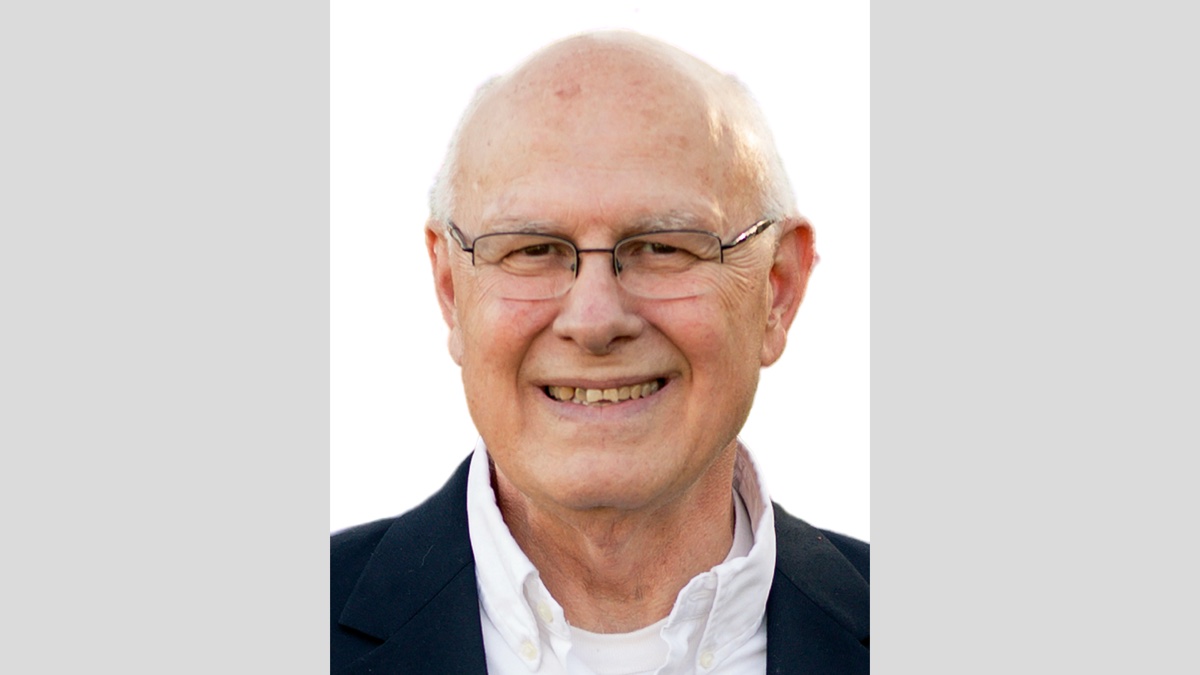


By Bruce Reeves
Synopsis: Many are confused about the concept of imputation. Bruce examines this subject from a consistent biblical perspective.
It is without apology or hesitancy that Christians proclaim the true grace of God. Peter wrote, “I have written to you briefly, exhorting and testifying that this is the true grace of God. Stand firm in it” (1 Pet. 5:12). The New Testament encourages faithfulness to Christ. It exhorts saints to stand firm in the defense and knowledge of the Lord’s saving grace (Phil. 1:5-7; 2 Pet. 3:18). Not only does our Savior provide forgiveness, but He also transforms us through the renewing of our minds (Rom. 12:1-2). How are we made righteous? Are we declared righteous because God has forgiven us? Alternatively, does Jesus’s perfect life serve as a divine umbrella, hiding us from heaven’s gaze so that God does not see our sins?
We are not saved by earning or meriting our salvation. Such would be impossible for those who have sinned against a holy God. Sin defiles us before His presence and separates us from His fellowship (Isa. 59:1-2). In His love and mercy, our Father offers us hope of eternal life (Eph. 2:4-10; Titus 3:3-7). Yet, the question remains: “How can God receive sinners into His presence?” The gospel declares the Lord to be both “just” and the “justifier” of those who believe in Jesus (John 3:16; Rom. 3:23-26; 5:6-8). Therefore, let us consider the power of Christ’s forgiveness.
Jude warns of “ungodly persons” who “secretly slipped in” among God’s people, having “crept in unnoticed,” to “turn the grace of our God into licentiousness. . .” (Jude 4). Licentiousness refers to behavior that lacks moral restraint and indulges in fleshly lusts. Divine grace leads us to “deny ungodliness and worldly lusts” and to “live soberly, righteously, and godly in the present age” as we anticipate the return of Christ (Titus 2:11-14). New Testament writers frequently warn their readers of those who would abuse grace to justify rebellion against God (Rom. 6:1, 14). Peter cautions against those who attempt to use their freedom in Christ as a “covering for evil” (1 Pet. 2:16). Paul likewise rebukes of those who misuse the liberty of the Lord for satisfying the flesh (Gal. 5:14) and continue taking part in sin (Rom. 6:1). Even those who have been converted can, through their freewill, depart from the Lord and be enslaved again to the bondage of sin (Gal. 2:21; 5:4; Heb. 3:12-14; 10:26-29; 2 Pet. 2:20-22). Many false theories presently disrupting our brethren are regurgitated denominational errors of the past. These concepts are often repackaged in a way that overtakes those who are naive, uninformed, or dissatisfied with the truth. We especially see this among those intent on reshaping the gospel’s message to conform to society rather than transforming the lost.
Often when we think of Calvinism, we focus on the TULIP theory, which we have addressed in previous articles. Whether we are considering Classic Calvinism or moderate/soft Calvinism, the mechanism that makes this theological system work for its proponents is known as “the imputation of the perfect life of Jesus to the believer.” Unfortunately, there are some among our brethren that have failed to see the danger of this doctrine. As a result, they either do not teach about it or warn against it. It is not unusual to see this teaching manifest itself in those who want to expand fellowship on an ecumenical level. Accepting the imputation of the perfect life of Jesus is no small matter.
The triple imputation of Calvinism is as follows:
The transfer of Adam’s sin to all of humanity resulted in total depravity and inability.
The transfer of the sins and guilt of humanity to Christ’s soul on the cross.
The transfer of the personal righteousness of Christ/moral perfection of God to believers.
James Orr presents the Calvinistic interpretation when he says: “The term ‘imputation’ has been used in theology in a threefold sense to denote the judicial acts of God by which the guilt of Adam’s sin is imputed to his posterity; by which the sins of Christ’s people are imputed to Him; and by which the righteousness of Christ is imputed to His people” (“Imputation,” Editor, ISBE, Vol. II, 1462-1463). It is always essential for diligent Bible students to define terms because error redefines biblical terms unbiblically. For example, the word “impute” does not mean “transfer” or “replace.” The Greek word that is translated as “impute” occurs thirty-nine times in the New Testament, and eleven of those are found in Romans 4. The word is an accounting term, meaning “to reckon,” “put to one’s account,” or “credit,” but it does not communicate the concept of transfer.
Despite his Presbyterian background, Albert Barnes correctly commented on the scriptural use of the term “impute:”
I have examined all the passages, and as the result of my examination have come to the conclusion that there is not one in which the word is used in the sense of reckoning or imputing to a man that which does not strictly belong to him; or of charging on him that which ought not to be charged on him as a matter of personal right. The word is never used to denote imputing in the sense of transferring, or of charging that on one, which does not properly belong to him. The same is the case in the New Testament. The word occurs about forty times and in a similar signification. No doctrine of transferring, or of setting over to a man what does not properly belong to him; be it sin or holiness, can be derived, therefore, from this word. Whatever is meant by it here, it evidently is declared that the act of believing is that which is intended, both by Moses and Paul (Barnes, Romans, 96).
Nevertheless, Calvinists argue the very opposite. The Philadelphia Confession of Faith states:
Those whom God effectually calleth, He also freely justifieth. . . not by imputing faith itself, the act of believing, or any other evangelical obedience to them, as their righteousness; but by imputing Christ’s active obedience unto the whole law, and passive obedience in His death for their whole and sole righteousness by faith, which faith they have not of themselves; it is the gift of God.
Calvinist David Landon wrote, “The apostle Paul gives both sides of this exchange in one verse. . . That being ‘made the righteousness of God’ is by the imputation of Christ’s righteousness to us follows from the parallel that Paul draws from Christ being made a sinner. . . Our sins are imputed to Him. In like manner His righteousness is imputed to us” (Landon-Sharp Debate).
S.H. Hall said, “Though we fall short, if we will come into and are faithful till death, all we lack in attaining sinlessness He will supply from His own perfect life. . . Those who do this are complete in Him, because all that they lack is supplied from His perfect life, and because of this can be presented in Christ in the judgment” (Sower, May/June 1986). When brethren become enamored with the teachings of writers such as John MacArthur, John Piper, and Tim Keller, or even the past writings of men such as Ed Fudge, Bruce Edwards, or Arnold Hardin, they often adopt the language, phrases, and slogans that are rooted in unbiblical models and systems regarding. . .
At first, some do not grasp the concepts lying behind the terms and phrases, but it is only a matter of time before they do so. The catalyst for their departure is that they persist in drinking deeply from the wells of false teachers without discernment, which promotes dissatisfaction with the truth of the gospel. When we hear some teaching that God’s personal perfection or Jesus’s perfect life “replaces” or is “laid upon” our unrighteousness, or that the Lord sees Christ’s perfect life instead of our sins, as though we were living under a divine umbrella, we must beware! Some may seek to rationalize such expressions as mere semantics, but this teaching is conceptually false and central to Calvinistic perspectives.
The gospel declares that we are made righteous through divine forgiveness, which occurs by grace through faith, thanks to the death of Christ, the cleansing of His blood, and His resurrection from the dead (Matt. 26:28; Rom. 5:9; 1 Cor. 15:3-4; Eph. 1:3, 7; Heb. 9:26; 1 John 1:7-2:2). One concern regarding the Calvinistic imputation theory is the question of whether one is ever actually made righteous or if God simply looks the other way. The writer of Hebrews declares the sufficiency of the atoning sacrifice of Christ to sanctify us: “By this will we have been sanctified through the offering of the body of Jesus Christ once for all… For by one offering He has perfected for all time those who are sanctified” (Heb. 10:10, 14). The conditions of the gospel do not deny the sufficiency of the death and resurrection of Christ to save us, but rather confess the power of His grace (Acts 2:38; 22:16; Rom. 6:3-4; Gal. 3:26-27; Col. 2:11-13; 1 Pet. 3:21). Peter wrote, “He Himself bore our sins in His own body on the cross, so that we might die to sin and live in righteousness; for by His wounds you were healed” (1 Pet. 2:24).
In defense of Reformed Theology, Charles Hodge states, “So when righteousness is imputed to the believer, he does not thereby become subjectively righteous” (3:145). The doctrine of the transfer of guilt or righteousness portrays justification as an elaborate shell game and has been described by critics as “legal fiction.” In stark contrast, biblical justification by the blood of Christ makes the sinner right with God because his sins have been washed away (1 Pet. 1:18-23; 2 Pet. 1:18-10).
Well-known Calvinistic apologist James R. White comments in his book, The God Who Justifies: “It produces no change in the individual to whom the imputation is made; it simply alters his relation to the law” (White, 114). Calvinists argue that regeneration partially changes one’s depraved nature before one has faith and that the unconditionally elected are irresistibly given the irrevocable gift of faith. Yet, they argue that even the saved continue to be sinfully depraved. So, which is it? Are we still depraved, wretched, spiritually enslaved, and dead as in Romans 7, or have we been freed from the bondage of sin in the transforming grace of God as in Romans 6 and 8? Reformed teachers technically define justification as strictly legal or forensic because of their view of triple imputation. Soft-Calvinists among our brethren have wrongly asserted the imputation of the personal righteousness of Christ to present erroneous views of grace and unity to defend the acceptance of those who are teaching and practicing error, which conflicts with 2 John 9-11.
Matthew 6:33 says, “But seek first His kingdom and His righteousness, and all these things will be added to you.” To argue that this verse speaks of the transfer or replacement of Christ’s personal righteousness to the believer reflects a perspective that violates both the immediate and remote context of Scripture. The righteousness of God in Matthew 6:33 reiterates Jesus’s message of practical discipleship in the Sermon on the Mount (Matt. 5:6, 10, 12, 20). “His righteousness” refers to living in harmony with God’s purpose and teaching.
In Romans 4:1-8, Paul presents the means of our justification as involving the Lord’s forgiveness, the sacrifice of Christ, and the surrender of faith in Jesus. The terms “account” or “impute” are translated as “credited” in the NASB. One’s faith is credited as rightness before God, not another person’s faith. This occurs when God forgives a person of his sins and he obeys the gospel (Rom. 1:5, 16-17; 6:16-17; 16:26; cf. Eph. 2:8-10). Therefore, the apostle references Psalm 32:1-5 as he emphasizes forgiveness. Righteousness is put to our account because our “lawless deeds have been forgiven.” God mercifully forgives our sins by means of Jesus’s sacrifice through the condition of the obedience of faith. The Lord’s righteousness speaks of God’s faithfulness through Christ in making us right with Himself (Rom. 10:3).
Romans 5:10 says, “For if while we were enemies we were reconciled to God through the death of His Son, much more having been reconciled, we shall be saved by His life.” Paul’s point is that the life, death, resurrection, ascension, and glorification of Jesus save us (1 Cor. 15:3-4; Eph. 1:18-21). The “life” in this passage speaks of the “resurrection life” of our Lord (4:24-25; 5:6-8; 8:34; 1 Cor. 15:20-22; Heb. 7:25). Those who appeal to this verse to defend the Calvinistic view of imputation do so despite the context and because of their preconceived notions.
Romans 5:19 says, “For as through one man’s disobedience the many were made sinners, even so through the obedience of the One the many will be made righteous.” Paul neither says that Adam’s sin and guilt were imputed to us, nor that Christ’s perfect obedient life is imputed to us. Rather, he says that sin entered the world through Adam’s one trespass (Rom. 5:12-18). He also teaches that it is through Christ’s obedient act of dying for humanity on the cross that the free-gift of salvation is offered (Rom. 5:19-21; cf. 3:23-26; Phil. 2:6-8; Heb. 5:8-9). Calvinists face a serious problem here. If the argument is made that this affirms an automatic imputation of humanity’s sin to all of Adam’s posterity, how can they escape the logical conclusion of the universal imputation of righteousness to all mankind, resulting in universal salvation?
In Philippians 3:8-10, Paul expresses his desire to “gain Christ, and be found in Him, not having a righteousness which is derived of the Law, but that which is through faith in Christ, the righteousness which comes from God on the basis of faith, that I may know Him. . . .” Advocates of this teaching assume that the phrase “righteousness of God” refers to the transfer of the perfect life of Jesus or moral perfection of God to the believer. However, “the righteousness of God” refers to the condition of being made right with God by His forgiveness through faith due to the Lord’s faithful promises (Rom. 1:1-4; Gal. 3:10-14).
The logical consequence of Calvinistic imputation, despite the protestation of its defenders, is a denial of the sufficiency of Christ’s sacrifice for our justification and sanctification (Heb. 10:10, 14). The logical conclusion of the teaching would allow the believer to continue in sin without God crediting that sin to his account, thus denying personal responsibility (1 Cor. 6:9-11; cf. Ezek. 18:4, 20-32). This view undermines the transformation of God’s grace (Rom. 6:3-4; 12:1-2; 2 Cor. 3:18; 2 Pet. 1:4). God’s grace does not leave us in the enslavement and bondage of sin, but transforms, redeems, and restores us into the image of Christ (Eph. 4:22-24). Therefore, let us praise God for His forgiveness, sacrifice, and renewal.
Barnes, Albert. Barnes’ Notes on the New Testament: Romans. London: Blackie & Son, 1834 Online.
The International Standard Bible Encyclopedia (ISBE). James Orr, General Editor. Chicago, IL: Howard-Severance Company, 1915.
White, James R. The God Who Justifies. Bloomington, MN: Bethany House Publishers, 2007.
Bruce Reeves has labored with the Highway 65 church of Christ in Conway, AR, since 2000. He and his wife, Rachel, have one child. The church website is here. He can be reached here.



By Daniel H. King, Sr.
Synopsis: Being confident of our salvation is possible, but there are some essentials that must enter this equation for us to be able to enjoy such spiritual boldness.
Epaphras, who is one of you, a servant of Christ Jesus, salutes you, always striving for you in his prayers, that you may stand perfect and fully assured in all the will of God (Col. 4:12).
Standing “fully assured” of one’s ultimate deliverance from sin and death is not an automatic response on the part of fallen sinners, even when they have undergone conversion, tried to live faithfully, and dedicated much of their lives to service to God in the church. Many people still live their lives in fear and spiritual uncertainty. Trepidation is not part of God’s plan for us as His people. He wants us to be confident and spiritually bold. As the ancient sage says in Proverbs 28:1, “The righteous are as bold as a lion.” Again, as Paul taught the Christians at Ephesus: “In whom (Christ) we have boldness and access in confidence through our faith in Him” (Eph. 3:12). Faith should result in confidence, but because we are still human and occasionally fail in our efforts to be the person we should be, doubts will often intrude.
Of course, fear and anxiety are an appropriate response about one’s future when one’s life is lived in rebellion against God and His will for us, but it is totally inappropriate when we are doing our level best to serve and please the Lord.
Scripture has a great deal to say to us on this matter. It teaches us plainly that we should not live our lives in trepidation. Rather, we should live life boldly, in the fear of God, but with assurance and confidence that He loves us and very much wants us to enjoy heaven with Him throughout an endless eternity.
Here are a few considerations that should make this situation easier for us to navigate:
The opposite of sincerity, of course, is fakery, religious fraud, and chicanery. There is nothing acceptable about this for the Christian man or woman; our charge is for us to be genuine. That means we must have a genuine faith, nothing feigned, counterfeit or make believe, but real:
But the end of the charge is love out of a pure heart and a good conscience and faith unfeigned (1 Tim. 1:5).
Paul knew that there were people who questioned his sincerity and accused him of being a religious fraudster. Yet, he also knew his own heart well, and therefore responded to their unfair accusations by stating clearly what he saw in himself:
I thank God, whom I serve from my forefathers in a pure conscience, how unceasing is my remembrance of you in my supplications, night and day longing to see you, remembering your tears, that I may be filled with joy; having been reminded of the unfeigned faith that is in you; which dwelt first in your grandmother Lois, and your mother Eunice; and, I am persuaded, in you also. For which cause I put you in remembrance that you stir up the gift of God, which is in you through the laying on of my hands. For God gave us not a spirit of fearfulness; but of power and love and discipline (2 Tim. 1:3-7).
In this text, the apostle encourages Timothy to develop in himself the identical unpretentious faith that he had seen to abide in Paul, reflected in all his actions and attitudes. We also should know our own hearts and be what we need to be, rather than what is alleged about us by our enemies. No one will know our own faults and foibles more intimately that we ourselves, but if our confidence is in the object of our faith, God and Christ, then life can be lived victoriously.
Many things are important, but some are foundational. Nothing is more basic than this. It is obvious that this is true in how many instances there are where Jesus and the apostles cited Scripture and held it in the highest esteem. We should do no less. Respect for God’s word will lead us to conclude that the Holy Bible is the most foundational of all principles of the spiritual life. It should be my “meditation day and night” (Ps. 1:2).
Nothing else compares as to importance in this regard; if our feet are not planted firmly on the word of God, little else will matter regarding our success.
As therefore ye received Christ Jesus the Lord, so walk in him, rooted and built up in him, and established in your faith, even as ye were taught, abounding in thanksgiving (Col. 2:6-7; see Rom. 10:17).
The only original source for information about the person and mission of Jesus is the New Testament, so it should be at the center of our reflections.
Paul exuded the kind of spiritual boldness that all of us should have when we enjoy a relationship with God the Father through His Son Jesus. Said he: “I know Him whom I have believed and am persuaded that he is able to keep that which I have committed to Him until that day” (2 Tim. 1:12). Whatever we have entrusted to Him will be safe for eternity. We can be certain of this.
There is no greater challenge in the present age in which we live than this one. Most people today are living their lives according to their own dictates and desires, giving little consideration to whether God is pleased with the outcome.
It will be recalled that in the age of the Judges, “every man did that which was right in his own eyes” (Judg. 17:6; 21:25). This is the curse of our own time as well. The Lord wants us to do better than that. This is what He has in mind:
To walk worthily of the Lord unto all pleasing, bearing fruit in every good work, and increasing in the knowledge of God (Col. 1:10).
What are we seeking? We must ask ourselves, is it our own concerns or the will of Him who created us and redeemed us at the cross through Jesus Christ?
If then you were raised together with Christ, seek the things that are above, where Christ is, seated on the right hand of God. Set your mind on the things that are above, not on the things that are upon the earth. For you died, and your life is hidden with Christ in God. When Christ, who is our life, shall be manifested, then shall you also with him be manifested in glory (Col. 3:1-4).
We often say that it is human to err. There is a sense in which this is true, but there is also a sense in which this may become a mechanism used as an excuse to cover for our consistent disobedience to the Lord’s will.
It would seem better for us to minimize those faults by owning up to them and admitting them to be faults instead of making excuses. John’s advice is as follows:
But if we walk in the light, as he is in the light, we have fellowship one with another, and the blood of Jesus, His Son, cleanses us from all sin. If we say that we have no sin, we deceive ourselves, and the truth is not in us. If we confess our sins, He is faithful and righteous to forgive us our sins, and to cleanse us from all unrighteousness (1 John 1:7-9).
Confession is not only good for the soul; it is good for one’s spiritual health, rather like admitting that we are sick and going to the doctor to fix the problem. Putting off or avoiding the obvious is never a solution to a problem.
Therefore, confess your sins to one another, and pray for one another, that you may be healed. The supplication of a righteous man avails much in its working (Jas. 5:16)
The Christians of ancient Smyrna were warned of trials to come but assured that if they persisted in the face of fierce opposition, a crown of life awaited them at the end of their spiritual journey: “Be faithful unto death, and I will give you the crown of life” (Rev. 2:10). These words of spiritual encouragement should keep us all motivated to persevere.
This kind of intestinal fortitude is key to “staying with it” firmly to the end of the race: “Wherefore, my beloved brethren, be steadfast, unmovable, always abounding in the work of the Lord, forasmuch as you know that your labor is not vain in the Lord” (1 Cor. 15:58).
Quite often, it is encouragement from others that may be what sustains us; keep our Christian family close; the church needs to be a part of all of our lives: “But exhort one another day by day, so long as it is called today; lest anyone of you be hardened by the deceitfulness of sin: for we are become partakers of Christ, if we hold fast the beginning of our confidence firm unto the end” (Heb. 3:13-14)
In the end, we are all fallen sinners needing the redemption that is in Christ. Most honest folks will admit this readily. Only arrogant people who follow in the footsteps of the ancient Pharisees will say otherwise. Failure to acknowledge this tendency will only curse us to spiritual defeat.
On the other hand, a willingness to be honest with ourselves and with God will put us on the road to heaven:
Now unto him who is able to guard you from stumbling, and to set you before the presence of his glory without blemish in exceeding joy (Jude 1:24).
This is a very bold assertion, admittedly. Is such confidence at all possible? If it was for them, it can be for us also. The God whom we worship and serve is a God of compassion and mercy, forgiveness, and new beginnings. Therefore, ultimate victory is in the hands of our merciful God through Jesus Christ:
The sting of death is sin; and the power of sin is the law: but thanks be to God who gives us the victory through our Lord Jesus Christ (1 Cor. 15:56).
Daniel H. King, Sr. lives in Columbia, TN. He and his wife, Donna, have two children. He has preached for the Locust St. church of Christ in Mt. Pleasant, TN, since 2015. Presently, he is also serving as an elder of the congregation. The church website is here. He can be reached here.


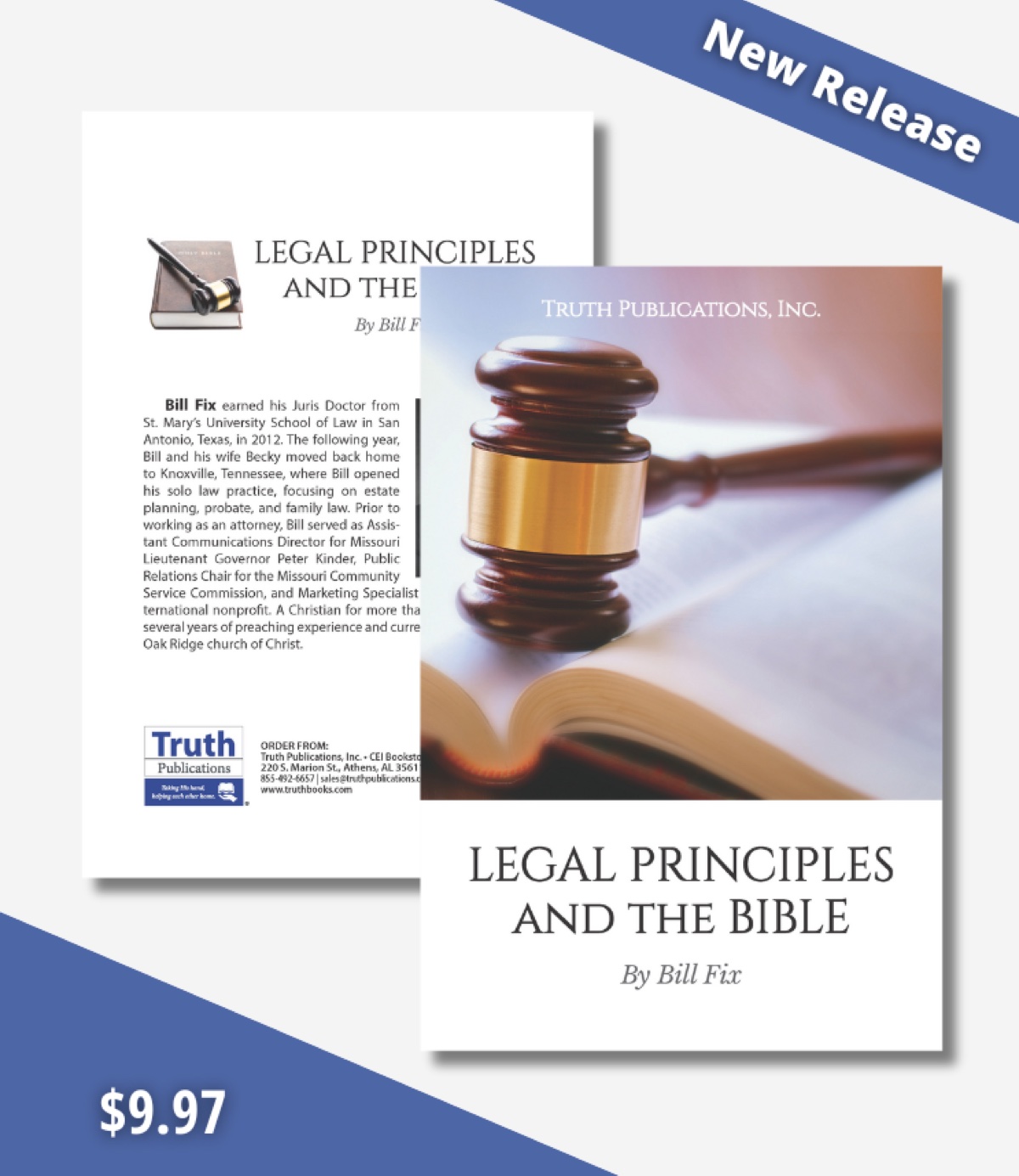
By David Dann
Synopsis: Rather than eliminating conditions man must meet, the grace of God provides the divine terms of salvation to which sinners must respond.
The gospel of Christ is rooted in the grace of God. The inspired penman of Hebrews writes, “We see Jesus, who was made a little lower than the angels, for the suffering of death crowned with glory and honor, that He, by the grace of God, might taste death for everyone” (Heb. 2:9, NKJV). The “grace” (charis) of God is defined as His “goodwill,” “loving-kindness,” or “favor” toward mankind (J.H. Thayer, Greek-English Lexicon, 665-666). God’s “grace” is His disposition of loving-kindness toward sinners, which results in Him offering forgiveness, reconciliation, and eternal life through His Son, rather than simply giving us what we deserve. In the sacrifice of Jesus Christ, God’s grace has been made available to everyone.
The first critical issue is that the grace of God is available to all of mankind. The second critical issue is that the only ones who will truly benefit from the sacrifice of Christ are those who gain access into His grace. The apostle Paul explained this fact to the saints in Rome, saying, “Therefore, having been justified by faith, we have peace with God through our Lord Jesus Christ, through whom also we have access by faith into this grace in which we stand, and rejoice in hope of the glory of God” (Rom. 5:1-2). By faith, sinners must comply with the conditions set by the Lord to enter into His grace. This saving faith is no mere mental assent, nor is it some sort of non-active trust. In order to have access by faith into God’s grace, one must exercise what Paul refers to as “obedience to the faith” (cf. Rom. 1:5; 16:26).
Many have the mistaken idea that God’s grace excludes any conditions of salvation, other than, perhaps, belief in Jesus. Some blatantly claim that salvation is “by grace alone,” or by “grace plus nothing,” in an effort to minimize the need for sinners to do much of anything to receive salvation. However, the Bible teaches that one may enter into God’s grace (Rom. 5:2; Gal. 2:8-9), stand in God’s grace (1 Pet. 5:12), and, if careless, even fall from God’s grace (Gal. 5:4; Heb. 12:15), depending upon whether or not the individual complies with the conditions of the gospel. Please notice how God’s word connects meeting His conditions with having access into His grace.
In contrast to the wicked world around him, the Bible says, “Noah found grace in the eyes of the LORD” (Gen. 6:8). Did this mean that Noah didn’t have to do anything to be saved from the waters of the flood? No, in fact, God informed Noah of the conditions he must meet in order to be delivered from the destruction (vv. 14-16). As the writer of Hebrews states, “By faith Noah, being divinely warned of things not yet seen, moved with godly fear, prepared an ark for the saving of his household, by which he condemned the world and became heir of the righteousness which is according to faith” (Heb. 11:7). Noah had access into God’s grace and received the benefits of God’s grace when he met the conditions which were set by God’s grace.
When the ungrateful Israelites complained in the wilderness, the Bible says, “So the LORD sent fiery serpents among the people, and they bit the people; and many of the people of Israel died. Therefore, the people came to Moses, and said, ‘We have sinned, for we have spoken against the LORD and against you; pray to the LORD that He take away the serpents from us.’ So Moses prayed for the people” (Num. 21:6-7). Once they repented, were there any other conditions the people needed to meet in order to have access into God’s grace for deliverance from the deadly bites of the serpents? “Then the LORD said to Moses, ‘Make a fiery serpent, and set it on a pole; and it shall be that everyone who is bitten, when he looks at it, shall live.’ So Moses made a bronze serpent, and put it on a pole; and so it was, if a serpent had bitten anyone, when he looked at the bronze serpent, he lived” (vv. 8-9). The Israelites had access into God’s grace and received the benefits of God’s grace when they met the conditions which were set by God’s grace.
“Now Naaman, commander of the army of the king of Syria, was a great and honorable man in the eyes of his master, because by him the LORD had given victory to Syria. He was also a mighty man of valor, but a leper” (2 Kings 5:1). Upon learning of the Israelite prophet’s reputation for miraculous healing, “Then Naaman went with his horses and chariot, and he stood at the door of Elisha’s house. And Elisha sent a messenger to him, saying, ‘Go and wash in the Jordan seven times, and your flesh shall be restored to you, and you shall be clean’” (vv. 9-10). God’s grace was available to cleanse Naaman of his incurable disease, but did Naaman have to do anything in order to be cleansed? Eventually, in response to the conditions set forth by Elisha, the Bible says, “So he went down and dipped seven times in the Jordan, according to the saying of the man of God; and his flesh was restored like the flesh of a little child, and he was clean” (v. 14). Naaman had access into God’s grace and received the benefits of God’s grace when he met the conditions which were set by God’s grace.
Sinners who were guilty of crucifying the Son of God heard the apostles in Jerusalem preach the message of the death, burial, and resurrection of Jesus. The Bible says, “Now when they heard this, they were cut to the heart, and said to Peter and the rest of the apostles, ‘Men and brethren, what shall we do?’ Then Peter said to them, ‘Repent, and let every one of you be baptized in the name of Jesus Christ for the remission of sins; and you shall receive the gift of the Holy Spirit’” (Acts 2:37-38). By the grace of God, the remission of sins was made available even to those who were guilty of crucifying the Savior. Did this mean that there was nothing these people needed to do in order to receive salvation? No, in fact, the apostle Peter clearly informed them of the conditions they must meet to have their sins forgiven (v. 38). The Bible goes on to say, “Then those who gladly received his word were baptized; and that day about three thousand souls were added to them” (v. 41). The people on Pentecost had access into God’s grace and received the benefits of God’s grace when they met the conditions which were set by God’s grace.
Paul wrote to those in the city of Ephesus who had been saved, saying, “For by grace you have been saved through faith, and that not of yourselves; it is the gift of God, not of works, lest anyone should boast” (Eph. 2:8-9). Does salvation by grace through faith mean the Ephesians did not have to do anything in order to be saved? When exactly were the Ephesians saved by grace through faith? According to the book of Acts, Paul informed them of the conditions of salvation set by Christ, and, “When they heard this, they were baptized in the name of the Lord Jesus” (Acts 19:5). The Ephesians were saved by God’s grace when they met the conditions for salvation, which were set by God’s grace.
Paul writes, “For the grace of God that brings salvation has appeared to all men” (Titus 2:11). As sinners, there is no way that we could deserve God’s grace and there was nothing man could do to prompt Him to extend His grace to the world. The appearance of God’s grace in the sacrifice of His Son is unconditional. God has extended His grace to the world even though we do not deserve it.
Paul writes, “For by grace you have been saved through faith, and that not of yourselves; it is the gift of God, not of works, lest anyone should boast” (Eph. 2:8-9). Salvation by grace through faith has nothing to do with earning it. Noah did not earn salvation in the flood when he complied with God’s conditions by faith in building the ark. The Israelites did not earn their healing when they complied with God’s conditions by faith in looking at the bronze serpent. Naaman did not earn his cleansing when he complied with God’s conditions by faith in dipping seven times in the Jordan. The people on Pentecost did not earn the remission of sins when they complied with God’s conditions by faith in repenting and being baptized. Sinners can never earn their way into the grace of God.
The grace of our loving God is clearly seen in the fact that He has placed it within the reach of each of us to comply with the conditions He has set for salvation. Instead of the Lord making it impossible for guilty sinners to be forgiven, Mark records, “He said to them, ‘Go into all the world and preach the gospel to every creature. He who believes and is baptized will be saved; but he who does not believe will be condemned’” (Mark 16:15-16). Sinners will not automatically be saved by God’s grace. At the same time, sinners have not been tasked with doing the impossible in order to be saved. Whether they are outside of Christ, or already children of God, the Lord sets forth straightforward and attainable terms that sinners must meet in order to have fellowship with Him (cf. Acts 8:22; 1 John 1:9). The simple, reasonable, and attainable conditions of salvation serve as a demonstration of the bountiful grace of God.
The grace of God is undoubtedly one of the most important concepts revealed in His word. However, it is also one of the most widely misunderstood topics in all of Scripture. The simple truth of the matter is that God has demonstrated His loving-kindness toward lost humanity by sending His Son to die as the only perfect sacrifice which can take away our sins. Whether we benefit from this amazing display of divine grace depends on our willingness to come to Him by faith and comply with the conditions that He has set forth in the gospel.
Thayer, Joseph Henry. A Greek-English Lexicon of the New Testament. New York: Harper & Brothers., 1889; Peabody, MA: Hendrickson, 1999.
After having worked with churches in Indiana, Canada, Florida, Texas, and Kentucky, David Dann moved to the Athens, Georgia area in August 2021 to work with the recently formed University church of Christ. He and his wife, Cynthia, have been blessed with six children. The church website is here. He can be reached here.



By Ron Halbrook
Synopsis: Every generation of saints must fight the good fight of faith by reaffirming the truth as revealed in the New Testament in the face of repeated departures from the truth.
Judges 2:7 and 10 record the victories of God’s people, followed by the disappointing failures of the next generation:
And the people served the LORD all the days of Joshua, and all the days of the elders that outlived Joshua, who had seen all the great works of the LORD, that He did for Israel (v. 7).
And also all that generation were gathered unto their fathers: and there arose another generation after them, which knew not the LORD, nor yet the works which He had done for Israel (v. 10).
The war between God and Satan for the souls of men moves in cycles as generations come and go. Lessons learned from past victories for truth seem hard to retain as Satan fights on many fronts. Every sin and false doctrine appeal to the lust of the flesh, the lust of the eyes, and the pride of life as the effective weapons of Satan’s warfare (1 John 2:16). God’s word stands constant, true, and indestructible, but every soul and every generation must learn and take its lessons to heart.
Christians must be faithful students of the word of God because Satan is ceaseless in his assaults to divert us from the truth we have learned. Paul made many converts to Christ in the wicked environs of Corinth because God told him in a vision that many hearts were prepared to serve Him (Acts 18:10). Yet, a few years later, it was necessary for Paul to write two lengthy letters dealing with sins and false doctrines which were deceiving these saints. Countering Satan’s tactics and weapons, Paul penned 2 Corinthians 10:3-5, which says:
For though we walk in the flesh, we do not war after the flesh: (For the weapons of our warfare are not carnal, but mighty through God to the pulling down of strongholds;) Casting down imaginations, and every high thing that exalteth itself against the knowledge of God, and bringing into captivity every thought to the obedience of Christ.
Knowing the nature of this warfare is repetitive, Peter affirmed the indestructibility of God’s word in one epistle and wrote another one emphasizing that saints must be constantly taught, re-taught, and reminded of God’s truth:
For all flesh is as grass, and all the glory of man as the flower of grass. The grass withereth, and the flower thereof falleth away: But the word of the Lord endureth for ever. And this is the word which by the gospel is preached unto you (1 Pet. 1:24-25).
Wherefore I will not be negligent to put you always in remembrance of these things, though ye know them, and be established in the present truth. Yea, I think it meet, as long as I am in this tabernacle, to stir you up by putting you in remembrance; Knowing that shortly I must put off this my tabernacle, even as our Lord Jesus Christ hath shewed me. Moreover I will endeavour that ye may be able after my decease to have these things always in remembrance (2 Pet. 1:12-15).
Ye therefore, beloved, seeing ye know these things before, beware lest ye also, being led away with the error of the wicked, fall from your own stedfastness. But grow in grace, and in the knowledge of our Lord and Saviour Jesus Christ. To him be glory both now and for ever. Amen (2 Pet. 3:17-18).
Here we are, long after the decease of the New Testament writers, needing constant reminders of everything they revealed and recorded! Well does an anonymous poem say,
Truth never dies. The ages come and go.
The mountains wear away, the stars retire.
Destruction lays earth’s mighty cities low;
And empires, states and dynasties expire;
But caught and handed onward by the wise,
Truth never dies.
The book of Acts records the rapid and exhilarating spread of the gospel, despite the hostile resistance of entrenched Jewish authorities and their minions. Major portions of the New Testament were written to counter Satan’s repeated efforts to reintroduce the errors of traditional Judaism among the saints—including the books of Romans, Galatians, and Hebrews.
Beginning in Acts 10, we read the exciting accounts of multitudes of Gentiles being converted in an ever-widening expanse of the Mediterranean world. Satan then harnessed the immoral, political, and false religious powers of the mighty Roman Empire in an effort to both seduce and eradicate the church. The policy and demand of emperor worship provided a systematic means to identify and eliminate every Christian in Rome’s domain. The book of Revelation was written to prepare the saints to endure this onslaught, which would cost many of them their lives under Domitian and succeeding emperors (Rev. 2:10). Satan even penetrated the churches with false teachers advocating compromise with immorality and idolatry in an effort to disarm them (Rev. 2:6, 14-15, 20). He also sought to spread a spirit of complacency among the saints to neuter them (Rev. 2:5; 3:16). Seeing Christianity spread in spite of persecution, Constantine legalized it in AD 313 and the empire fell in AD 476.
Over the centuries, many steps of apostasy resulted in the gradual formation of the Roman Catholic religion until widespread rebellion against its many corruptions produced the Reformation of the 1400s-1500s.
By God’s providence, the Protestant Reformation put the Bible back into the hands of the common man. In time, a plethora of denominations formed with a great diversity of doctrines, practices, and organizations. Reacting against the Catholic concept of meritorious works, the denominations shared various explanations of salvation by grace alone and faith alone, which excluded obedience from the conditions of pardon. This distorted view of “grace” and “faith” releases man from the necessity of following the pattern of truth God revealed for the church’s doctrinal stand, organization, mission, and worship, and for marriage, morals, and the daily life of Christians. For instance, John Calvin taught God’s grace imputes the obedience of Jesus to the believer to cover all sins. Others have proposed continuous cleansing.
Widespread frustration with the contradictory doctrines and the divisions among denominations provoked many souls to search for the original teaching of Christ in the New Testament regarding the conditions of pardon, the church, and daily life. They soon discovered that the New Testament revealed the pattern of truth about the will of the Father, the Son, and the Holy Spirit; the life and work of Jesus Christ; the scheme of redemption; the conditions of pardon; the graces of godliness to be developed in our lives; the origin, work, worship, organization, doctrine, and discipline of the church; and the hope of eternal life. In a chapter discussing in detail the proper organization of local churches, Paul said, “These things write I unto thee. . . that thou mayest know how thou oughtest to behave thyself in the house of God” (1 Tim. 3:14-15). The pattern of teaching proclaimed by apostolic men preserved in the New Testament was all-sufficient to accomplish God’s purpose, and binding for all ages (2 Tim. 3:16-17; 2 Pet. 1:12-15).
A Presbyterian preacher named Thomas Campbell (1763-1854), seeking to go back to the New Testament, said in 1809 the Church of Christ will resume its “original unity, peace, and purity” if we “adopt the practice of the primitive church, expressly exhibited in the New Testament” (Declaration and Address). After affirming in 1808, “Where the Bible speaks, we speak; where the Bible is silent, we are silent,” Campbell explained that he would give up infant baptism if convinced the New Testament did not authorize it. In 1812, having in view Acts 2:38 and 8:35-38, Alexander Campbell (1788-1866) asked Baptist Mathias Luce to baptize them “precisely according to the pattern given in the New Testament. . . as there was no account of any of the first converts being called upon to give what is called ‘a religious experience,’ this modern custom should be omitted, and that the candidates should be admitted on the simple confession that ‘Jesus is the Son of God’” (Richardson, Memoirs of Alexander Campbell, I:398).
In discussing “A Restoration of the Ancient Order of Things,” Alexander Campbell wrote in 1825 that before inquiring “what was the ancient order of worship. . . it may be expedient to consider whether there be any divinely authorized worship in the assembly of the saints.” He saw two irreconcilable answers: “Either there is a divinely authorized order of Christian worship in Christian assemblies, or there is not.” If there is not, he explained that this leads to an absurd conclusion: “There can be no disorder in the Christian assembly, there can be no error in the acts of social worship; there can be no innovation in the department of observances; there can be no transgression of the laws of the King” (Christian Baptist, Vol. 2, pp. 239-243).
Multitudes were converted to the original gospel in the 1800s, but a new generation during the period 1875-1925 began returning to denominational concepts regarding the work, worship, and organization of the church. They gradually departed from the New Testament pattern by accepting instrumental music into the worship, by centralizing the work of churches through missionary and benevolent institutions, and eventually compromising on baptism as a condition of salvation. This created an atmosphere that bred worldliness in the members and fellowship with denominational bodies. The pattern concept established by direct command, approved example, and necessary implication was eroded, and then openly repudiated by some. Denominational concepts of “faith” and “grace” were accepted. The result was the formation of Christian Churches and the more liberal Disciples of Christ denomination.
This division left faithful brethren in the minority, but they zealously preached the gospel and grew by leaps and bounds in the first half of the twentieth century. In the late 1930s, James DeForest Murch of the Christian Church and Claude F. Witty of the churches of Christ spearheaded a unity movement. The focus was not on finding and following the Bible pattern of truth, but on fellowship in spite of differences. Emphasizing the pattern of truth was considered “legalism” and denominational concepts of “grace” and “faith” were promoted. The movement failed but infected many brethren with these loose concepts which undermine the Bible pattern.
In the 1950s-60s, churches of Christ suffered another division as brethren again gradually departed from the biblical pattern by centralizing the work of churches through human institutions and embracing the social gospel. Carl Ketcherside and Leroy Garrett advocated unity-in-doctrinal-diversity in the mid-1960s-70s by labeling appeals to the Bible pattern as “legalism,” by denying the Bible teaches by command, example, and implication, and by appealing to denominational concepts of “grace” and “unity.” They eventually embraced the denominational concept of ecumenicism, setting aside the necessity of baptism for remission of sins. Edward Fudge, Bruce Edwards, and many others fell under these influences. This false unity tolerated instrumental music in worship, premillennialism, institutionalism, and other errors. Some claimed baptism washes away sins past, present, and future. Satan enhanced the power of these errors by infecting American society with rebellion against all absolute standards of truth.
Now, another generation of preachers among us is saying things which express distrust of the pattern nature of truth, even casting doubt on whether the Bible teaches by command, example, and implication. They complain of “legalism” while advancing denominational concepts of “grace” and “unity.” This well-worn path always leads away from New Testament Christianity.
These errors that lead away from God’s pattern of truth need to be refuted again and again as new generations arise. Let us pass forward the torch of truth. Truth never dies!
Ron Halbrook has labored with the Hebron Lane church of Christ in Shepherdsville, KY, since 1997, concurrently alongside Danny Linden. Ron and Donna have three children and eleven grandchildren. The church website is here He can be reached here.


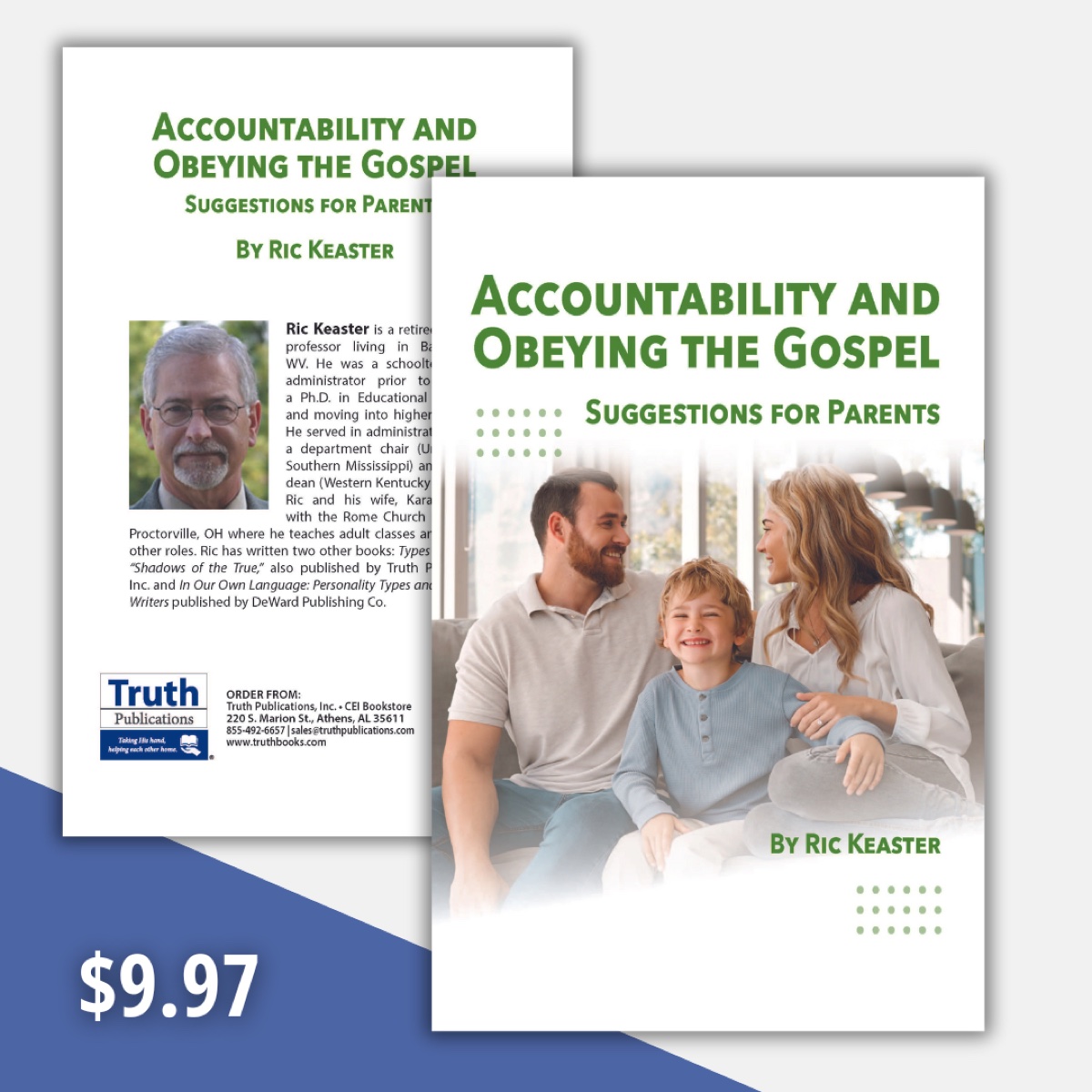
By Kyle Pope
Synopsis: Much of the discussion concerning faith and works is born out of extreme views that arose in the past. What teachings and events led us to the battles that continue today? Can the simplicity of Scripture cut through this chaos and unite believers in purity and truth?
None of us are born in a vacuum. All are influenced by circumstances, conditions, and concepts that came before us. Whether or not we even realize it, these things shape how we view ourselves, the world, and our faith. This is especially true in the ongoing conflict that rages between the role of faith and works in our acceptance of salvation in Christ. Like the two sides in a Hatfield-McCoy feud, whose disputants no longer even remember what started it in the first place, if we are not careful, we may thoughtlessly join sides unable to conceive of a time before shots were being fired. In this feud, the problem does not rest in what God revealed in Scripture, but in extremes that were promoted long before our time.
The Bible never taught a works-based salvation, but history records the slow development of this extreme from small distortions of biblical principles that grew into sweeping waves of apostasy. This can be seen in two systems of religious thought that arose: sacerdotalism and sacramentalism.
Sacerdotalism is the belief that God’s grace is distributed through the mediation of the church and its leaders. The Bible teaches us to respect those who lead us in the church (1 Thess. 5:12-13), and that we should use our gifts to serve others as stewards of God’s grace (1 Pet. 4:10), but in Christ, all are priests (1 Pet. 2:5). In church history, however, men gradually began to believe that there was a special class of priests through whom grace and forgiveness were administered. This essentially made salvation something dependent upon human action. Tied with this was the belief in sacramentalism.
Sacramentalism is the belief that God’s grace is bestowed through specific acts men perform. Roman Catholicism came to teach seven sacraments: Baptism, Confirmation, the Eucharist, Penance, Extreme Unction, Holy Orders, and Matrimony (Council of Trent, Session Seven, “Decree on the Sacraments,” March 3, 1547). The Bible certainly teaches the necessity of baptism and repentance for salvation (1 Pet. 3:21; Luke 13:3) and commands observance of the Lord’s Supper in faithful worship of God (1 Cor. 11:25), but it does not teach that these acts merit or dispense an additional infusion of grace to those who perform them.
These false concepts allowed for the growth of many practices that promoted this works-based view of salvation. For example, there are examples throughout history of baptism being forced upon people. As early as AD 418 on the Spanish island of Minorca, there may be evidence of Jews on the island being forced to be baptized (Epistula Severi). The Bible teaches the necessity of baptism and faith (Mark 16:16). Baptism without faith is useless. Unfortunately, compulsory baptism happened many times throughout the centuries. Beginning in 614, the Byzantine emperor Heraclius forbade the practice of Judaism, leading kings under his influence to exile or force the conversion of practicing Jews. Around 820, Agobard, the Roman Catholic Archbishop of Lyons, forced the baptism of Jewish children who had not been sent away by their parents (Epistola de baptismo Judaicorum). During the crusades, Jews in the Rhineland were forced to be baptized. In England, on September 3, 1189, when Richard I (“the Lionheart”) was coronated, Benedict, a moneylender and leader of the Jewish community of York, was forcibly baptized (even though he recanted the following day). This view that an act performed by man, even in the absence of faith, produced salvation fueled a works-based extreme view.
Perhaps the most egregious practice motivated by this view was the sale of indulgences, which sparked the Protestant Reformation. False doctrines are often built on other false doctrines, and so it was with this one. The Bible teaches only two eternal fates: eternal life or everlasting punishment (Matt. 25:46). Nevertheless, at the Second Council of Lyon in 1274, Roman Catholicism formally began to teach that an intermediate state of “purgatory” exists for those with sins that still need to be purged through punishment. The Bible does not teach that, but error compounded upon itself. So, what should a person do who wants to avoid this purgatorial punishment? Obtain an indulgence! If priests hold the power to bestow grace, then they held the power to command acts of penance (such as alms, fasting, pilgrimages, or self-flagellation) in order to extend an indulgence forgiving the person of these sins. In 1095, pope Urban II at the Council of Clermont claimed to offer forgiveness of sins to those who would participate in the Crusades. Drawing from concepts that were present in rabbinical Judaism, Catholicism began teaching that the righteousness of Christ (together with the good deeds of the saints) were stored up in a “treasury of merits” which could be drawn from in order to obtain forgiveness in the form of an indulgence. In 1515, pope Leo X issued a papal bull commissioning the sale of indulgences in order to raise money for the building of St. Peter’s Basilica. A Dominican friar named Johann Tetzel, who was already selling indulgences throughout Germany, began selling indulgences to fund this project. In a sermon he preached in 1517, he claimed:
You should know that all who confess and in penance put alms into the coffer according to the counsel of the confessor, will obtain complete remission of all their sins. . . . You may have letters which let you have, once in life and in the hour of death full remission of the punishment which belongs to sin (Sermon on Indulgences).
The wording on these “letters” of indulgence claimed to absolve the bearer “from all sins, transgressions, and excesses, how enormous soever they be.” Reportedly, Tetzel once sold an indulgence to a nobleman in Leipzig for a future sin, after which the man proceeded to beat and rob him, claiming that was the future sin. When the Duke of the region learned about the incident, the nobleman was not charged; after all, he had purchased forgiveness. That is certainly not what the Bible teaches! It is hard to imagine a more grievous distortion of Scripture, but this was the works-based extreme that set the stage for the Protestant Reformation.
It was into this extreme world of proscribed acts of penance, forced baptisms, and the sale of indulgences that another extreme developed in reaction to those distortions. Frightened by a lightning strike that hit near him, in 1505, Martin Luther left a worldly affluent life to become an Augustinian monk. Practicing every act of penance he could (including self-flagellation), Luther never felt any sense of confidence in his salvation until he began to lecture on the Psalms, Hebrews, Romans, and Galatians at the University of Wittenberg. Luther would come to reject a works-based view of salvation and write instead:
. . .Faith alone justifies and fulfils the Law, for it fetches the Spirit from Christ’s merit. The Spirit, however, creates a willing and unconstrained heart, such as the Law requires; and then good works spring directly from faith (“Preface to Romans”).
Notice the pendulum shift here. From a works-based view that left him no peace, he would go to the opposite extreme and say it is “faith alone.” Yes, man must do good, but even that comes because the Spirit “creates a willing heart” within a person.
Luther would properly reject the false doctrine that forgiveness could be purchased. In 1517, he put in writing a list of ninety-five challenges to this practice seeking a formal discussion of the biblical authority for the selling of indulgences as practiced by Tetzel. This eventually led to his excommunication from the Roman Catholic Church.
Luther’s frustration over the works-based teachings of his own day led him to accept some concepts which were equally extreme. For Luther and other reformers, as noted above, faith itself was not something man could do. He wrote:
Faith is a work of God in us, which changes us and brings us to birth anew from God (cf. John 1). It kills the old Adam, makes us completely different people in heart, mind, senses, and all our powers, and brings the Holy Spirit with it. . . . Pray God that He may create faith in you; otherwise you will be without faith forever and aye, no matter what you may plan and do (ibid.).
Rejecting the extreme view that deeds of penance draw from the “treasury of merits,” Luther accepted the equally false concept of imputed righteousness. This view argued that since Adam’s sin was believed to be imputed to us, only if Christ’s righteous deeds are literally imputed to us—not merely by forgiveness but in actual imputation, can we be saved. He wrote:
Lord Jesus, You are my righteousness; I am Your sin. You took on You what was mine, yet set on me what was Yours. You became what You were not, that I might become what I was not (Correspondence).
Do you now see how faith justifies without works? Sin lingers in us, and God hates sin. A transfusion of righteousness, therefore, becomes vitally necessary. This transfusion of righteousness we obtain from Christ because we believe in Him (Commentary on Galatians 3:6).
Neither sin nor righteousness can be literally imputed to another person (Ezek. 18:20). Jesus represented our sin on the cross (2 Cor. 5:21), but did not literally become our sin! His blood redeems our sin because He was “a lamb without blemish and without spot” (1 Pet. 1:8-9). He is our righteousness by paying our debt of sin, but His righteous deeds are not imputed to us—they pay the price for our sin, making us right and forgiven before Him.
In fairness, Luther and many of the other reformers believed that a true faith is an obedient faith. Yet, they set the stage for the extreme reaction in their successors who affirm “once saved, always saved” theories, considers obedience “legalism,” and teaches that human beings are incapable of accepting the gospel without a miraculous operation of the Holy Spirit.
Consider an example of this, in one man’s explanation of what Paul means by speaking of the alien sinner being “dead in trespasses and sins” (Eph. 2:1). After rejecting the illustration that the gospel is like a life-guard extending help to a drowning man, Edwin Palmer writes:
The biblical picture… is of a man at the bottom of the ocean in the Marianas trench, more than thirty-five thousand feet deep. The weight of the water on top of him is six tons for every square inch. He has been there for a thousand years and the sharks have eaten his heart. In other words, the man is dead and is totally unable to ask any lifeguard to save him. If he is to be saved, then a miracle must occur. He must be brought back to life and to the surface, and then he can ask the guard to rescue him. That is the picture of the sinner. He is dead in his sins and trespasses (Eph. 2:1, 5). He does not want to be made whole, let alone even know that he should be made whole. He is dead (Edwin H. Palmer, The Five Points of Calvinism).
This is not the “biblical picture,” it is an extreme reaction motivated by an over-reaction to the works-based extremes of Medieval Europe. It imagines that it gives all the glory to God, but in reality, it makes God the cause of man’s sin and unbelief. If God tempts no one (Jas. 1:13-15), and desires the salvation of all men (2 Pet. 3:9) it cannot be that the choice of sin or obedience is wholly up to God—that would be the ultimate temptation to do evil and an absolute desire that some never come to salvation!
The Bible teaches neither of these extremes. It recognizes man’s inability to merit his own forgiveness, but emphasizes the necessity of obedience in order to accept God’s grace unto salvation. Paul taught that all “fall short of the glory of God,” but justification comes through “the redemption that is in Christ Jesus” (Rom. 3:23-24). This redemption comes not through “silver or gold” but only through “the precious blood of Christ” (1 Pet. 1:18-19). One accepts this gracious sacrifice for sins by “obedience” to the gospel—the “power of God unto salvation” (2 Cor. 9:13; Rom. 1:16-17). Sinners can hear this message and accept it or reject it. Paul said to the Ephesians: “In Him you also trusted, after you heard the word of truth, the gospel of your salvation” (Eph. 1:13a). God expects our obedience to Him in Christ—Jesus is, “the author of eternal salvation to all who obey Him” (Heb. 5:9). Our obedience shows our love to Him (John 14:15), but obedience does not merit His grace—it is what we were created to do (Eph. 2:4-10); it is our duty (Luke 17:7-10). This is not complicated. It is simple, but it is what the inspired word of God teaches.
The Bible never taught a merit-based salvation, nor a salvation that involves no human choice, response, or obedience to the commands of God. Sadly, much of the ongoing battle over faith and works comes from this clash between two unscriptural positions promoted long ago. If souls today would acquire the wisdom to handle aright the word of truth and muster the courage to look beyond these false and futile bulwarks of the past and stand on God’s word alone, this battle would end, and believers could serve Christ in unity and truth.
Kyle Pope preaches for the Vestavia church of Christ in Vestavia Hills, AL. He has written several books published by Truth Publications. Go here for more information. The church website is here. He can be reached here.



By Kevin Maxey
Synopsis: A survey of New Testament teaching regarding salvation reveals a puzzling paradox worthy to ponder. In Ephesians 2:8-9, the apostle Paul affirms, “For by grace you have been saved through faith, and that not of yourselves; it is the gift of God, not of works, lest anyone should boast.” However, another inspired New Testament writer, James, asserts, “faith without works is dead… man is justified by works, and not by faith only” (Jas. 2:20-24).
Ponder the paradox. How can we be saved, “not of works” in one passage while being “justified by works” in another? How can we be saved “through faith” in one verse and not justified by “faith only” in another? Do these passages contradict? These verses present Bible students with a perplexing theological paradox. This study will ponder the paradox presented in Scripture between the roles of faith and works as they relate to the eternally significant subject of salvation.
A paradox, according to Oxford Languages, is “a seemingly absurd or self-contradictory statement or proposition that when investigated or explained may prove to be well founded or true” (OxfordReference.com). Reflect on the following implications of this definition.
Notice, according to this definition, the true meaning of paradox is not synonymous with contradiction. When something is a paradox, it does not automatically mean its “absurd” statements contradict or are false. The paradox only means they “seem” to contradict. Understanding and applying this paradox definition to biblical interpretation, especially in the matter of faith and works, will lead to more accurate Bible study.
Why does an author communicate using a paradox in the first place? He makes a bold, seemingly contradictory statement to capture the attention of his audience. A paradox statement invites the audience to listen and think further.
The paradox captures immediate attention that inspires further inquiry. How could this statement be so? It leads the student to embark on a journey of inquisition, asking questions about definitions, sentence structure, historical context, cultural influences, speaker intent, and uncovering all that has been revealed about the subject.
Upon closer investigation, observant students often discover a deeper truth lying underneath the initially presumed irreconcilable contradiction. Curious inquiry leads to increased awareness of truth, which is often the intended goal of the one communicating the paradox. Instead of incessantly debating extreme interpretations, honest seekers will find truth in learning from “both sides” of the paradox.
Returning to our initial question about faith and works, I propose we look at these “seemingly contradictory” statements about salvation through the lens of literary paradox. Instead of making this another quickly dismissed article in the “faith and works” debate, I invite sincere truth seekers to consider this perplexing subject from a different perspective of paradox. We know Scripture does not contradict. All Scripture is true and God-breathed (2 Tim. 2:16-17). God cannot lie (Heb. 6:18). His will never fails. His word does not return void (Isa. 55:11). What, then, are we to conclude? The Holy Spirit, in this matter of faith and works, is presenting a theological paradox. Ponder the paradox.
The use of paradox in communication is not uncommon. Intentional observation reveals the prominent use of paradox in our communication culture. Consider the following examples from found in literature, philosophy, everyday speech, songs, and film.
Ponder the frequent presence of paradox in literature. In order to engage readers and communicate compelling thought, writers commonly employ a variety of literary devices such as allegory, hyperbole, metaphor, alliteration, irony, and personification. Paradox is one such literary device. Tomczyk and Janovsky write:
In literature, a paradox is a device used to force the reader to consider a statement or idea more deeply or critically than at face value. It is a statement or idea that seems illogical, but upon further analysis, does make sense (Study.com).
In Hamlet, Shakespeare wrote, “I must be cruel to be kind.” In his book, Tale of Two Cities, Charles Dickens wrote, “It was the best of times, it was the worst of times.” George Orwell, in his book, 1984, wrote, “War is peace. Freedom is slavery. Ignorance is strength.”
Shabo adds:
Paradoxes in literature involve statements or plot points that seem self-contradictory but contain striking elements of truth or insight. A literary paradox can serve many purposes, such as conveying humor, absurdity, philosophical wisdom, or societal critique. Literary paradoxes often underscore a text’s core message (Scribbr.com).
These literary examples reveal that authors use paradox to grab attention, inspire inquiry, and point to deeper truths.
Deep thinkers in history communicate complex philosophical thought using paradox. “I know that I know nothing” (Socrates). “This sentence is false” (The Liar Paradox). “The road up and the road down are one and the same” (Heraclitus). “That which is, is not, that which is not, is” (Parmenides). “He who knows does not speak. He who speaks does not know” (Lau Tzu). “The swiftest traveler is he who goes afoot” (Henry David Thoreau).
The use of paradox is not limited to the academic arena. Paradoxical statements are common in the culture of modern speech. Consider how often you have said or heard these paradoxical sayings: “Never say never.” “Youth is wasted on the young.” “It’s the beginning of the end.” “You need money to make money.” “The only rule is there are no rules.” “Less is more.” “Fight fire with fire.” Notice how these statements fit our definition. They are “seemingly absurd or self-contradictory” statements that contain truth. At first, they sound like a contradiction, but upon closer examination, they reveal principles of truth.
Catchy tunes often contain lyrical paradox. “I can’t live with our without you” (U2). “You’re hot when you’re cold. You’re yes, then you’re no. You’re wrong when it’s right” (Katy Perry). “You can check out any time you like but you can never leave” (Eagles). “I close my eyes so I can see. Shut the door so I can leave” (Fugazi). “I was so much older then. I’m younger than that now” (Bob Dylan). These seemingly contradictory lyrics capture attention, causing deeper reflections of truth.
“I’m going to make him an offer he can’t refuse” (The Godfather). “Every man dies. Not every man really lives” (Braveheart). “The only winning move is not to play” (War Games). “You have to die a few times before you can really live” (The Curious Case of Benjamin Buttons). “The more you try to forget something, the more you think about it” (Eternal Sunshine of the Spotless Mind).
These examples from literature, philosophy, everyday speech, songs, and film demonstrate frequent and legitimate use of paradox secures attention, inspires inquiry, invites investigation, and reveals deeper truth.
Now that we have established the legitimate significance and prevalence of paradox usages in both ancient and modern communication, what can we learn about the use of paradox in Scripture?
The Scriptures are filled with statements of paradox. “There is one who scatters, yet increases more” (Prov. 11:24). “Humble yourselves in the sight of the Lord, and He will lift you up” (Jas. 4:10). “When I am weak, then I am strong” (2 Cor. 12:10). “Whatever gain I had, I counted as loss for the sake of Christ” (Phil. 3:7). “Exalt the humble and humble the exalted” (Ezek. 21:26).
Jesus frequently makes statements of paradox. “The greatest among you will be your servant” (Matt. 23:11). “Whoever finds his life will lose it, and whoever loses his life for My sake will find it” (Matt. 16:25). “Blessed (happy) are those who mourn” (Matt. 5:4). Hansen observes, “Jesus was often intentionally paradoxical. His open-ended sermons sent listeners away scratching their heads, with dangling loose ends for them to tie together” (PreachingToday.com). Jesus taught using paradox.
The previous examples show paradoxical thought found in the same verse. A broader look at Scripture presents verses, when placed side by side, that “seemingly appear” to contradict each other. Biblical wisdom literature states, “Answer not a fool according to his folly, lest you be like him yourself” (Prov. 26:4), but the very next verse instructs, “Answer a fool according to his folly, lest he be wise in his own eyes” (Prov. 26:5). Are we to answer the fool or not? Which is it?
On one hand, Jesus says, “Judge not, that you be not judged” (Matt. 7:1) but elsewhere He directs “Judge with righteous judgment” (John 7:24). Are we supposed to judge or not? Which is it? Consider Jesus’s statements, “I did not come to judge the world” (John 12:47) and “For judgment I have come into this world” (John 9:39). Did Jesus come to judge or not? Which is it? “The way is hard that leads to life” (Matt. 7:14) and “My yoke is easy, and my burden is light” (Matt. 11:30). Is the Christian walk hard or light? Which is it?
As we previously learned, these paradoxes presented in Scripture are not false, they awake our attention, inspire inquiry, invite investigation, and reveal deeper truths when we look beneath the surface at definitions, context, and the whole of God’s revelation.
When it comes to answering the fool, both responses are true. There are times when we must answer and silence the fool, and there are other times when wisdom demands we leave the fool be and we don’t answer or engage in his folly.
Do we judge others or not? Yes, and no. In the context of Matthew 7 the hypocritical judge is forbidden to judge others. Yet, when we are seeking the will of God, we must constantly make righteous judgments.
Did Jesus come to judge or not? Yes, and no. Jesus did not ultimately come to the world in order to judge the world. The world was already under condemnation. He does not want to condemn the world. He came to save the world! Notwithstanding, Jesus ultimately will sit in judgment on those in the world who rejected Him when He returns.
Paradoxes presented in Scripture are not false. They awake our attention, inspire inquiry, invite investigation, and reveal truth.
Zooming out even further, Henry Clay Trumbull, in his book Practical Paradoxes, argues that the whole of the Christian life is a paradox:
The law of the Christian life is a paradox. It is made up of seeming contradictions. All its teachings are contrary to the common opinions of man. According to [God], giving is getting; scattering is gaining; holding is losing; having nothing is possessing all things; dying is living. It is he who is weak who is strong; it is he who defies danger who avoids it; it is he who loses his life who finds it. Self-interest is promoted by unselfishness; the pleasures of earth are surest to him who disregards them; happiness is found only when it is no longer sought; the clearest sight is of the invisible; things which are not, bring to naught things which are (Trumbull, 9).
When we apply these statements of paradox, our whole life will ultimately become a walking paradox.
Our study of paradox reveals God intentionally communicates statements that appear to contradict in order to grab our attention, inspire inquiry, invite investigation, and reveal truth. Returning to our salvation question at hand, we ask, what about the paradox of faith and works?
“For God so loved the world that He gave His only begotten Son, that whoever believes in Him should not perish but have everlasting life” (John 3:16). “He who believes in the Son has everlasting life; and he who does not believe the Son shall not see life, but the wrath of God abides on him” (John 3:36). “Believe on the Lord Jesus Christ, and you will be saved, you and your household” (Acts 16:31).
“If you confess with your mouth the Lord Jesus and believe in your heart that God has raised Him from the dead, you will be saved. For with the heart, one believes unto righteousness, and with the mouth confession is made unto salvation” (Rom. 10:9-10). “For by grace you have been saved through faith, and that not of yourselves; it is the gift of God, not of works, lest anyone should boast” (Eph. 2:8-9). “Without faith it is impossible to please Him, for he who comes to God must believe that He is, and that He is a rewarder of those who diligently seek Him” (Heb. 11:6).
Salvation requires doing God’s will. “Not everyone who says to Me, ‘Lord, Lord,’ shall enter the kingdom of heaven, but he who does the will of My Father in heaven” (Matt. 7:21). Salvation requires keeping commandments.”If you love Me, keep My commandments” (John 14:15). Salvation requires repentance. “Unless you repent you will all likewise perish” (Luke 13:3, 5). Salvation requires baptism. “He who believes and is baptized will be saved” (Mark 16:16). “Now, why are you waiting? Arise and be baptized, and wash away your sins, calling on the name of the Lord” (Acts 22:16). Salvation requires doing something, which in Acts 2:37-38 includes repentance and baptism. “Now when they heard this, they were cut to the heart, and said to Peter and the rest of the apostles, ‘Men and brethren, what shall we do?’ Then Peter said to them, ‘Repent, and let every one of you be baptized in the name of Jesus Christ for the remission of sins; and you shall receive the gift of the Holy Spirit.’”
How do we reconcile the paradox presented from these verses concerning faith and works? The paradox of faith and works does not contradict or negate the truth of the other. Refuse the temptation of running to one extreme or the other. Ponder the paradox and see that both statements are true. The saved man is one who has a work-filled faith and a faith-filled work.
Paul explains we are saved by faith. No honest man can stand before God and say, “I am saved by my works. I have lived perfectly, and I have earned my way to heaven. I boast in my works.” How arrogant, ridiculous, and absurd. We are saved by grace through faith. Yet, notice what Paul says in the very next verse. “For we are His workmanship, created in Christ Jesus for good works, which God prepared beforehand that we should walk in them” (Eph. 2:10). The saved soul in the complete context of Ephesians 2 is the believer who was created for good works. The soul who is saved by faith in Ephesians 2:8 is the soul who demonstrates his true faith by walking in good works. Faith and works do not contradict. They go together. Both harmonize within God’s glorious will! We are not saved by faith “alone” without works. We are not saved by works “alone” without faith! Ponder the paradox. Notice how the faith-works paradox captured our attention, invited our inquiry, inspired our investigation, and revealed the deeper truth.
Faith only proponents cannot honestly ignore all the New Testament passages that require an obedient human response to the will of God. Similarly, those who emphasize works and obedience cannot honestly dismiss the Scriptures that demand sincere and wholehearted faith! Faith and works are not mutually exclusive. The honest soul understands there is nothing he can do to repay or earn salvation. He receives the free gift of salvation through grace and faith (Rom. 6:23; 5:15-16). Yet, his faith is not empty; instead, it is demonstrated through wholehearted obedient submission to the will of God (Jas. 2:20-24).
May this study of paradox in Scripture, on this issue and others, awaken our attention, inspire our inquiry, invite our investigation, reveal God’s truth, and unite us in harmony with His glorious will.
Hansen, Richard P. “Making the Most of Biblical Paradoxes,” PreachingToday.com. https://www.preachingtoday.com/books/art-and-craft-of-biblical-preaching/style/making-most-of-biblical-paradoxes.html
“Paradox: Definition, Types, & Examples.” Study.com https://study.com/learn/lesson/paradox-in-literature-examples.html.
Shabo, Magedah. “What Is a Paradox? Definition & Examples.” Scribbr.com. May 26, 2024. https://www.scribbr.com/rhetoric/paradox/
Stevenson, Angus and Christine A. Lindberg, eds. New Oxford American Dictionary. 3 ed. Oxford: Oxford University Press, 2010. OxfordReference.com.
Trumbull, Henry Clay. Practical Paradoxes. Philadelphia: John D. Wattles, 1889. Online.
Kevin Maxey has worked with the Port Royal church of Christ in Spring Hill, TN, since 2009.He and his wife, Jennifer, have five children. The church website is here. He can be reached here.


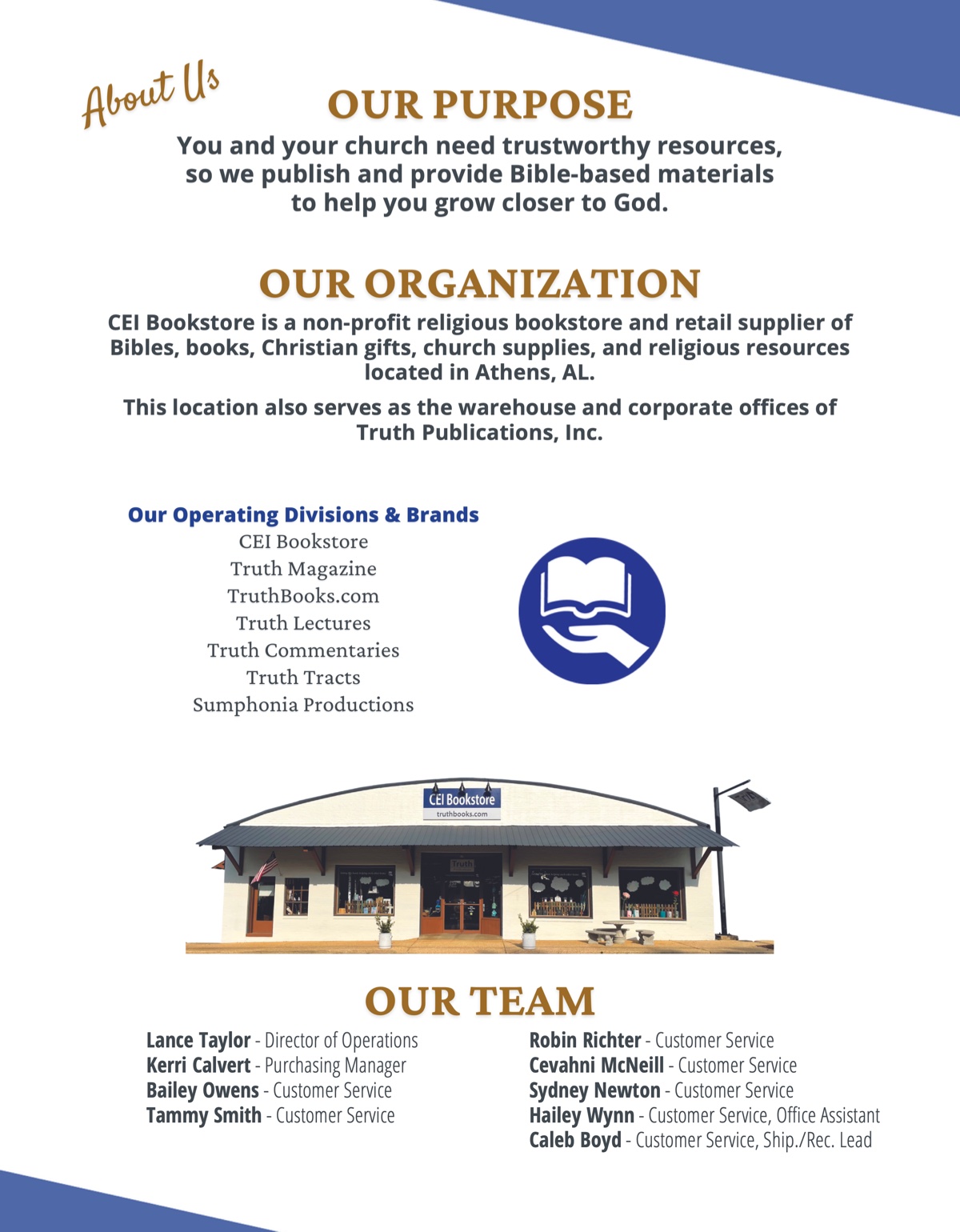
By Steve Wolfgang
Synopsis: Various controversies arising in the Lord’s church often reflect what is happening in the wider religious world, particularly among “Evangelicalism” which in some ways appears to have similarities with the Christianity revealed in the New Testament. Indeed, frequently such controversies are introduced to those who want to be New Testament Christians by preachers and others who have imported ideologies (not always discerningly) from such denominational sources.
In the late twentieth century, a significant controversy arose among Evangelicals, particularly among those advocating various strains of Calvinist theologies (or, what I and others have called “semi-Calvinists” or “soft” Calvinists, given the many variations of Calvinian theologies) regarding what came to be known as “Free Grace theology.” Other avowed Calvinists who took issue were labelled “legalists” for teaching what was called “Lordship salvation.”
Several of the “Free Grace” advocates (perhaps the best known of which were Zane Hodges, John Walvoord, and Charles Ryrie, of the very popular Ryrie Study Bible) were dispensational premillennialists associated with Dallas Theological Seminary. Opposing them were other confirmed Calvinists such as John MacArthur (also with his own MacArthur Study Bible, and others from his Master’s Seminary), and others extending from R.C. Sproul (Ligonier Ministries) to several who formed the Gospel Coalition (including Tim Keller, John Piper, and D.A. Carson) to celebrated British/Anglican evangelical types such as John Stott and James Packer. Other well-known evangelicals from Norman Geisler (professor at DTS) to Francis Chan (a graduate of MacArthur’s “Master’s Seminary”) aligned at various points on the spectrum of controversy [Note 2].
This is not to say that all of those named agree with each other exactly on every point of Calvinistic teaching, or even what to call “Free Grace” or “Lordship Salvation” ideologies (also characterized sometimes as whether Jesus is “Savior” or “Sovereign”). Sometimes it is necessary, in order to be clear, to name names and identify the teachers of various doctrines. Such teaching does not arise “out of a cloud,” nor is it taught by some nebulous, disembodied substance; rather, it is done by specific individuals who are given refuge and “authority” by various churches, educational institutions, and parachurch agencies.
Nor is naming names or identifying such teachers malicious, but rather informational and explanatory. Those who teach and advocate various doctrines do so very publicly, trying to win converts to their doctrinal viewpoints. They are not hiding or avoiding publicity and seem to relish or at least appreciate the exposure such controversies bring to their advocacy. It is also true that often many others, equally committed, work less publicly behind the scenes or “under the radar.” Sometimes it is easier to see these realities when it is not happening “among us” or close to “home.”
The Lordship controversy involved differing views of salvation (or soteriology). Is it necessary to accept Christ as Lord in all aspects of life and behavior in order to have Him as one’s Savior? Put another way: If someone accepts Christ as Savior without also explicitly accepting Him as Lord, is such a person truly saved? Those who argued what they called of “free grace” were accused by other Calvinists of “hyper-grace” and “easy believe-ism” that reduces faith to mere intellectual assent, sometimes arguing that faith itself is a gift of God, for which the believer has no responsibility and thus plays no part.
Opponents who argued that true faith involves accepting the gift of God’s grace and behaving accordingly in submission to Christ’s Lordship demands were labelled “legalists” who preached a false gospel or “works righteousness,” accused of putting salvation in man’s hands rather than God’s for asking if one can be in a state of salvation and lack entirely the fruit of repentance from sin and obedience to Christ?
In many ways, the “Lordship” controversy was a recapitulation of similar discussions between, for example, Lewis Sperry Chafer (founder of Dallas Theological Seminary) and B.B. Warfield of Princeton Theological Seminary, or of the “Higher Life”/Keswick theologies of the late-nineteenth century [Note 3]. Indeed, one can find repeated controversies regarding the biblical role of grace, faith and works among various Calvinists and Arminians all the way back to the Reformation.
Of course, as with all of Satan’s errors, not everything taught by those in such controversies is false. After all, it would be difficult to be wrong all the time and false at every turn. One can find the devotional literature of the Puritans, or the writings of “Higher Life” advocates [Note 4] to be challenging and enlightening—but in the hands and minds of someone who does not understand that these “good ideas” come encased in tightly-wound and logically-related, consistent systems, they can become spiritually dangerous and deadly.
Such controversies often spill over into the Lord’s church through preachers, elders, and others who are exposed to such teaching, and read without proper discernment, and sometimes become enamored of these various dogmas. Today’s religious culture is saturated with such podcasts, “study” Bibles containing extensive notes promoting these dogmas, college and seminary courses or conferences organized by the promoters of such doctrines, as well as by the books (digital or print) which explicate these notions in detail.
Thus, as attractive and edifying as I may find some Reformed, Puritan, Arminian, and Evangelical authors (and, lately, podcasters) to be on occasion, I confess to being concerned as I read and hear more among present-day “Churches of Christ” which sounds increasingly like the continuing controversies described above. The language and ideology of Evangelical versions of Calvinism, including “once-saved-always-saved” terminology, is used even by those who deny being affected by the dogma. Early Stone-Campbell authors are quoted (often from secondary sources by those who don’t seem to have actually read what they quote) and speciously accused of “legalism.” In truth, most of those in the early Stone-Campbell “movement,” whatever someone might think of them today, were raised in the various Reformed denominations they eventually left, and critiqued, for their unbiblical theology [Note 5].
In some ways, the problem may be trying to “systematize” biblical teaching even when Scripture itself does not [Note 6]. Sometimes this is done even by those who claim that they are simply following the Bible while proclaiming a “system of grace” and accusing any who dare disagree of “legalism” or “Pharisaism” (whether the accusers actually understand, or not, what Pharisees taught in reality). Allegations appear that “there is no preaching on grace” (usually meaning that the critic’s particular interpretations of grace are not expressed) [Note 7]. Sometimes new terms like “Galatianism” are invented (or borrowed from denominational sources) to prejudice Christians against any who oppose a system promoted (accurately or not) as “free grace.” Such coded buzz-words can rightfully set off alarm bells and attract the attention of those who understand where such thinking consistently leads—just as it should concern those who claim to be shepherding the flock among them.
Some in the present day have re-discovered the writings of informed brethren like Robert Turner from a half-century ago. Yet, while proclaiming to “love that man” by selectively quoting him, some who do so are promoting the very works of men (like K.C. Moser and others advocating Reformed imputation dogmas) that brother Turner was refuting. Wisdom counsels that we heed our brother who, though dead, yet speaks, as he recalls “men who were captured by the ‘system’ (usually Calvinistic), without realizing how extensively the acceptance of a few basic errors would affect the remainder of their studies. . . today [1976, and 2024-SW] preachers draw conclusions on Adamic sin, grace, work of the Holy Spirit, etc., with no apparent conception of where logical progression of these ideas will take them.” While not suggesting “censorship,” brother Turner cautioned, “but someone needs to warn our non-theological brethren that they are nibbling at and swallowing something that has a hook” [Note 8].
Furthermore, brother Turner observed that some who have “imbibed erroneous concepts” and “allowed their conclusions to be falsely colored” have sometimes, “in a commendable desire to counter legalistic abuses in our thinking, may have developed abused concepts of grace and faith.” Acknowledging that not all advocates of some Reformed doctrines “have so accepted the logical consequences of their error that they should be firmly labelled ‘Calvinists.’ All of this does mean we should endeavor to better understand theological systems and their effect upon our generation. This is especially true of Calvinism, and of the neo-Calvinism of our day” [Note 9].
Those who advocate neo-, semi- or “soft” Calvinism, while not perhaps progressing fully into various stages or flavors of Reformed theologies, are becoming ever more vocal and open in their efforts—actively trying to win hearts, minds, and converts to their positions. No one should be amazed when concerned disciples feel the necessity of responding equally as publicly.
Ultimately, a balanced biblical view recognizes that Jesus is both Sovereign and Savior. In our own lives, “If He is not Lord of all, He is not Lord at all.” King Jesus reigns over all and is the Savior who offers redemption to humanity based upon His terms set forth in the gospel. Embracing both aspects of His identity allows New Testament saints to fully appreciate the depth of His love, grace, and authority. It also encourages a life, by grace, of faithful obedience and gratitude for the salvation He provides.
[Note 1] For a more detailed discussion of Calvinism and Reformed theologies as it has related to various “Restorationists,” see Steve Wolfgang, “John Calvin: His Life and Influence,” from the 2016 Exploring Current Issues Conference: Link.
[Note 2] For example, see Zane Hodges, The Gospel Under Siege (1981) and Absolutely Free! (1989), and John MacArthur, The Gospel According to Jesus (1988, 1994), and The Gospel According to the Apostles (1993, 2000). MacArthur provides a brief summary of the controversy here.
[Note 3] An informative source of the background of the controversy, and the “naming of names” and identification of opponents and their teaching, is Michael S. Horton, ed., Christ the Lord: The Reformation and Lordship Salvation, (Eugene, OR: Wipf & Stock, 2008), consisting of essays exploring various dimensions of the controversy, including a review of Chafer’s work by Warfield, also available here.
[Note 4] Perhaps the best-known representative here is long-time Chicago preacher, A. W. Tozer, of the Christian and Missionary Alliance, which arose in some ways from Keswick influences. Tozer’s essays on personal holiness have proved stimulating to many, including myself—despite rejecting some aspects of his theology. See also John R.W. Stott, John Stott at Keswick: A Lifetime of Preaching (Authentic Media/LOGOS Edition, 2008).
[Note 5] For a more extensive discussion of how Reformed and Restorationist thinkers have related to issues of grace, faith, works, assurance, imputation, and specific central texts such as Romans 5, see Steve Wolfgang, “Saved By His Life: The Assurance of Our Hope,” in Of First Importance: He Was Raised and Appeared—Studies in the Resurrection (Florida College Annual Lectureship, 2013), pp. 205-258.
[Note 6] For an informed and stimulating discussion of such systemization, see Jeff Wilson, “Should We Systematize Biblical Teaching?” in Inquire of Past Generations: Lessons From Church History (Florida College Annual Lectureship, 2018), pp. 175-186.
[Note 7] See the special issue of Truth Magazine on Grace which I edited in May 2014, which is available here.
[Note 8] “Theology and the Gospel Preacher,” Vanguard 2:5 (September 9, 1976), pp. 1, 15.
[Note 9] “Theological Coloring Book,” Vanguard 2:6 (September 24, 1976), p. 1 (121).
Steve Wolfgang has worked with the church in Downers Grove (located in suburban Chicago) since 2008. He and his wife, Bette, have two adult children and three grandchildren. The church website is here. He can be reached here.



Note: Please send additions, corrections and updates here.
Updated: 10/1/2024
17312 Jones Rd, Athens, AL 35613
Sun. Bible Study 9:30 am | Sun. Worship: 10:20 am & 5:00 pm | Wed. Bible Study 7:00 pm
Evangelist: Jonathan Reeder | Website | 256-233-3160
24190 Wooley Springs Rd, Athens, AL 35613
Sun. Worship 9:30 am & 5:15 pm | Wed. Bible Class 7:00 pm
Evangelists: Bob Watson & Matt Taylor | Website
3955 Pine Lane, Bessemer, AL 35022
Sun. Bible Study 9:10 am | Sun. Worship 10:00 am & 5:00 pm | Wed. Bible Class 7:00 pm
Evangelist: David Deason | 256-497-8127 205-425-2352 | Email | Website
2325 Old Columbiana Rd. (near I-65 & Hwy. 31)
Sun. Bible Study 9:00 am | Worship 10:00 am & 5:00 pm | Wed. Bible Study 7:00 pm
Evangelist: Kyle Pope | 205-822-0018 | Website
19965 Sandlin Rd. Elkmont, AL 35620
Sun. Worship 9:30 am & 3:00 pm | Bible Classes: 10:45 am | Wed. Bible Study 7:00 pm
Evangelist: Lance R. Taylor | 256-777-0990 | Website
851 N. Pine St. (Located next to University campus)
Sun. Bible Study 9:30 am | Worship 10:15 am & 5:00 pm | Wed. Bible Study 7:00 pm
Evangelist: Kenny Moorer | 256-766-0403
601 Pineywood Road, Gardendale, AL, 35071 (Located 10 miles N of Birmingham)
Sun. Bible Study 9:30 am | Worship: 10:25 am & 5:00 pm | Wed. Bible Study: 7:00 pm
Evangelists: Andrew Smith & Jason Shackleford | 205-631-2131 | Website
129 Hillcrest Rd, Mobile, AL 36608
Sun. Worship 9-9:30 am | Bible Study 9:30-10:30 am | Worship 10:30-11:30 am | Wed. Bible Study 7:00 pm
Evangelist: Ken Sils | 765-307-8048 | 251-342-4144 or 342-2041 | Website
271 Highway 65 N, Conway, AR 72032
Sun. Bible Study 9:00 am | Worship 10:00 am & 5:00 pm | Wed. Bible Study 7:00 pm
Evangelist: Bruce Reeves | Bldg: 501-336-0052 | Website
2655 Prince St., Conway, AR 72034
Sun. Worship 9:00 pm | Bible class 9:50 am | Worship & Lord’s Supper: 10:40 am | Wed. Bible Class 7:00 pm
501-450-8640
2323 South 46th St.
Sun. Bible Study 9:45 am | Worship 10:30 am | Wed. Bible Study 7:00 pm
407 Bella Vista Dr.
Sun. Bible Study 9:30 am | Worship 10:15 am & 5:00 pm | Wed. Bible Study 7:00 pm
Evangelist: Norman E. Sewell | 870-741-9104 or 870-741-5151 | Website
514 Airport Rd.
Sun. Bible Study 10:00 am | Worship 11:00 pm & 6:00 pm | Wed. Bible Study 7:00 pm
Evangelist: Dick Blackford | 870-933-9134
145 N. Country Club Rd.
Sun. Bible Study 9:00 am | Worship 10:00 am & 6:00 pm | Wed. Bible Study 7:00 pm
Evangelist: Brenden Ashby | 520-326-3634 | Website
17903 Ibbetson Ave.
Sun. Bible Study 9:45 am | Worship 10:50 am & 6:00 pm | Wed. Bible Study 7:30 pm
562-866-5615 | Website
3433 Studebaker Rd.
Sun. Bible Study 9:50 am | Worship 10:45 am & 5:30 pm | Wed. Bible Study 7:00 pm
JP Flores | 562-420-2363 or Mark Reeves | 562-377-1674 | Website
449 W. Allen Ave., Suite 120, San Dimas, CA 91773
Sun. Bible study 10:00 am | Worship 11:00 pm & 4:00 pm | Wed. Bible Study 7:30 pm
909-788-9978 | Website
Meets at the Fort Collins Senior Center, 1200 Raintree Dr., Fort Collins, CO 80526
Sun. Bible Study 9:30 am | Worship 10:30 am
Evangelist: Richie Thetford | Website
1414 Hawk Parkway, Unit C
Sun. Worship 11:00 pm | Bible Study 2 pm & 1:30 pm
970-249-8116 |
64 Casting Lake Rd.
Sun. Bible Study 9:00 am | Worship 10:00 am & 6:00 pm | Wed. Bible Study 7:00 pm
850-622-3817 | Website | Location change coming in 2022: 497 Church St Santa Rosa Beach, FL 32459
196 Ave C, Geneva, FL 32732
Sun. Bible Study 10:00 am | Worship 10:45 am
(689) 229-9888 | Website
6 Lane Dr., Mary Esther, FL 32569
Sun. Bible Study 9:30 am | Worship 10:30 am & 5:00 pm | Wed. Bible Study 7:00 pm
850-244-9222 | Website | Evangelist: Chris Simmons | Email
3940 S. Bumby Ave.
Sun. Communion: 9:30 am | Bible Study 10:00 am | Praise & Preaching: 10:55 am (No pm Service) | Wed 7:00 pm
Evangelist: Ken Chapman
Office: 407-851-8031 | Website | Note: Please call for current worship and Bible study times.
621 E. Wheeler Rd.
Sun. Bible Study 10:00 am | Worship 10:50 am & 6:00 pm | Wed. Bible Study 7:30 pm
Evangelist: Bobby Witherington | 813-684-1297 | Website
Route 116 (near Callaway Gardens)
Sun. Bible Study 10:00 am | Worship 11:00 pm & 6:00 pm | Wed. Bible Study 7:30 pm
Evangelist: Tommy W. Thomas | 706-628-5117 or 628-5229 |
370 N. Shilling | P.O. Box 158-83221
Sun. Bible Study 10:00 am | Worship 11:00 pm | Wed. Bible Study 7:30 pm
208-785-6168 or 681-1552
1310 NE 54th Ave, Des Moines, IA 50313
Sun. Bible Study 9:45 am | Worship 10:40 am | Wed. Bible Study 7:00 pm
515-262-6799 | Website
1236 63rd St. (Dir: 1.5 miles E of I355)
Sun. Bible Study 9:00 am | Worship 9:55 am & 6:00 pm | Wed. Bible Study 7:30 pm
Evangelist: Steve Wolfgang | 630-968-0760 | Website
1100 S. 17th St.
Sun. Bible Study 9:30 am | Worship 10:30 am & 6:00 pm | Wed. Bible Study 7:00 pm
217-234-3702
16224 S Vincennes Ave.
Sun. Bible Study 9:00 am | Worship 10:00 am & 4 pm | Wed. Bible Study 7:00 pm
Evangelist: Donald Hawkins | 708-339-1008 | Website
Meeting @ Sleep Inn Suites and Motel | 1101 North Cummings Lane, Washington, IL 61571
Sun. Worship: 11:30 am | Bible Study: 12:30 pm | Wed. Bible Study 6:30 pm @ home of Tim Sundlie, call for address
Evangelist: Tim Sundlie | 608-796-9028 | Email | Website
407 W Lewis and Clark Parkway, Clarksville, IN 47129
Sun. Bible Study 9:30 am | Worship 10:30 am & 6:00 pm | Wed. Bible Study 7:30 pm
Elders: Allen L. Morris (812) 989-5838 and Stephen W. Nale (502) 727-7559 or (812) 944-2305 | Website
Sun. Bible Study 9:30 am | Worship 10:30 am | Wed. 7:00 pm
765-676-6404 | Website
15530 Herriman Blvd, 46060
Sun. Bible Study 10:00 am | Worship 11:00 am | Wed. Bible Study 7:00 pm
Evangelist: John Smith | Email | 317-501-8035 or 317-501-0249 or 317-701-1204
400 Lafayette Ave. | P.O. Box 34
Sun. Bible Study 9:45 am | Worship 10:30 am & 6:00 pm | Wed. 7:00 pm
812-279-4332
(First St. & Karnes Ct.)
Sun. Bible Study 9:45 am | Worship 10:30 am & 5:00 pm | Wed. Bible Study 7:00 pm
Evangelist: Jeremy Goen | 812-967-3437 or 967-3520 | Website
302 S. Fourth Ave., Mulvane KS 67110 | Mail: PO Box 11
Sun. Bible Classes: 10:00 am | Worship 11:00 am | Wed. Bible Study 7:00 pm
Evangelist: Jay Horsley | 316-644-8503 | Website | Email
5600 SW 17th St, Topeka, KS 66604
Sun. Bible Study 9:15 am | Sun. Worship 10:30 am | Wed. Bible Study 7:00 pm
785-235-8687 or 785-273-7977 | Website
1235 Williams St.
Sun. Worship 10:00 am | Bible Study After am Worship & 6:00 pm | Wed. Bible Study 7:00 pm
Evangelist: Jerid Gunter | 270-274-4451
8081 US Hwy 68-East, Benton, KY 42025
Sun. Bible Study 9:00 am | Worship 10:00 am | Wed. Bible Study 6:00 pm
270-354-9451 | Email | Website | Conveniently located near Kenlake State Resort Park on the western shore of Kentucky Lake.
612 Broadway
Sun. Bible Study 9:45 am | Worship 10:30 am & 5:00 pm | Wed. Bible Study 6:30 pm
Evangelist: Charles J. White | 270-422-3878
107 Sunny Hill Dr.
Worship 9:30 am & 11:30 am | Bible Study 10:30 am | Wed. Bible Study 7:00 pm
Evangelist: Steve Lee | 270-789-1651 | Website
103 N. Main St. | P.O. Box 233
Sun. Bible Study 10:00 am | Worship 10:45 am & 5:00 pm | Wed. Bible Study 7:00 pm
Evangelist: Jarrod Jacobs | 270-589-4167 or 270-274-3065
385 E. Lexington Ave.
Sun. Worship 10:00 am | Bible Study 11:15 am & 5:00 pm | Wed. Bible Study 7:00 pm
Evangelist: B.J. Sipe | 859-236-4204
18 Scott Drive, Florence, KY 41042
Sun. Worship 9:30 am & 5:30 pm | Sun. Bible Study 10:30 am | Wed. Bible Study 7:00 pm
859-371-2095 | Website
1733 Bowling Green Rd.
Sun. Bible Study 9:00 am | Worship 10:00 am & 6:00 pm | Wed. Bible Study 7:00 pm
Evangelist: Steve Monts | 270-776-9393 | Website
733 Mill St. Leitchfield, KY 42754
Sun. Bible Study 9:30 am | Worship 10:00 am Communion 10:55 am | Wed. Bible Study 6:00 pm
270-230-6144 | Website
1803 Dixie Garden Dr.
Sun. Bible Study 9:30 am | Worship 10:30 am & 6:00 pm | Wed. Bible Study 7:00 pm
Evangelist: Michael Hardin | Email | 502-937 2822
3221 East Hebron Lane
Sun. Bible Study 9:00 am | Worship 10:00 am & 5 pm | Wed. Bible Study 7:30 pm
Evangelist: Danny Linden & Ron Halbrook | 502-957-5115 or 502-955-1748 | Website
405 Orice Roth Rd. | 70737 (Baton Rouge area)
Sun. Bible Class 9:30 am | Worship 10:30 am & 6:00 pm | Wed. Bible Study 7:00 pm
Evangelist: R.J. Evans | Email | 225-622-4587
856 Brighton Ave. (Breakwater School) | Leave Maine Turnpike at Exit 48
Sun. Bible Study 10:00 am | Worship 11:00 pm w/ second service immediately following am worship | Mid-week Bible Study (please call for times & places)
207-839-3075 or 839-8409
3084 Creek Drive SE, #1-C, Kentwood, MI 49512 | P.O. Box 8446, Kentwood, Mich. 49508 (Grand Rapids area)
Sun. Worship 11:00 am | Sun. Bible Study 12:30 pm | Wed. Bible Study 7:00 pm
Evangelist: Joseph Gladwell | Email
414 South Main Street
Sun. Bible Study 10:00 am | Worship 11:00 am | Wed. Bible Study 6:00 pm
Evangelist: Ryan Thomas | 810-837-1302 or 989-389-3226 | Website
2820 Grandview Ave, Meridian, MS 39305
Sun. Bible Study 10:00 am | Sun. Worship 11:00 pm | Wed. 6:30 pm
Ron Cooper: 601-934-3675 | Email
Ricky Ethridge: 601-737-5778 | Email
2110 E State Line Rd. (Exit I-55) (Memphis area)
Sun. Bible Study 9:30 am | Worship 10:30 am | Wed. Bible Study 7:00 pm
Evangelist: James A. Brown | Bldg: 662-342-1132
805 Meadow Rd, Severn, MD 21144
Sun. Bible Study 10:00 am | Sun. Worship 11:00 pm & 6:00 pm | Wed. Bible Study 7:30 pm
Evangelist: Brandon Trout | 410-969-1420 or 410-551-6549 | Website
422 N Linton St., Blodgett, MO 63824
Sun. Worship 10:00 am | Wed. Bible Study 7:00 pm
Evangelist: Russell Rice | 573-475-0417
4000 SW Christiansen
Sun. Worship 9:00 pm | Bible Study 10:00 am | Worship 11:00 pm | Wed. Bible Study 7:00 pm
Evangelist: Brett Hogland | 816-228-9262
432 Eagle Rock Rd, Branson, MO 65616
Sun. Worship 9:30 am | Bible Study 10:30 am | Sun. Evening Worship 5:00 pm | Wed. Bible Study 6:00 pm
Evangelist: Philip North | 417-239-1036 | Email | Website
2912 Bloomfield Rd
Sun. Bible Study 9:15 am | Worship 10:00 am | Wed. Bible Study 7:00 pm
Seth McDonald & Jerry Lee Westbrook | 573-837-1001 | Email | Website
703 Harrison St.
Sun. Bible Study 10:00 am | Worship 11:00 pm & 6:00 pm | Wed. Bible Study 7:00 pm
Evangelist: Nolan Glover | 870-650-1648 | Website
685 Sidney St.
Sun. Bible Study 9:30 am | Worship 10:15 am & 5:00 pm | Wed. Bible Study 7:00 pm
Evangelist: Lynn Huggins | 573-265-8628
2727 County Line Rd.
Sun. Bible Study 9:00 am | Worship 9:50 am | Wed. Bible Study 7:00 pm
816-279-4737 | Website
Bell St & S 7th St. Beatrice, NE 68310
Sun. Bible Study 9:00 am | Worship 10:00 am & 6:30 pm
402-233-4102 or 402-228-3827 | Website
5327 S. Tryon Street, Charlotte, NC 28217
Sun. Bible Study 9:30 am | Sun. Worship 10:30 am | Wed. Bible Study 7:30 pm
704-525-5655 | Website
3781 East Highway 27, Iron Station, NC 28080
Sun. Bible Study: 10:00 am | Sun. Worship 11:00 am & 6:00 pm | Wed. Bible Study 7:00 pm
Evangelist: Stan Adams | 704-748-9777 (Bldg) & 704-748-3747 (Jerry) | Email | Website
1031 Welford Dr, Beavercreek, OH 45434 (located a few miles E of Dayton)
Sun. Short Worship: 9:30 am | Bible Study 10:05 am | Sun. Worship 11:00 am | Wed. Bible Study Adults: 1:00 pm & All ages: 7:00 pm
Evangelist: Heath Rogers | 937-426-1422 | Website
13501 Lorain Ave, Cleveland, OH 44111
Sun. Bible Study 10:00 am | Worship 11:00 am | Wed. Bible Study 7:00 pm (Call)
Evangelist: John Dicus | (330) 723-0111 or (330) 590-0227 or (216) 322-9392 | Website
28 W. Main St., Dayton, OH 45449
Sun. Worship 9:00 pm | Bible Study 9:30 am | Worship 10:25 am | Wed. Bible Study 7:00 pm
Evangelists: Michael Grushon 937-866-5162 or Alan Beck 937-469-3311 | Website
6417 Franklin-Lebanon Rd. Franklin, OH 45005
Sun. Bible Study 10:00 am | Worship 10:45 am | Tues. Bible Study 6:30 pm
Evangelist: Josh Lee | 937-789-8055 or 937-746-1249 | Website
1973 W Main St. New Lebanon, OH 45345
Sun. Bible Study 9:30 am | Worship 10:30 am, & 5:00 pm | Wed. Bible Study 7:00 pm
Evangelist: Bruce Hastings | 937-687-7150 or 937-478-0367
80 Sandhill Rd. Reno, OH 45773
Sun. Bible Study 9:30 am | Worship 10:30 am & 6:30 pm | Wed. Bible Study 7:00 pm
Evangelist: Mark Childers | 304-615-1091 | 740-374-9827 | Website
4110 Frey Rd., Northwood, OH 43619 (Toledo Area)
Sun. Worship 11:00 pm
Evangelist: Donald Jarabek | 419-893-3566 & 567-331-2269
33226 Children’s Home Rd., Pomeroy, OH 45769
Sun Worship 10:00 am & 5 pm | Bible Study 11:00 am | Wed. Bible Study 6:00 pm
Jack Hunt | Email | 740-645-4612 | Website
2120 No. A St.
Sun. Bible Study 9:45 am | Worship 10:45 am & 5:30 pm | Wed. Bible Study 7:00 pm
Evangelist: Rob Lungstrum | 918-931-1362 or 918-423-3445
4110 NE 122nd Ave #101, Portland, OR 97230
Sun. Bible Study 10:00 am | Worship 11:00 am | Thur. Bible Study 7:00 pm
Evangelist: Samuel A. Matthews | 971-331-2838 | Bldg: 503-432-8697 | Email | Website
3702 E. Long St.
Sun. Bible Study 9:30 am | Worship 10:30 pm & 5:30 pm | Wed. Bible Study 7:30 pm
Bldg: 541-367-1599 | Email | Website
7222 Germantown Ave, Philadelphia, PA 19119
Sun. Bible Study 10:15 am | Sun. Worship: 11:15 am | Tues. Bible Study: 7:00 pm
Evangelist: James H. Baker, Jr. | 215-248-2026 | Website
3370 Broad St. Extension
Sun. Bible Study 9:30 am | Worship 10:30 am & 5:30 pm | Wed. Bible Study 7:00 pm
Evangelist: A.A. Granke, Jr. | 803-499-6023
4013 Edmund Hwy. (Hwy. 302), West Columbia, SC 29170
Sun. Bible Study 9:30 am | Sun. Worship 10:30 am & 5:00 pm | Wed. Bible Study 7:00 pm
Evangelist: Jerry Cleek | 219-313-1108 | Website
326 Powell Road, Collierville, TN 38017
Sun. Bible Study 9:00 am | Worship 10:00 am | Wed. Bible Study 7:00 pm
Evangelist: Doug Seaton | 901-854-6816 or 901-634-7840
417 Mooresville Pike | (Located .8 mi. N. of Hwy. 50/Jas. Campbell)
Sun. Bible Study 9:30 am | Worship 10:30 am & 3:30 pm | Wed. Bible Study 7:00 pm
931-388-5828 or 931-381-7898 | Website
4894 Hooper Hwy. | 37722 | (Located 15 mi. E. of Gatlinburg on Hwy. 321)
Sun. Bible Study 10am | Worship 11:00 pm & 5:00 pm | Wed. Bible Study 6:00 pm
Evangelist: Olie Williamson | 423-487-5540 or 423-748-0844
350 N Main St. Kingston Springs, TN 37082
Sun. Bible Study 9:00 am | Worship 10:00 am & 5:00 pm | Wed. Bible Study 7:00 pm
108 Locust St.
Sun. Bible Study 9:30 am | Worship 10:30 am & 5:00 pm | Wed. Bible Study 7:00 pm
Evangelist: Daniel H. King, Sr. | 931-379-3704 or 931-964-3924 | Website
1110 Cason Lane
Sun. Bible Study 9:00 am | Worship 10:00 am & 5:00 pm | Wed. Bible Study 7:00 pm
Bldg: 615-896-0090 | Website
2091 Pitts Ln, Murfreesboro, TN 37130 (located at the corner of Northfield Blvd and Pitts Lane)
Sun. Bible Study 9:30 am | Sun. Worship 10:30 am & 6:00 pm | Wed. Bible Study 7:00 pm
Evangelist: David Bunting | 615-893-1200 | Website
7471 Charlotte Pike
Sun. Bible Study 9:00 am | Worship 10:00 am & 5:00 pm | Wed. Bible Study 7:00 pm
Evangelist: Lee Wildman | 615-952-5458 or 615-356-7318
423 Donelson Pike
Sun. Bible Study 9:00 am | Worship 9:55 am & 5:00 pm | Wed. Bible Study 7:00 pm
Evangelist: Johnny Felker | 615-883-3118 | Website
1414 W. Exchange Pkwy
Sun. Bible Study 9:00 am | Worship 10:00 am & 5:00 pm | Wed. Bible Study 7:00 pm
Evangelist: Jerry King 214-504-0443 or 972-727-5355 | Website
E. Service Rd. off I-35, N. of Alvarado
Sun. Bible Study 10:00 am | Worship 11:00 pm & 6:00 pm | Wed. Bible Study 7:00 pm
817-295-7277 or 790-7253
605 E. Adoue St., Alvin, TX 77511
Sun. Bible Study 9:30 am | Worship 10:30 am & 5:00 pm | Wed. Bible Study 7:30 pm
Evangelist: Mark Mayberry | Email | Website
701 North Pruett St.
Sun. Bible Study 9:45 am | Worship 10:40 am & 6:30 pm | Wed. Bible Study 7:00 pm
Bldg: 281-422-5926 | Weldon: 713-818-1321 | Website
2919 Main St/FM 517 E., Dickinson, TX 77539
Sun. Bible Study 10:00 am | Sunday Worship 11:00 am & 6:00 pm | Wed. Bible Study 7:00 pm
713-298-6673
301 Robison St.
Sun. Bible Study 9:30 am | Worship 10:30 am & 6:00 pm | Wed. Bible Study 7:00 pm
Evangelist: Phillip Stuckey | 361-782-5506 or 361-782-2844 | Website
3277 Pendleton Rd.
Sun. Bible Study 9:30 am | Worship 10:30 am & 5:00 pm | Wed. Bible Study 7:00 pm
915-855-1524
4303 18th St, Bacliff, TX 77518
Sun. Bible Study 9:00 am | Sun. Worship 10:00 am & 6:00 pm | Wed. Bible Study 7:00 pm
Evangelist: Richard Lay | Website
6110 White Settlement Rd. 76114
Sun. Bible Study 9:30 am | Worship 10:30 am & 6:00 pm | Wed. Bible Study 7:30 pm
817-738-7269
Old Granbury Rd Church of Christ
4313 Old Granbury Rd, Granbury, TX 76049
Sun. Bible Study 9:30 am | Sun. Worship 10:30 am | Wed. Bible Study 7:00 pm
Evangelist: Chip Foster | 817-913-4209 or 817-279-3351 | Website
2510 Fry Rd, Houston, TX 77084
Sun. Bible Study 9:45 am | Worship 10:30 am & 6:00 pm | Wed. Bible Study 7:00 pm
Evangelist: David Flatt | Email | Website
6111 Indiana Ave, Lubbock, TX 79413
Sun. Bible Study 10:00 am | Sun. Worship 9:00 am & 11:00 am | Wed. Bible Study 7:00 pm
806-795-3377 | Website
1820 Mansfield Webb Rd, Mansfield, TX 76063
Sun. Bible Study 9:30 am | Sun. Worship: 10:20 am & 5:00 pm | Wed. Bible Study 5:30 pm.
Evangelist: Tom Roberts | 817-996-3926 | Website
612 S Shawnee St, Nacogdoches, TX 75961
Sun. Bible Study 9:45 am | Worship 10:30 am & 6:00 | Wed. Bible Study 6:00 pm
Minister: Van Dennis | 936-615-2950
3831 N.E. Stallings Dr.
Sun. Bible Study 9:30 am | Worship 10:20 am & 6:00 pm | Wed. Bible Study 7:00 pm
Evangelists: Randy Harshbarger & Jay Taylor
268 Utopia Ave. (Dir: I-37 S.E. Exit Pecan Valley)
Sun. Bible Study 9:30 am | Worship 10:30 am & 5:00 pm | Wed. Bible Study 7:00 pm
Evangelist: Jesse Garcia | 210-660 0409
314 N. Tolbert
Sun. Bible Study 9:30 am | Worship 10:30 am & 5:00 pm | Wed. Bible Study 7:00 pm
Evangelist: Ronald Stringer
4404 Twin City Blvd.
Sun. Bible Study 9:30 am | Worship 10:30 am & 6:00 pm | Wed. Bible Study 7:30 pm
Evangelist: Jason Garcia (Email or (Email | 254-939-0682 | Website
2301 Franklin Dr., Texarkana, AR 71854
Sun. Bible Study 9:30 am | Worship 10:15 am | Wed. Bible Study 7:00 pm
870-772-0746 | Website
340 E Warren St. (in Hewitt, a suburb of Waco)
Sun. Bible Class 9:30 am | Worship 10:30 am & 5:00 pm | Wed. Bible Study 7:00 pm
Evangelist: Marc Smith | 254-292-2482 or 652-7698
4500 Kell West Blvd, Wichita Falls, TX 76309
Sun. Bible Class 9:30 am | Worship 10:30 am & 3:30 pm | Wed. Bible Study 6:30 pm
Evangelist: Dennis L. Scroggins | 512-626- 5702 | Email | Website
Please mail all correspondence to 1504 Hayes St, Wichita Falls, TX 76309
Meeting in the Capital City Grange Hall, 6612 Route 12 Berlin, VT 05602
Sun. Bible Study 9:00 am | Worship 10 am | Tues. Evening in Homes
Evangelist: Open | Website | P.O. Box 70, Williamstown, VT 05679 | For questions or directions: Wade Holt 802-485-4311
217 Taxus St., Chesapeake, VA 23320
Sun. Bible Study 10:00 am | Worship 11:00 am & 5:00 pm | Wed. Bible Study 7:00 pm
Evangelist: Steven Matthews | 757-436-6900 | Website
8330 Doublecreek Court, Chesterfield, VA 23832 (Located in teh Metro Area; Courthouse Rd. at Double Creek Ct. 2.2 miles S of Rt. 288)
Sun. Bible Study 9:30 am | Worship 10:30 am & 5:00 pm | Wed. Bible Study 7:00 pm
Evangalist: Nathan L. Morrison | 804-778-4717 | Website
1208 W. 41st St.
Sun. Bible Study 10:00 am | Worship 11:00 pm & 6:00 pm | Wed. Bible Study 7:00 pm
Evangelist: Jack Bise, Jr.
2970 Old Leaksville Rd.
Sun. Bible Study 10:00 am | Worship 11:00 pm & 5:30 pm | Wed. Bible Study 7:00 pm
276-956-6049 | Website
929 Indiana Ave. NE (5 min. from Roanoke Convention Center)
Sun. 1st Lesson 9:15 am | Bible Study 10:00 am | Worship 11:00 pm | Wed. Bible Study 7:30 pm
Evangelist: Brent Paschall | 540-344-2755 | Website
5652 Haden Rd.
Sun. Bible Study 10:00 am | Worship 11:00 am
Robert Mallard | 757-464-4574
1860 Mt Baker Hwy, Bellingham, WA 98226,
Sun. Bible Study 9:30 am | Worship 10:30 am & 6:00 pm | Wed. Bible Study 7:00 pm
Evangelist: Steven J. Wallace | 360-752-2692 or 806-787-5088 | Website & Website
Meeting at Gray Middle School, 6229 S. Tyler St., Tacoma, WA 98409
Note: Please see webpage for updated meeting location and times.
Sun. Bible Study 10:00 am | Worship 11:00 pm | Wed. Bible Study 7:00 pm (Online)
253-242-3098 | Email | Website
7 Old Davisson Run Rd, Clarksburg, WV 26301
Sun. Bible Study 9:30 am | Worship 10:20 am
304-622-5433 | Website | Email
1929 Morgantown Ave.
Sun. Bible Study 10:00 am | Worship 10:45 am & 6:00 pm | Wed. Bible Study 7:00 pm
304-363-8696 or 304-844-2437
210 Cedar Ave, Moundsville, WV 26041
Sun. Bible Study 9:30 am | Sun. Worship 10:30 am & 6:00 pm | Wed. Bible Study 7:00 pm
Evangelist: Tony Huntsman | 304-845-4940 | Website

